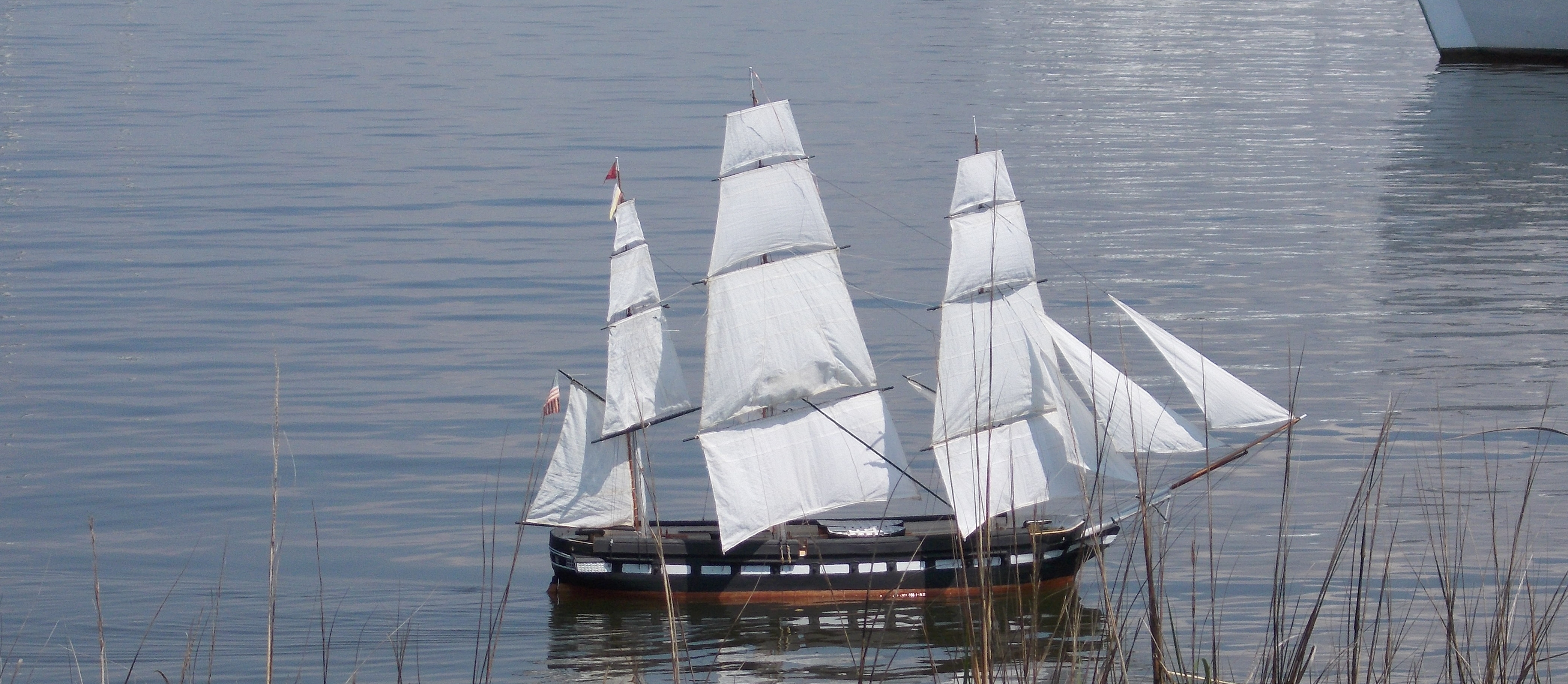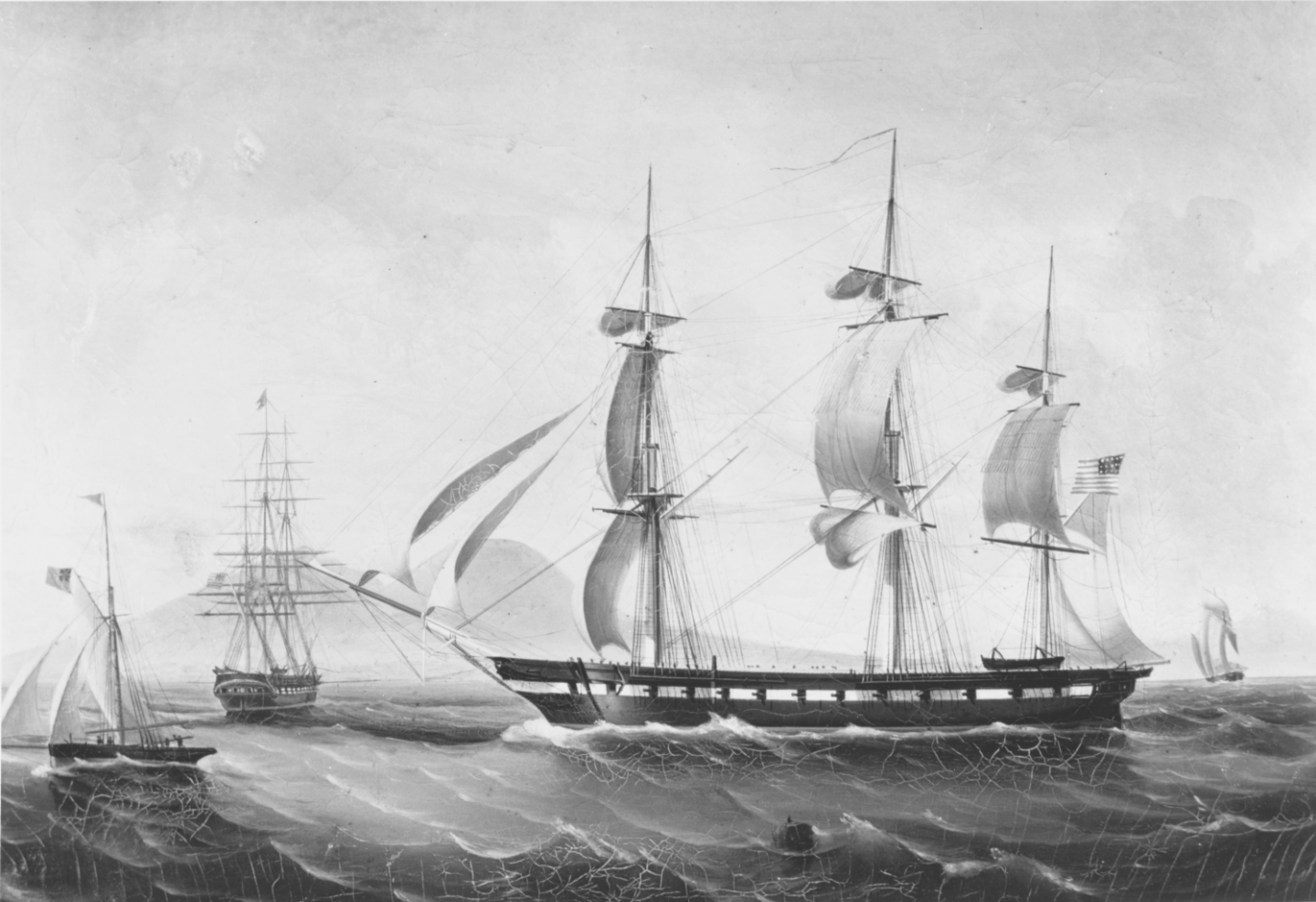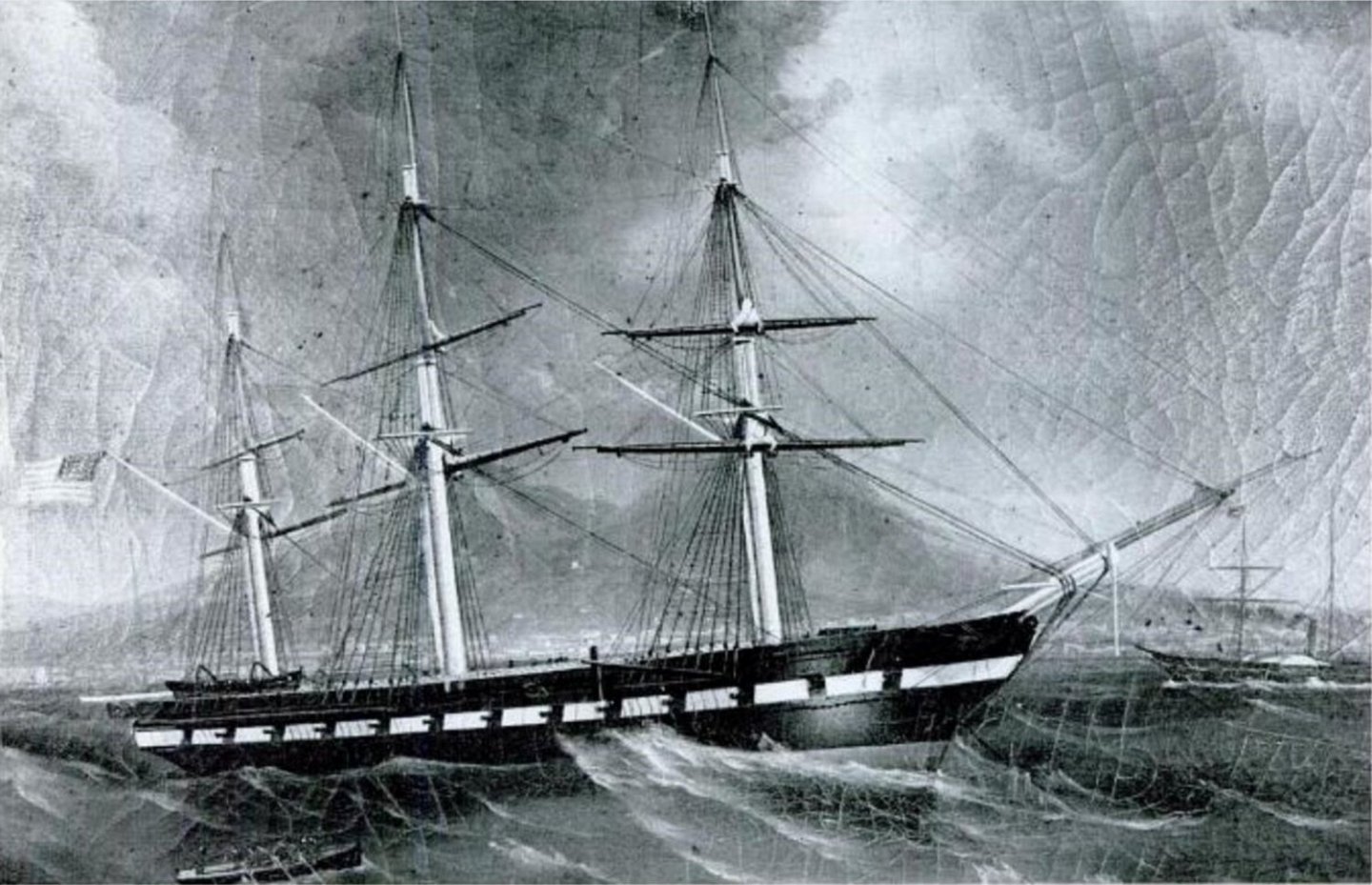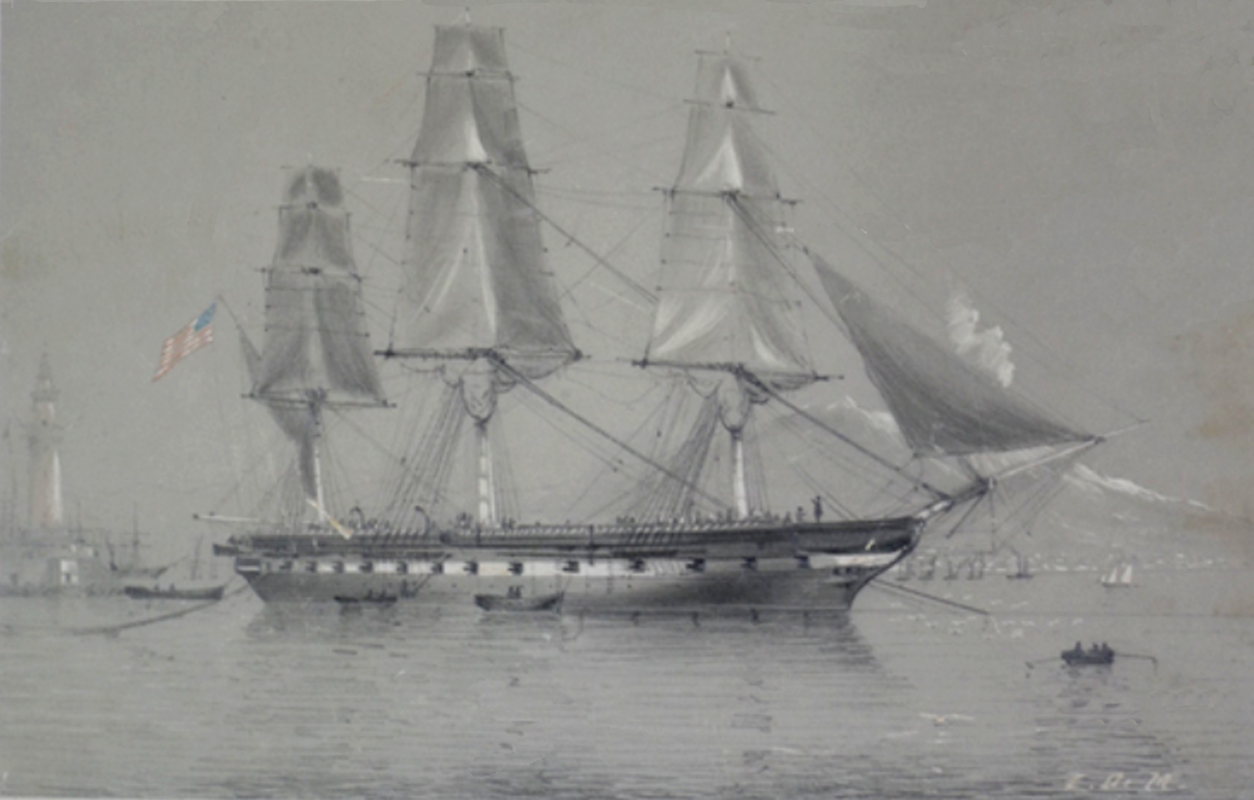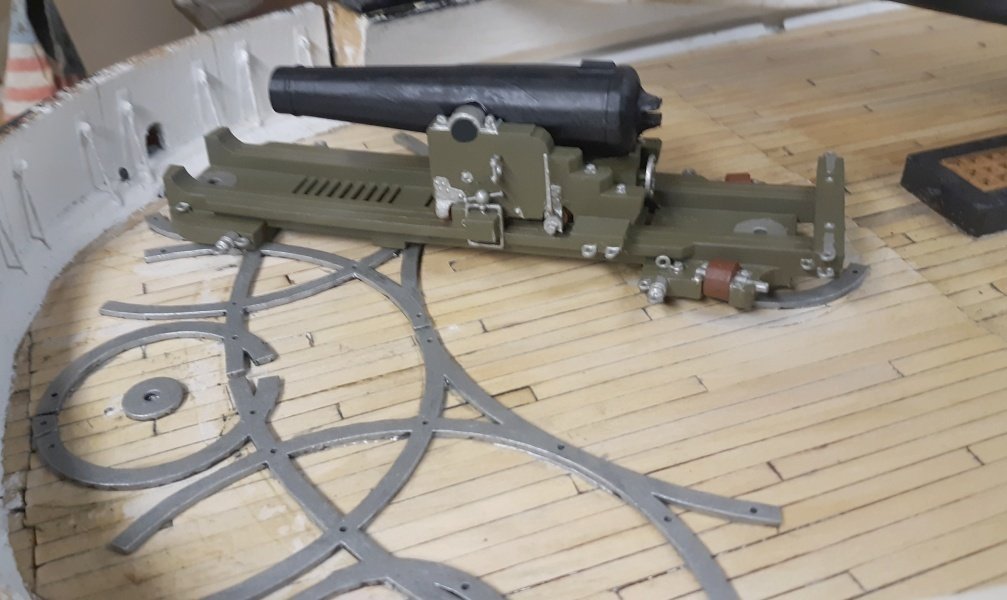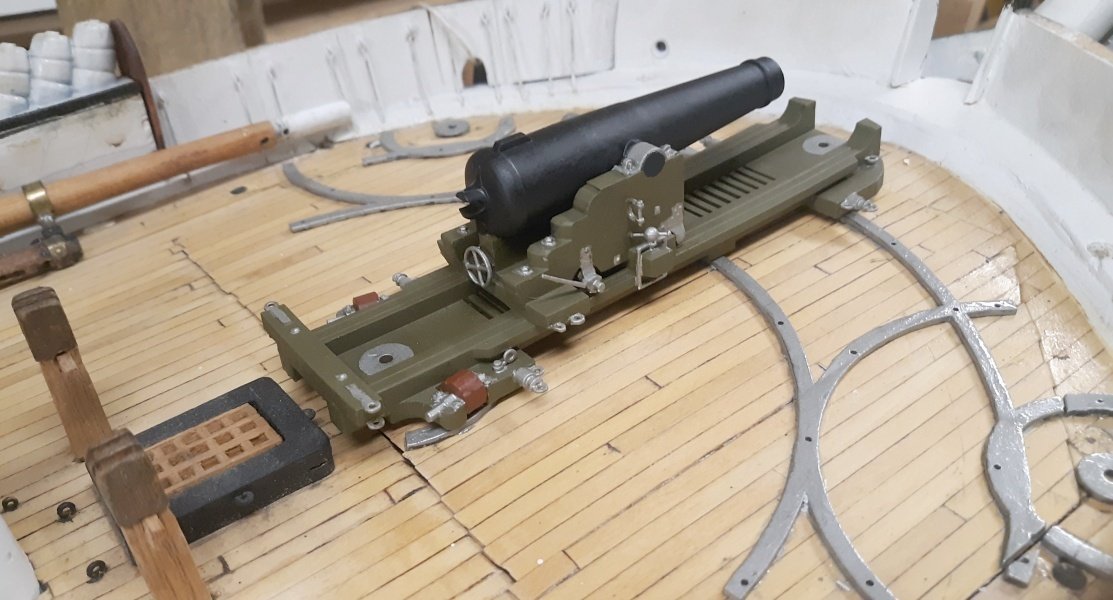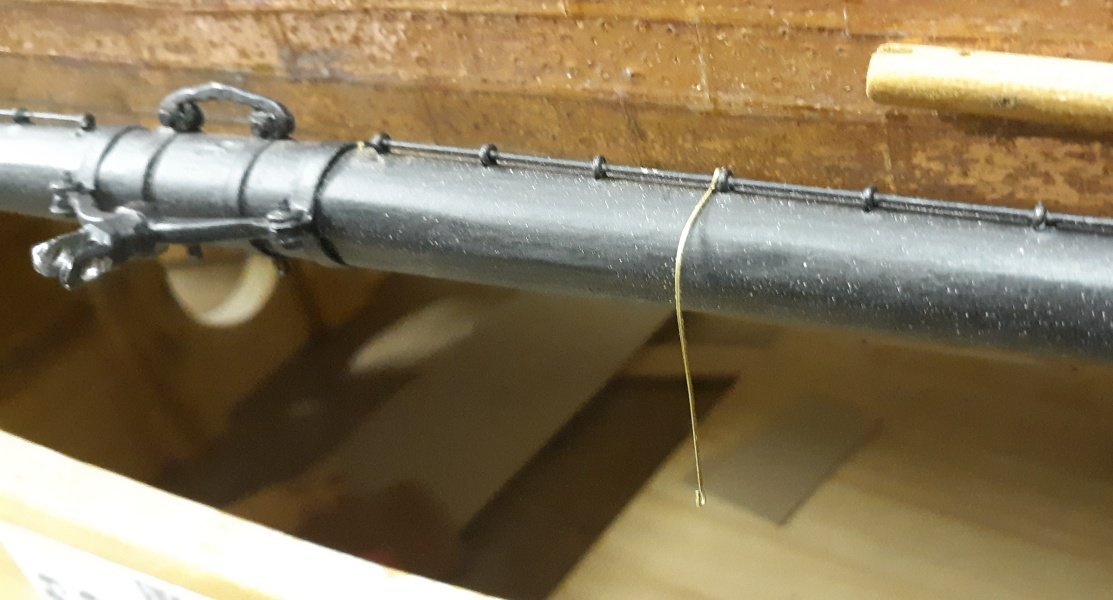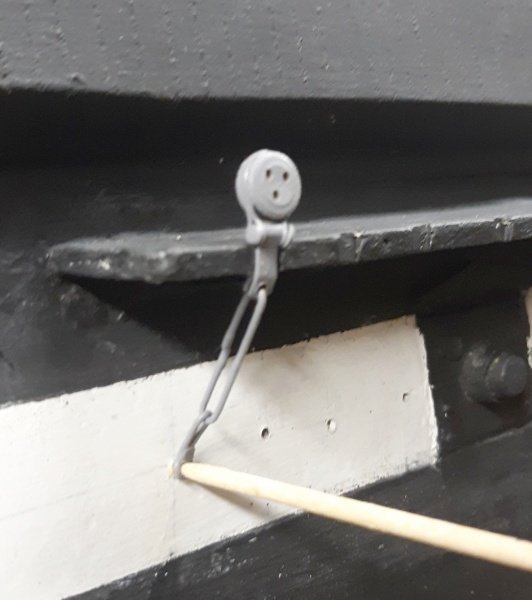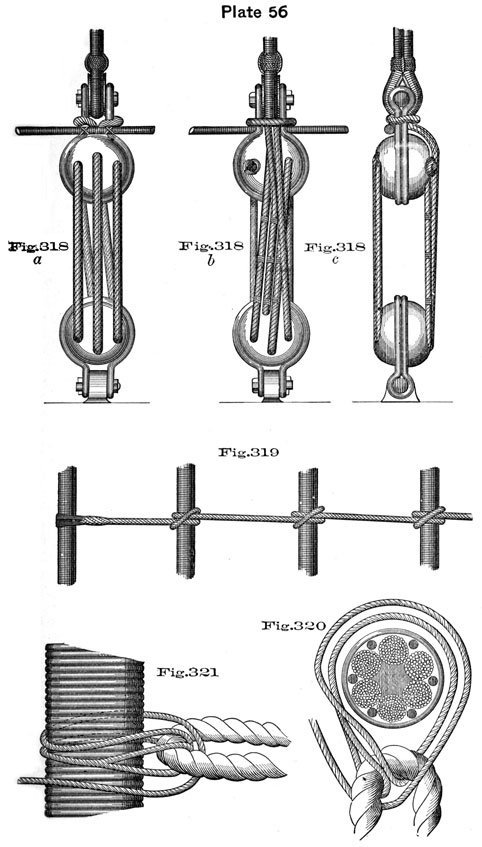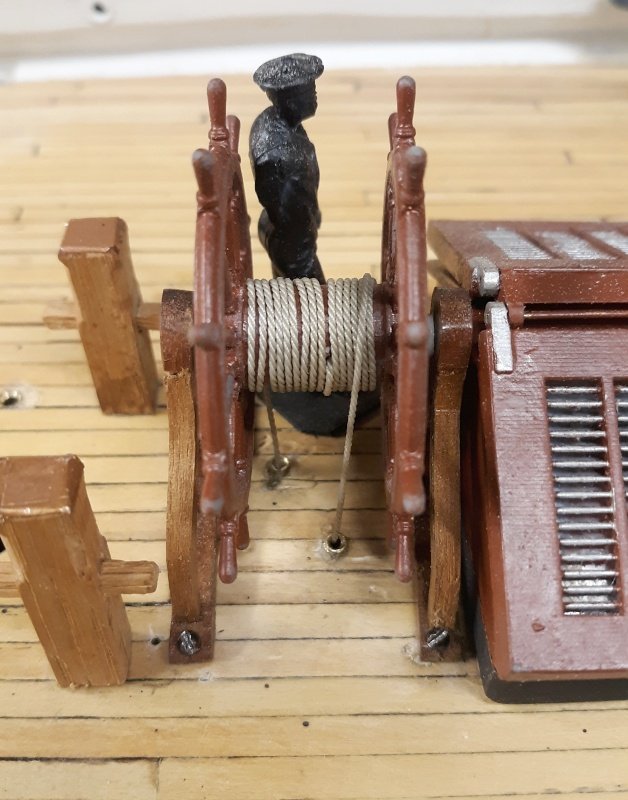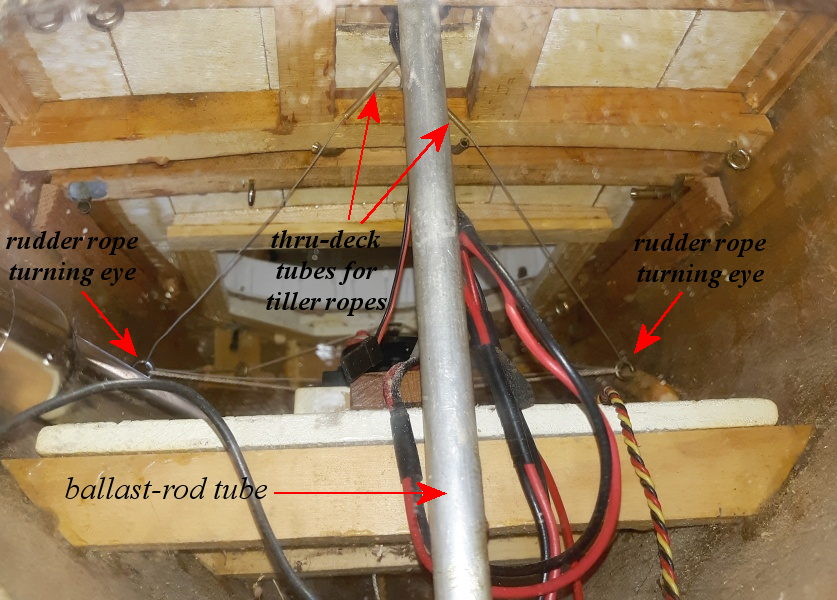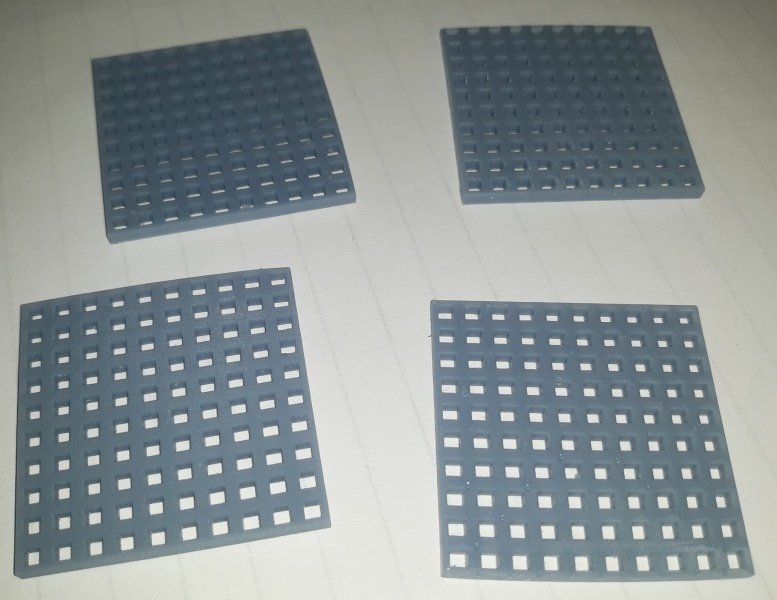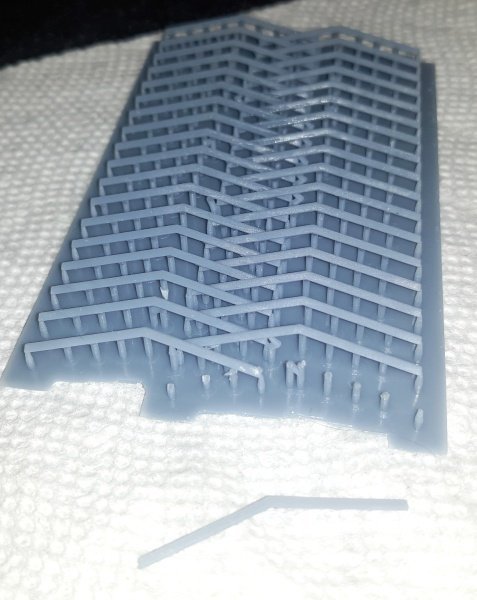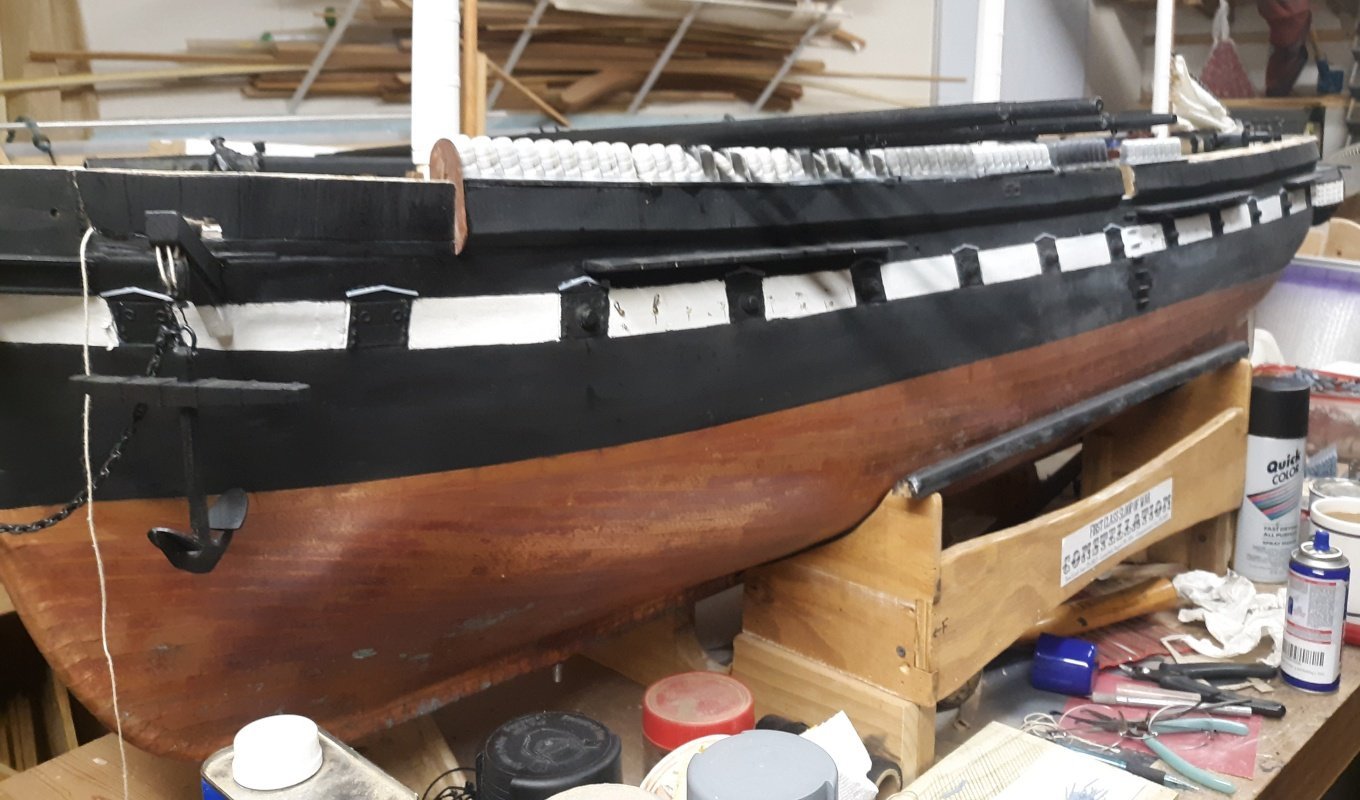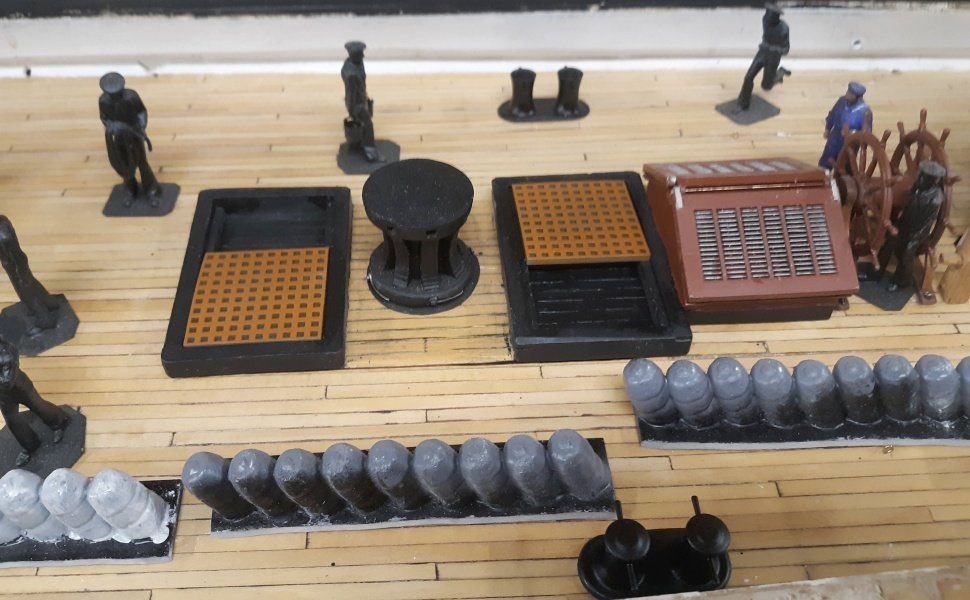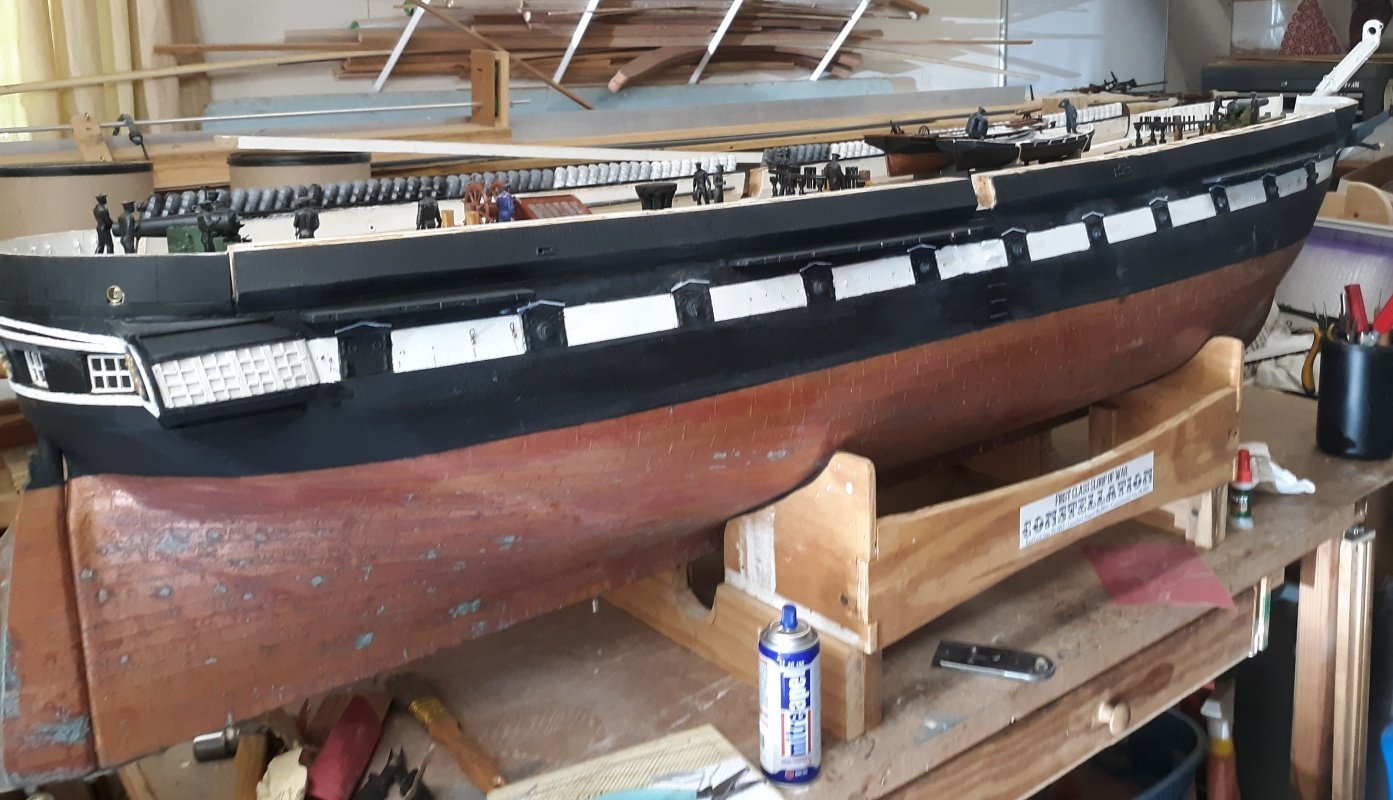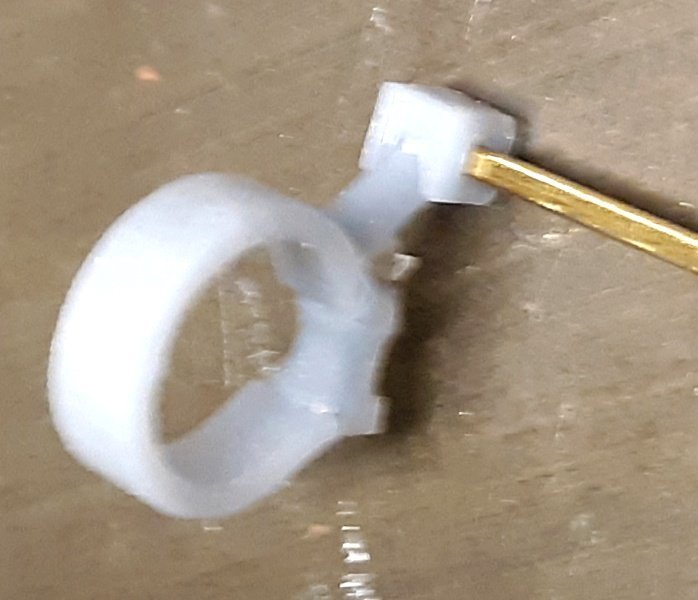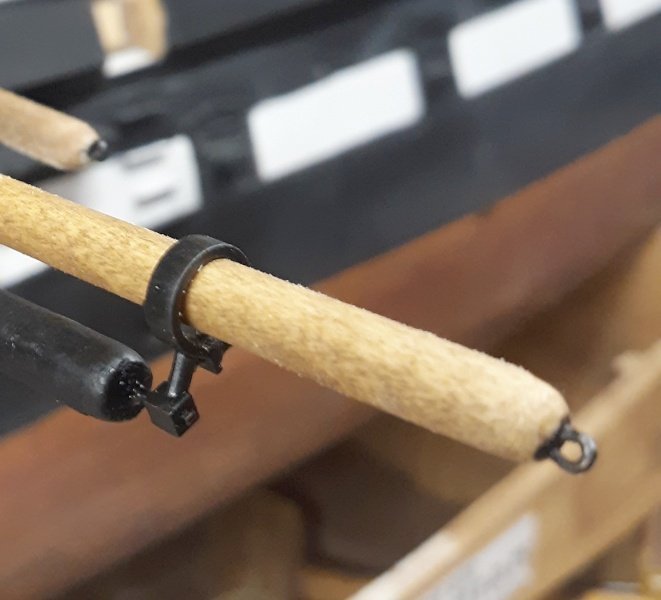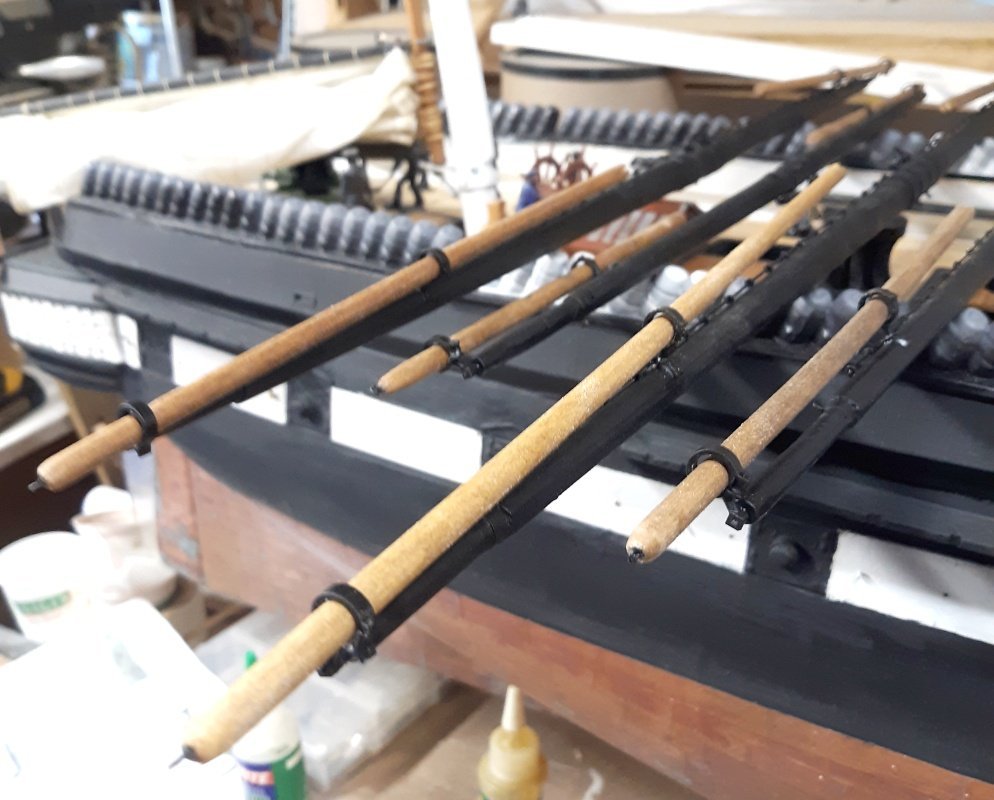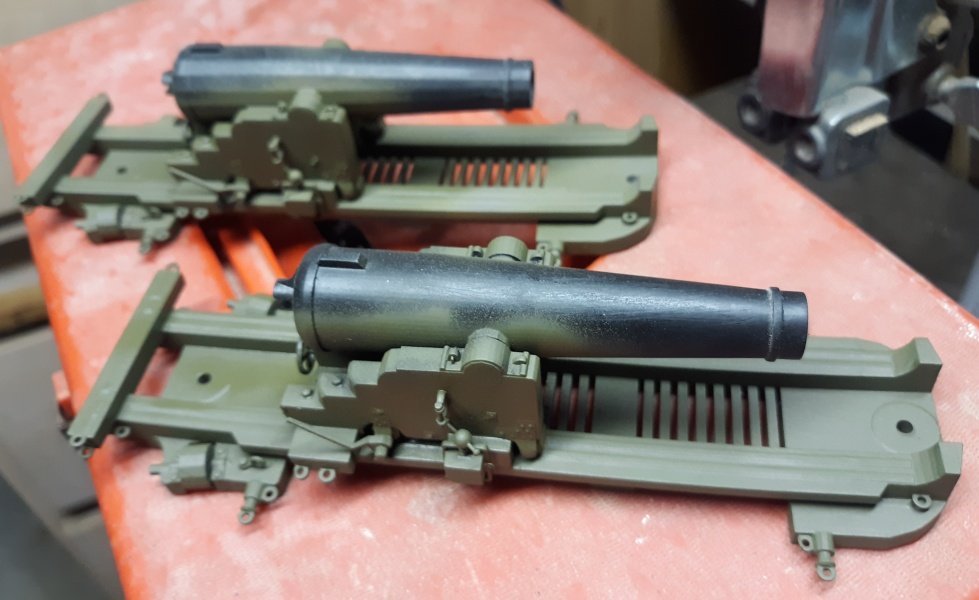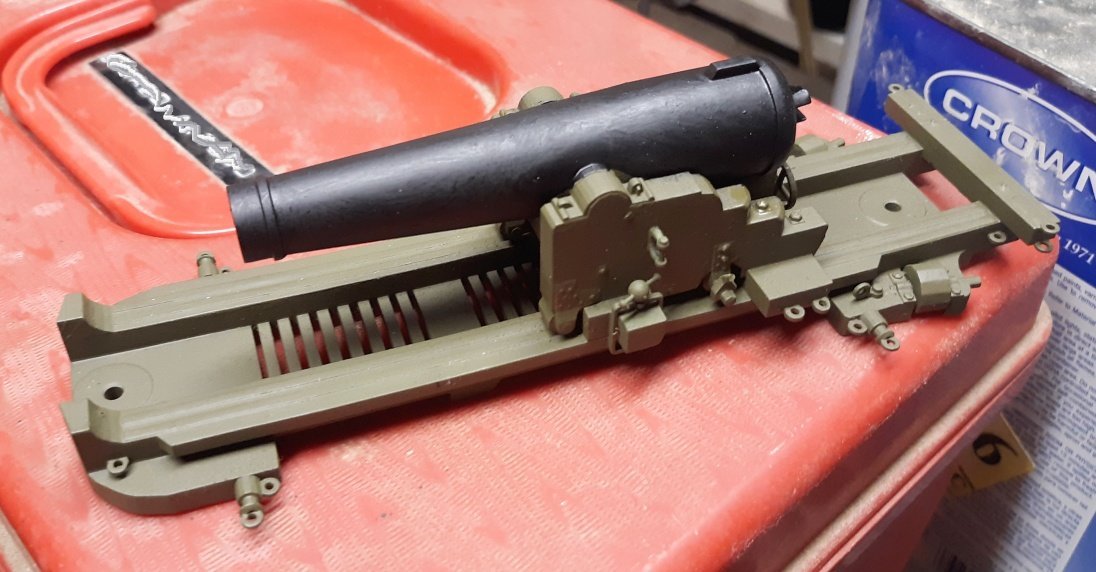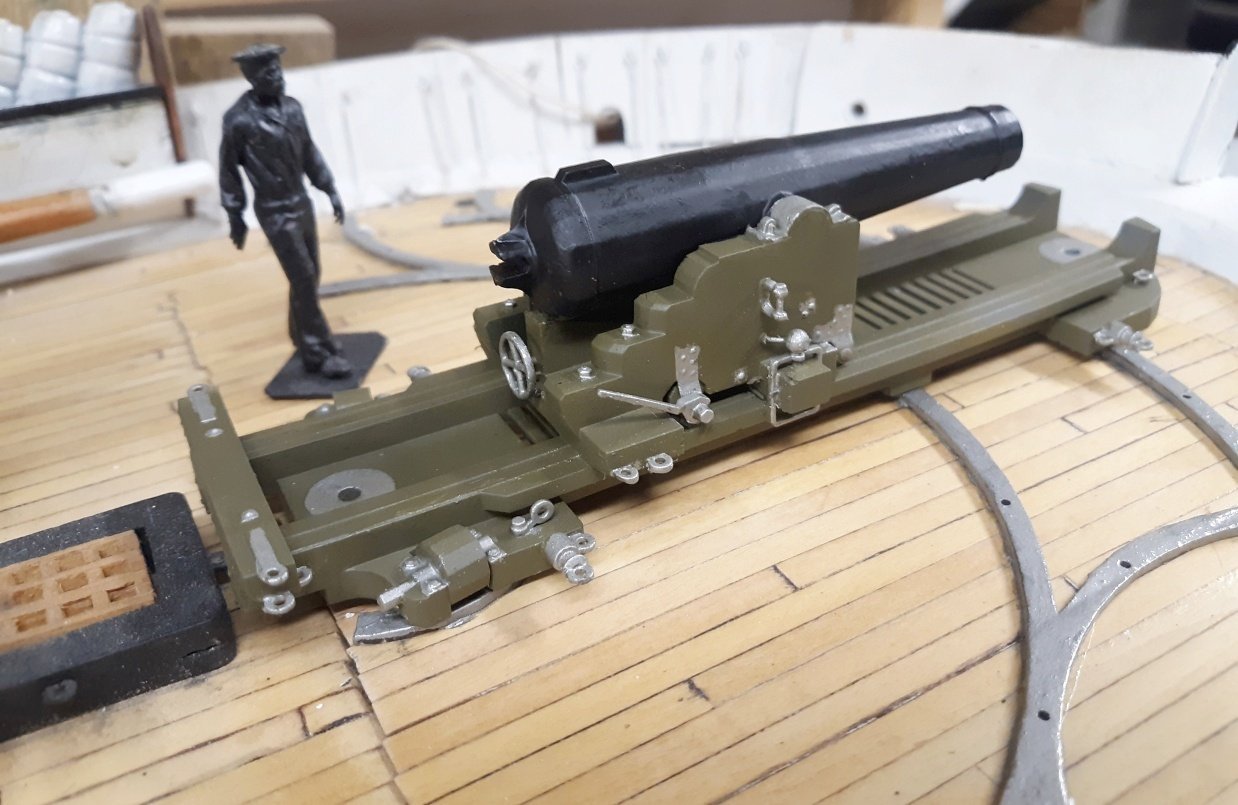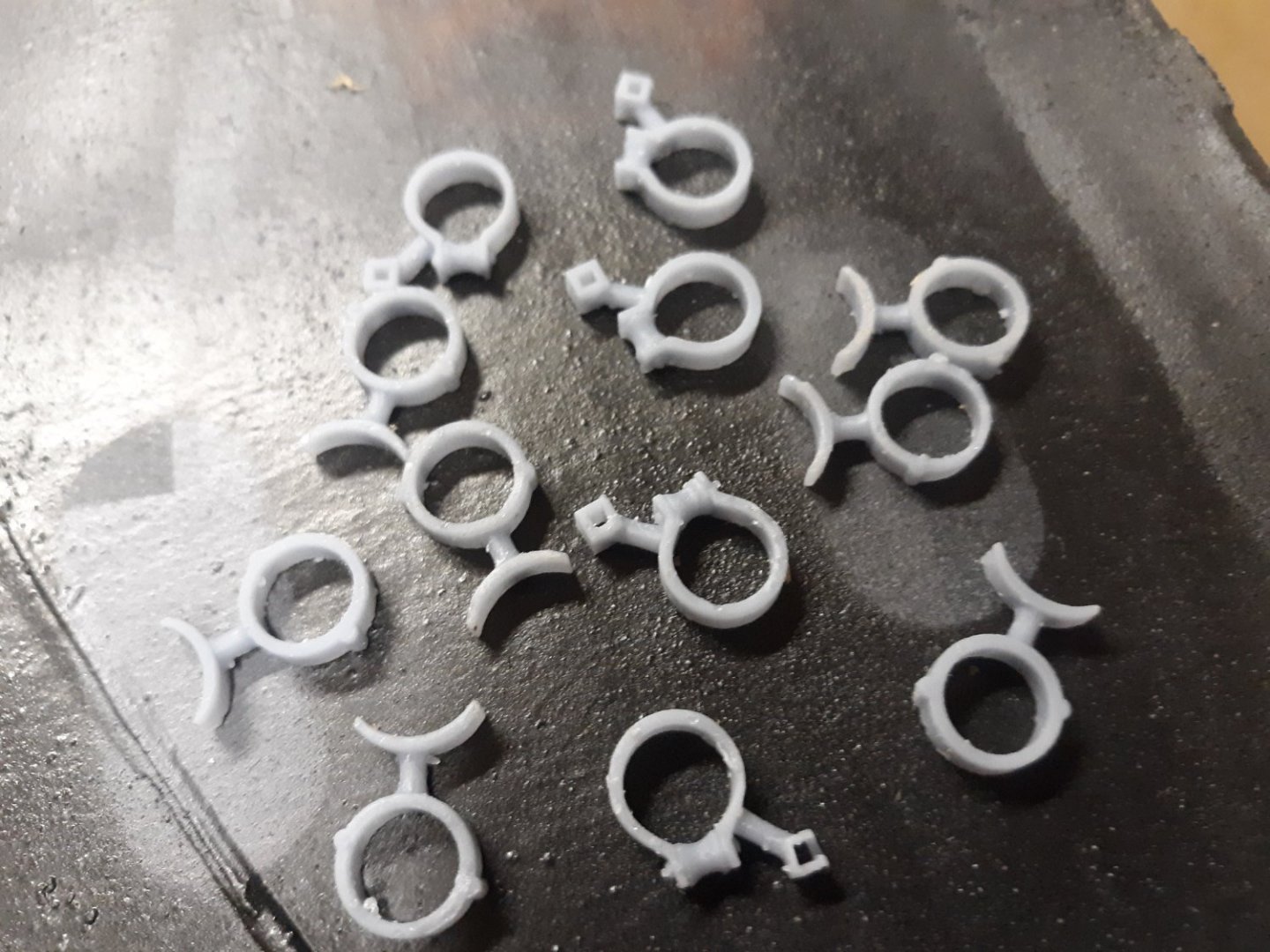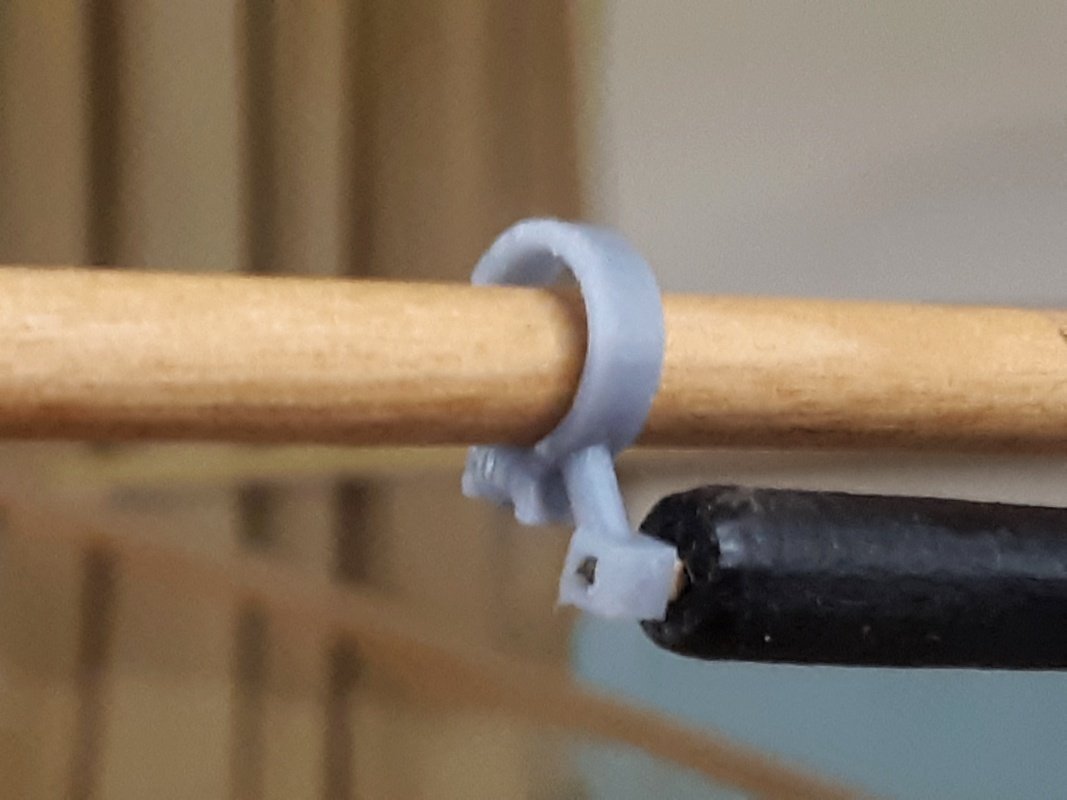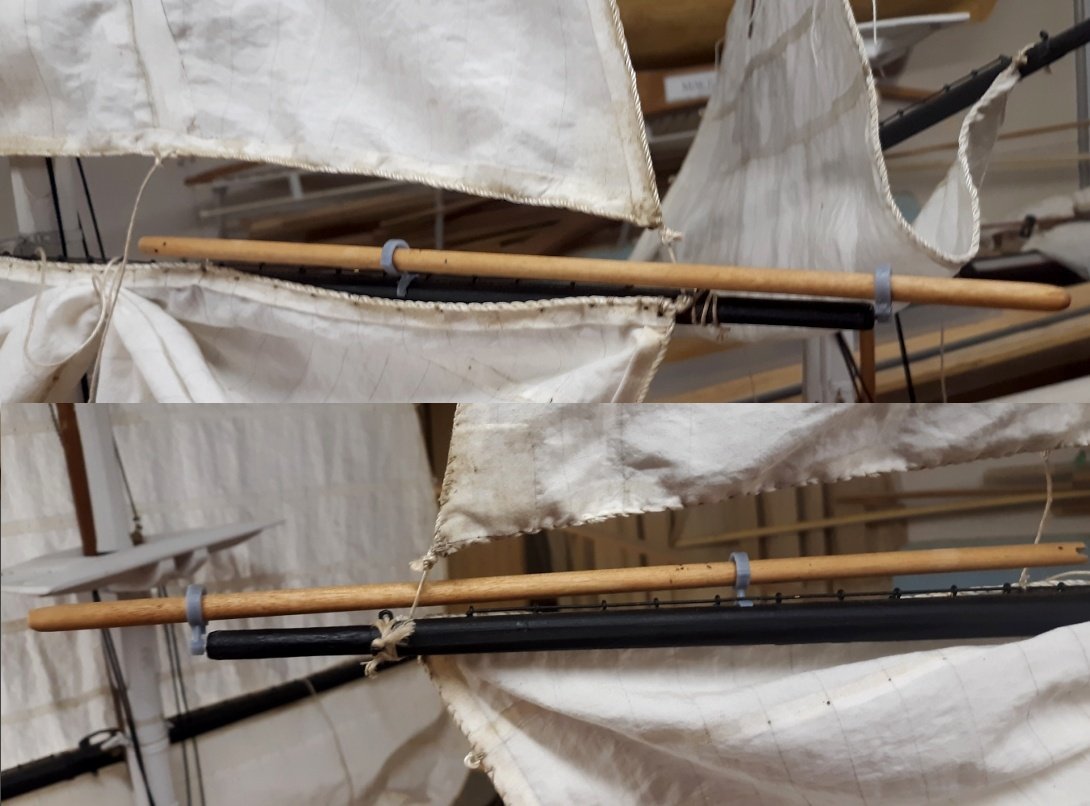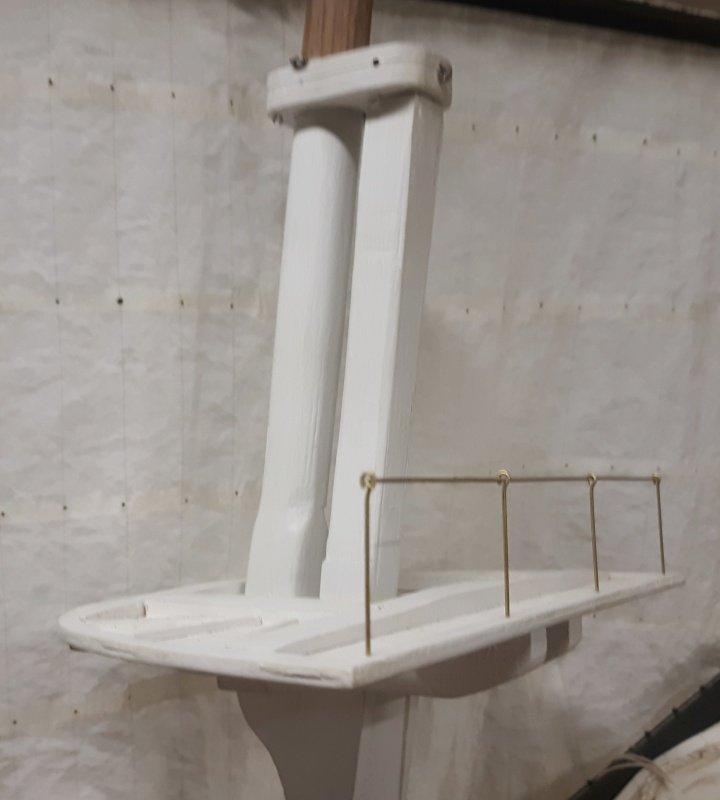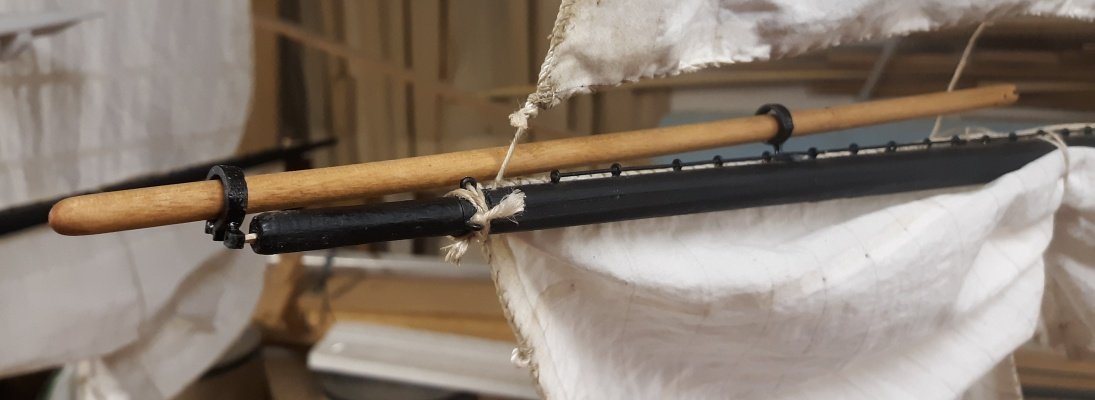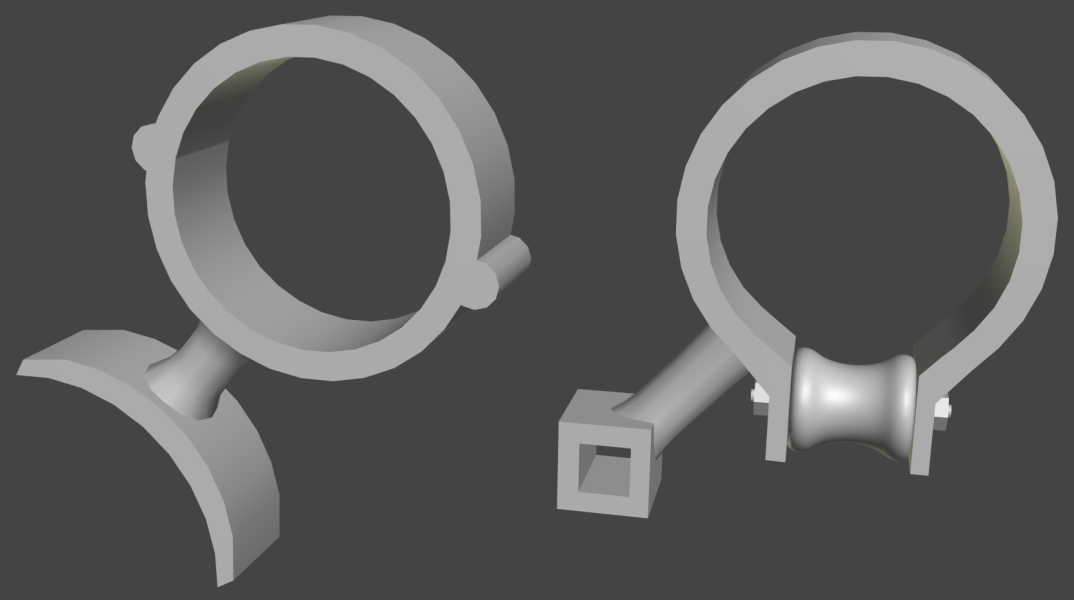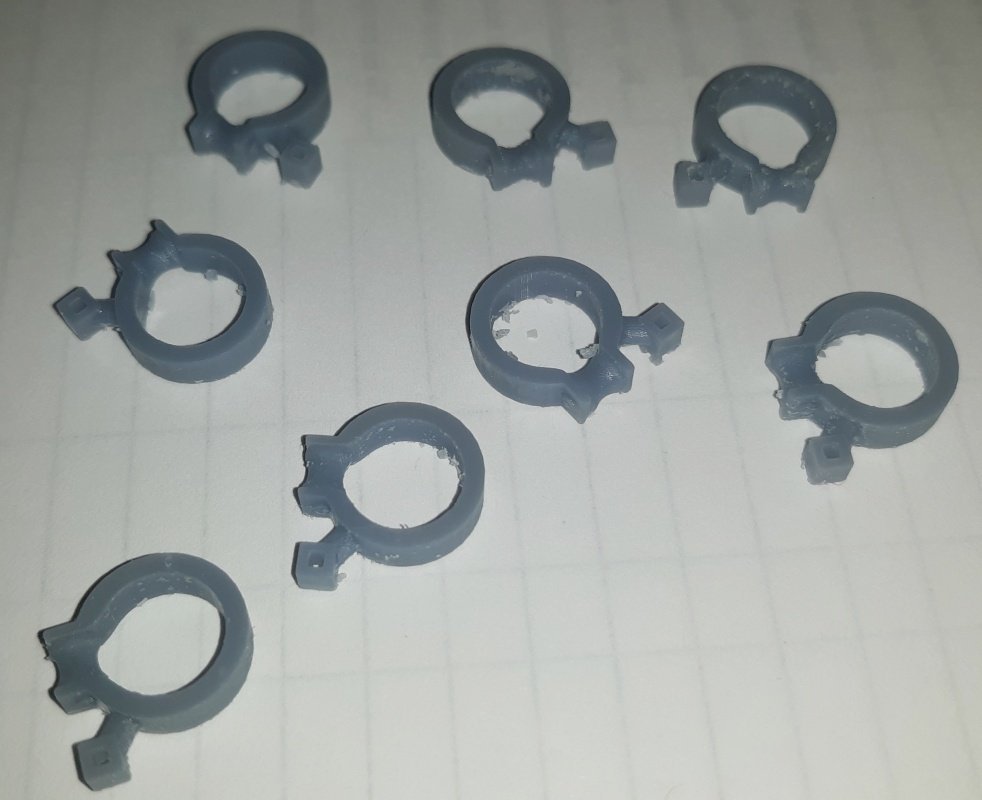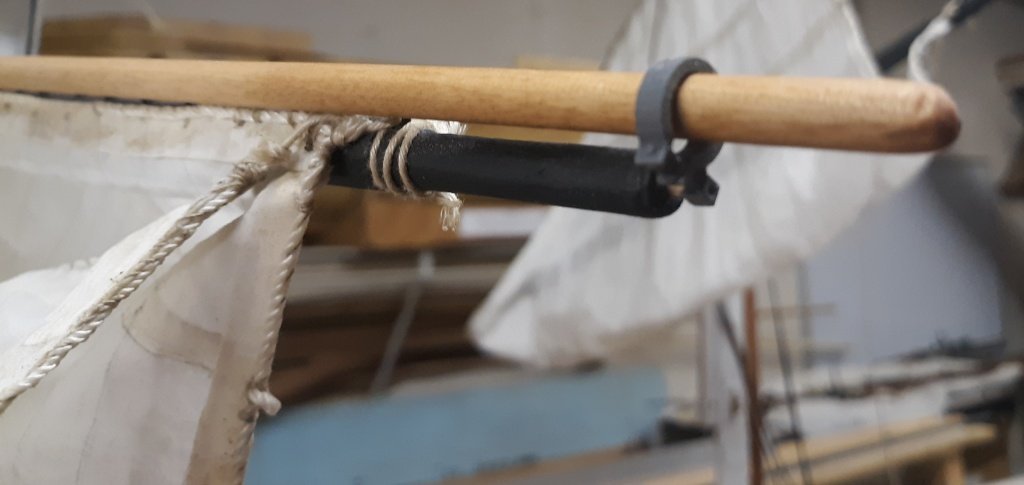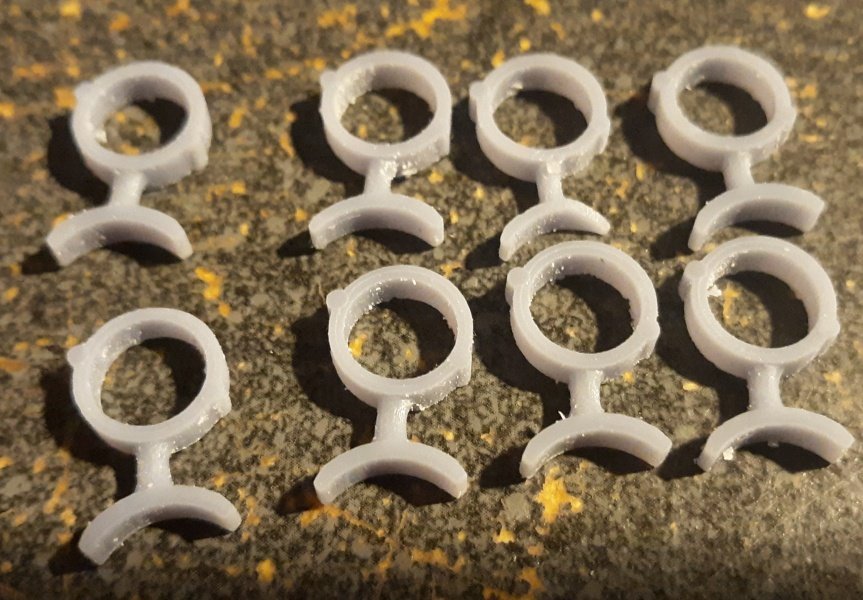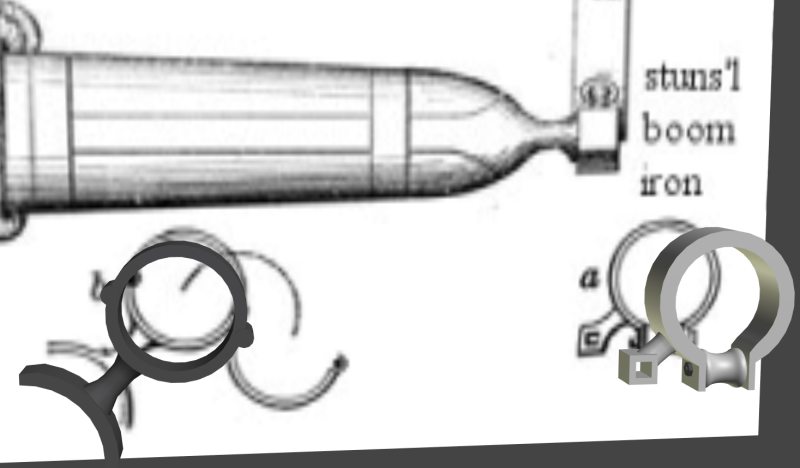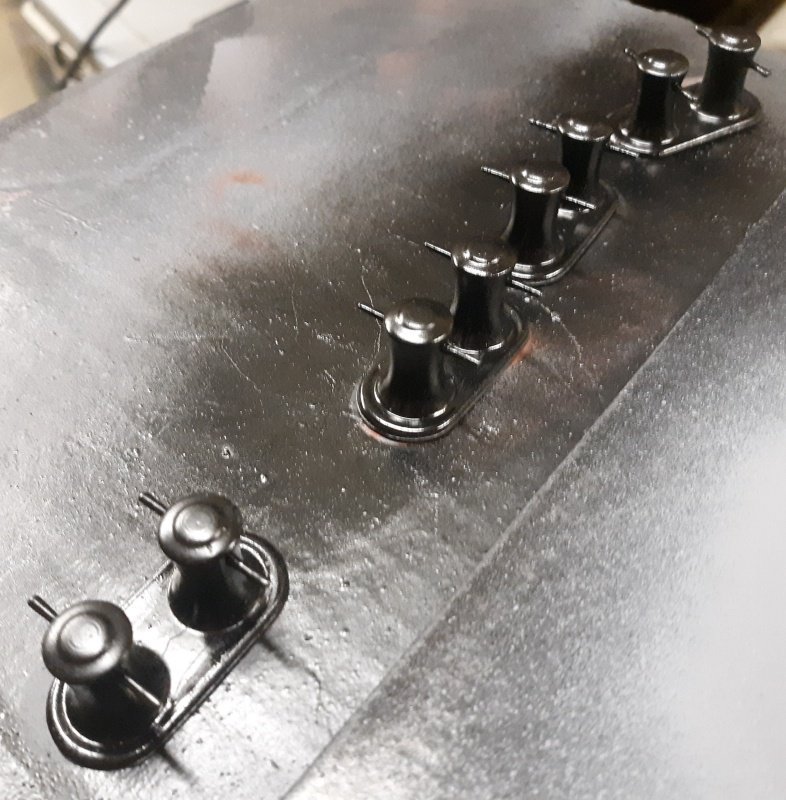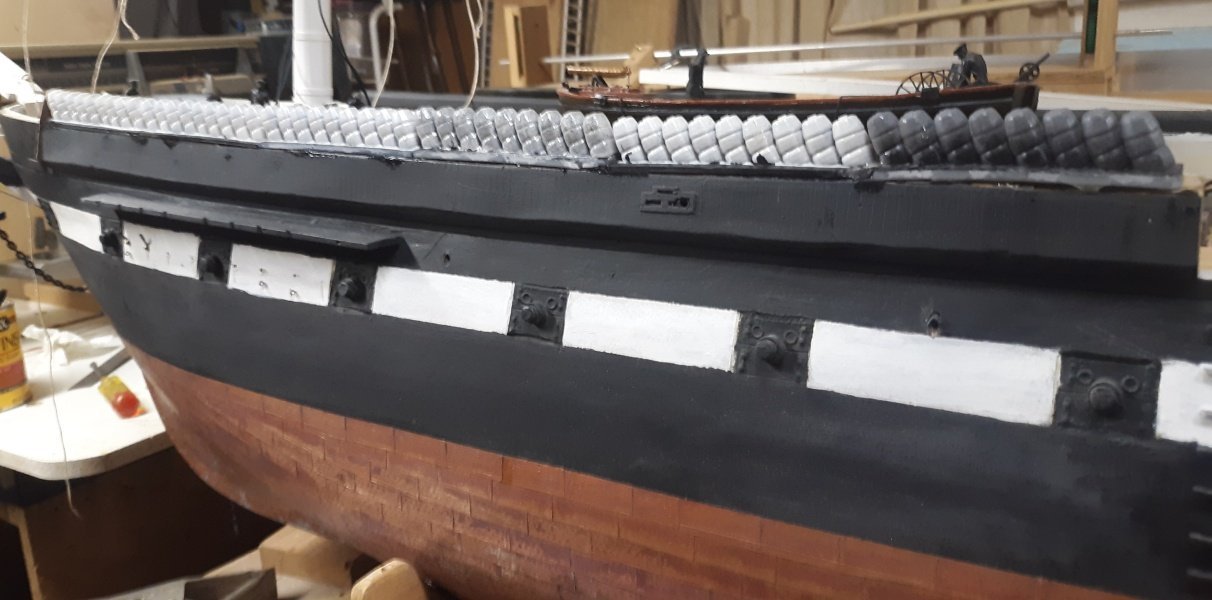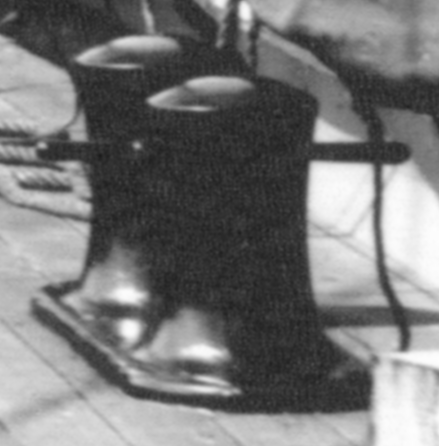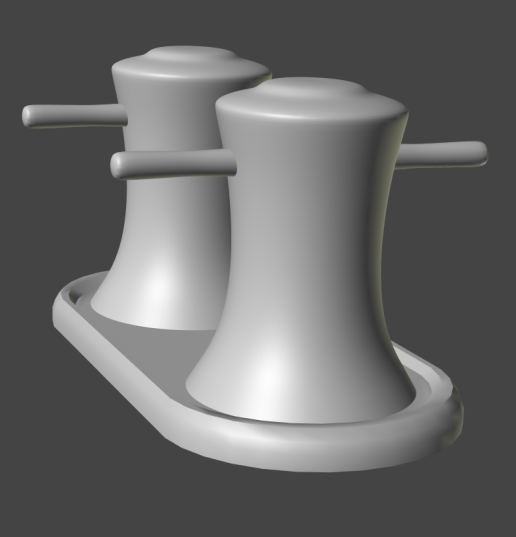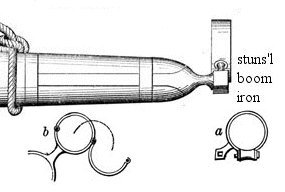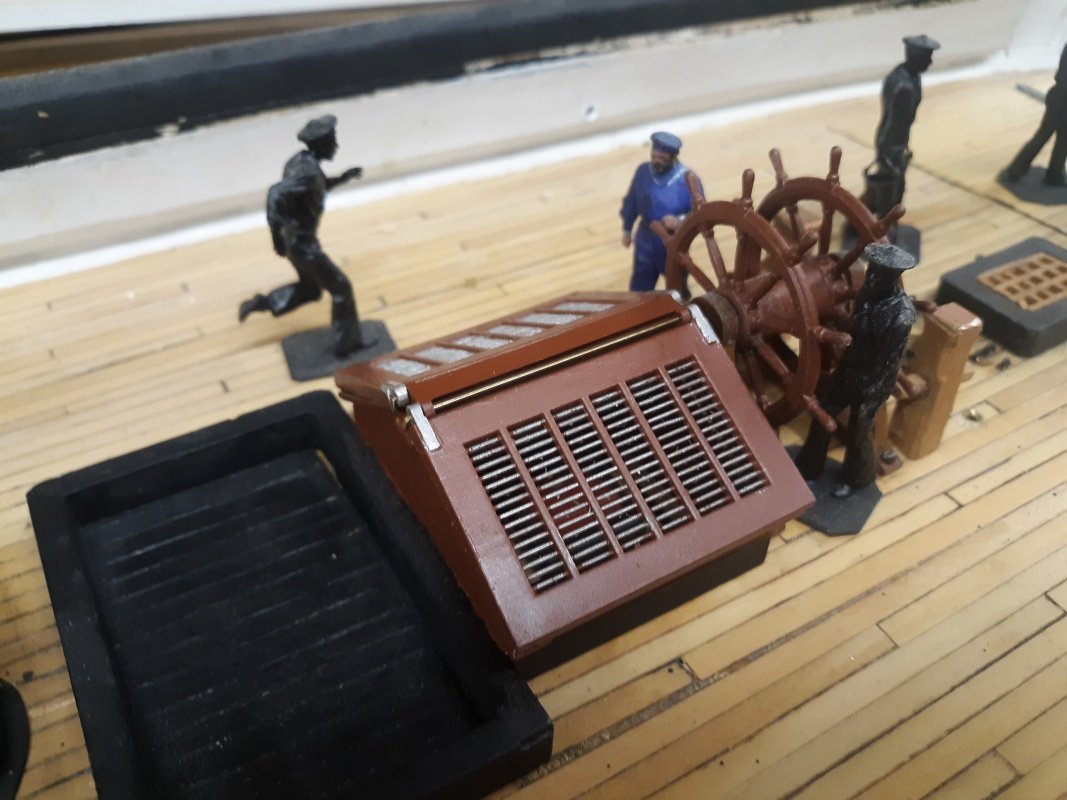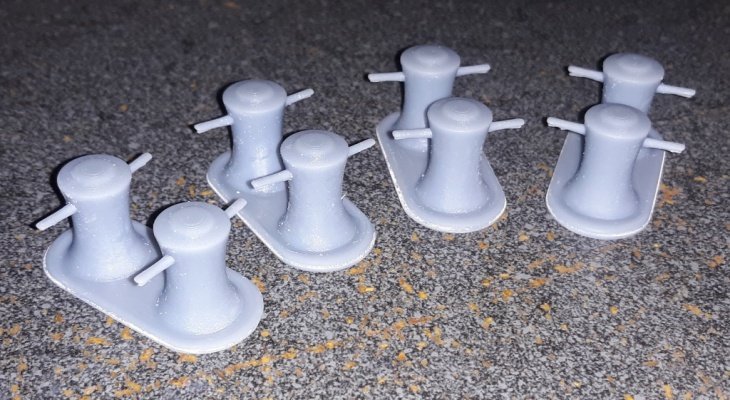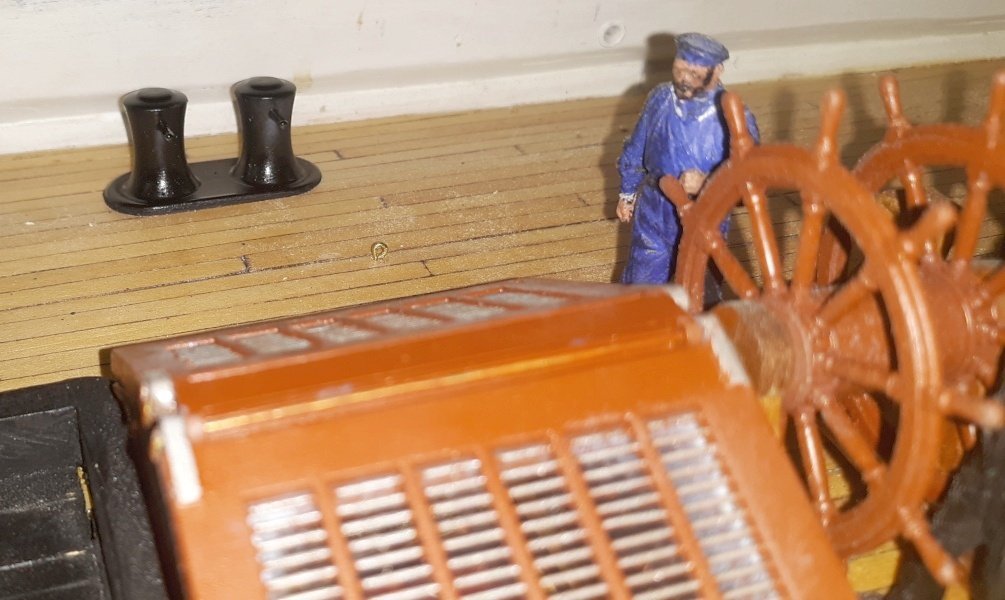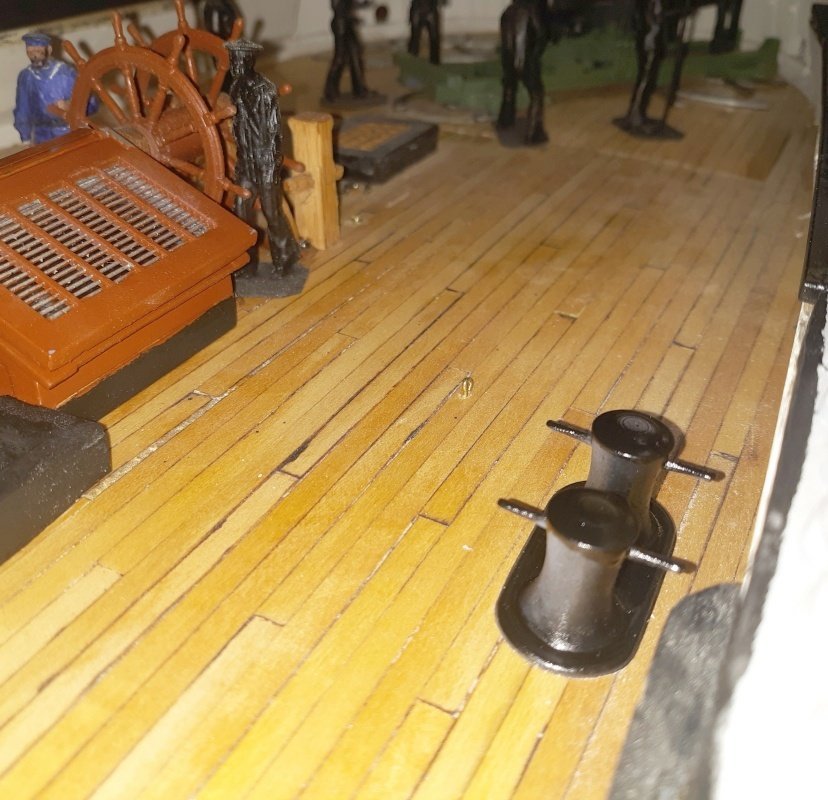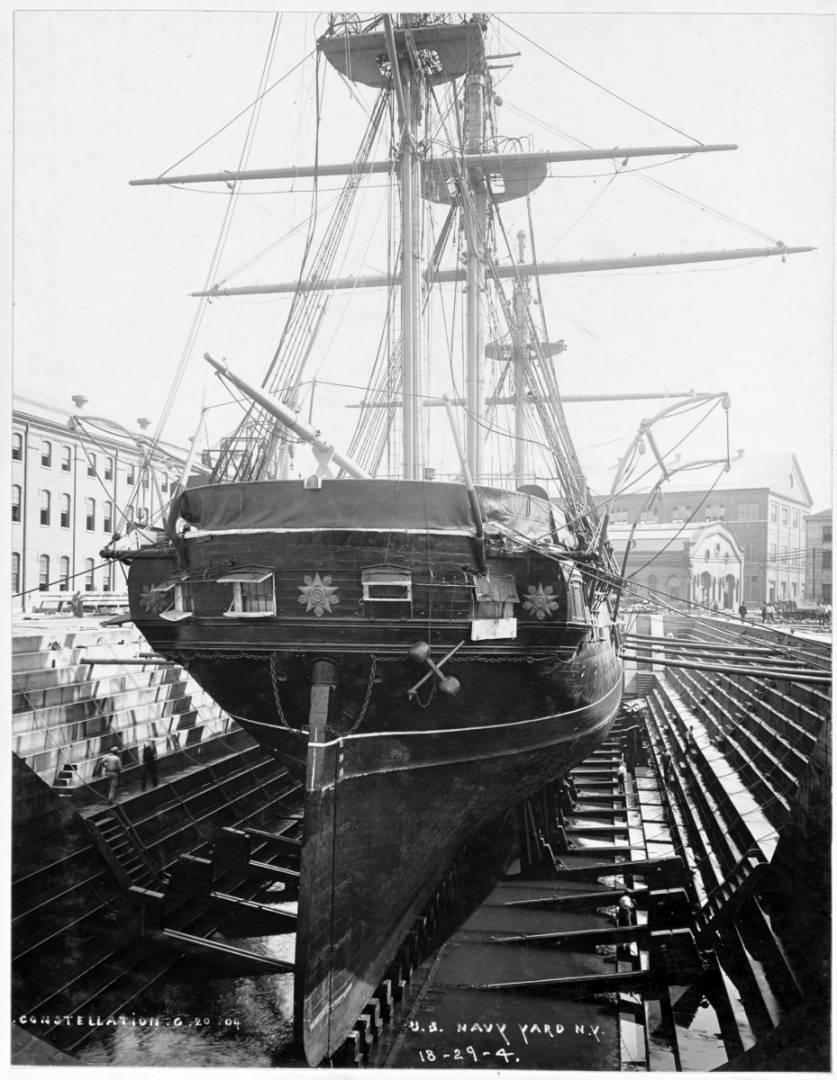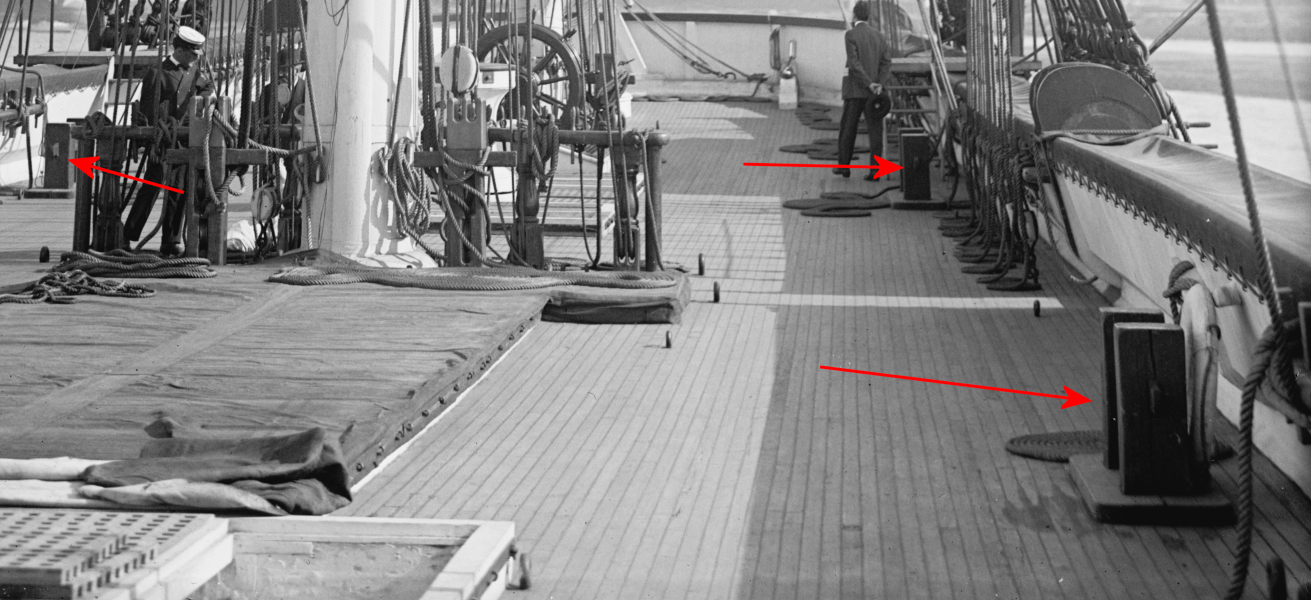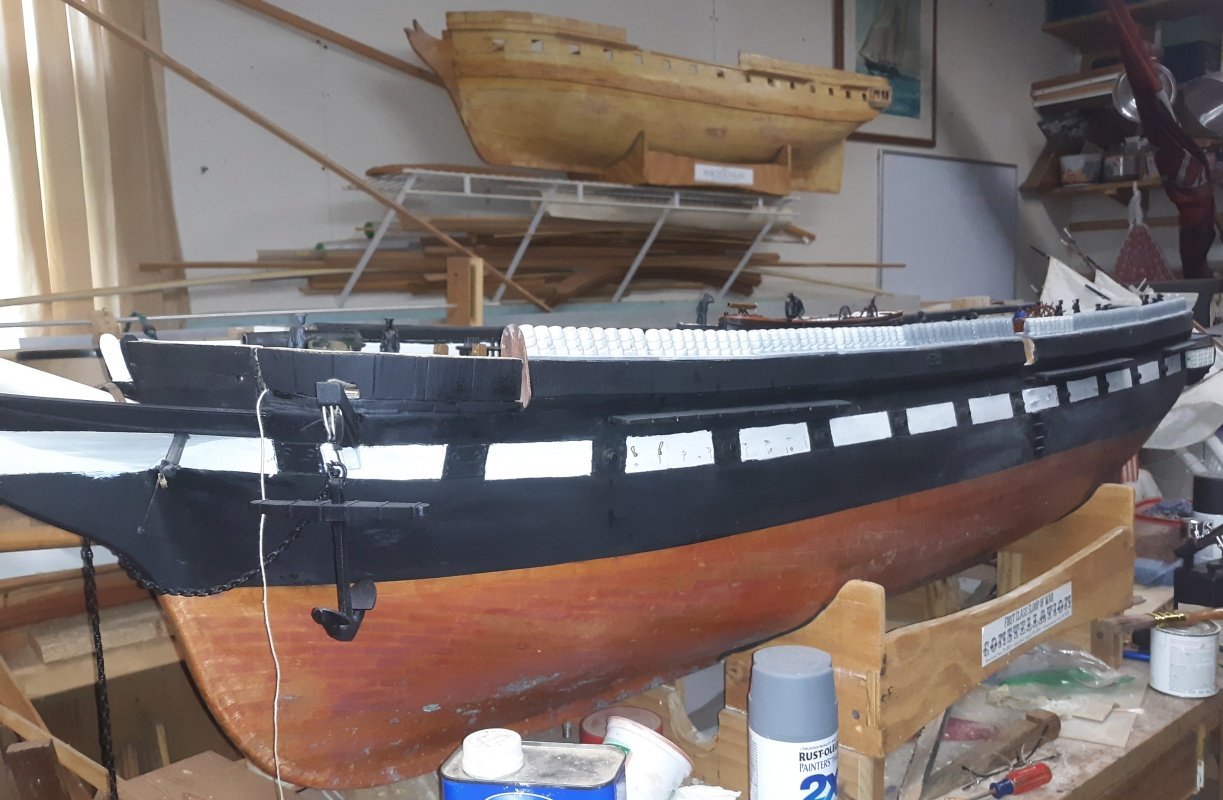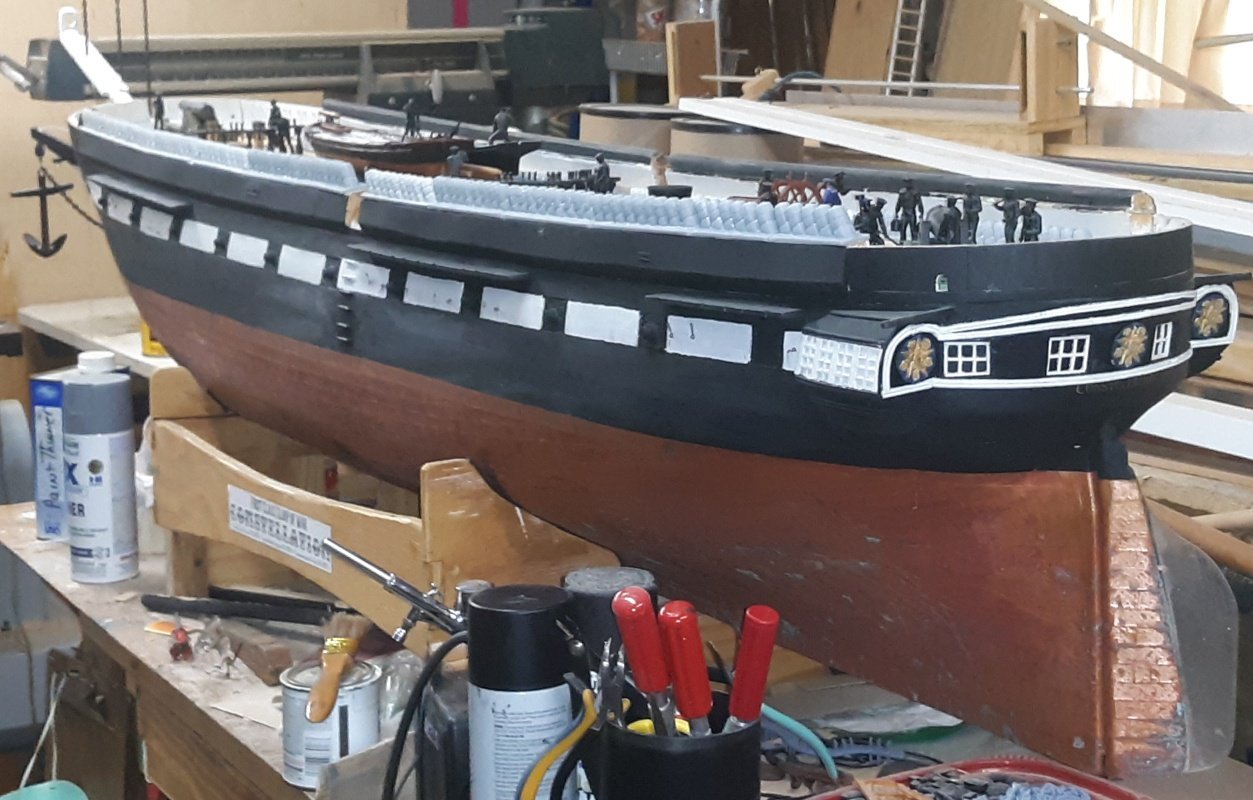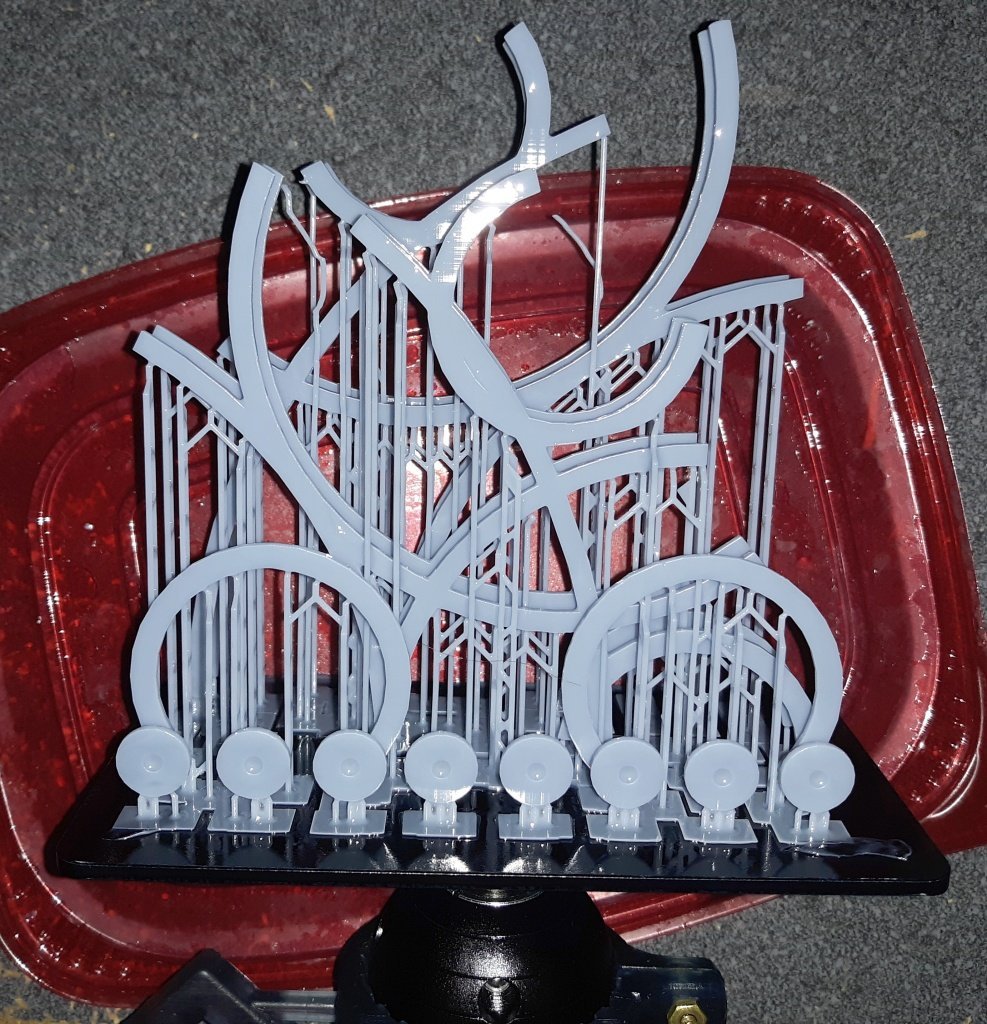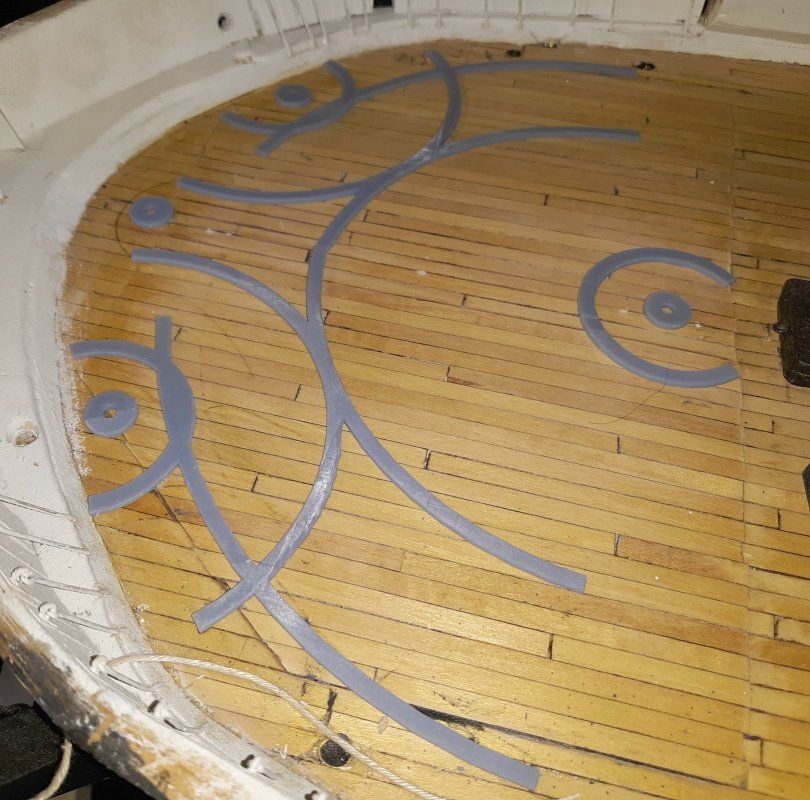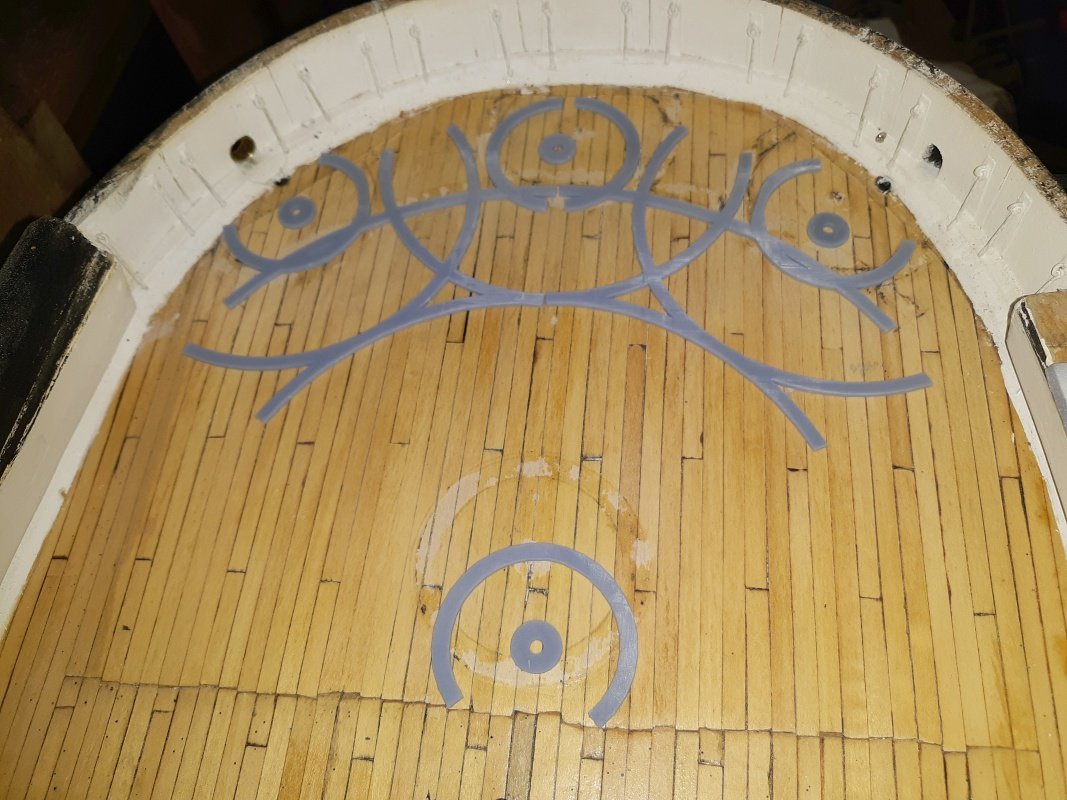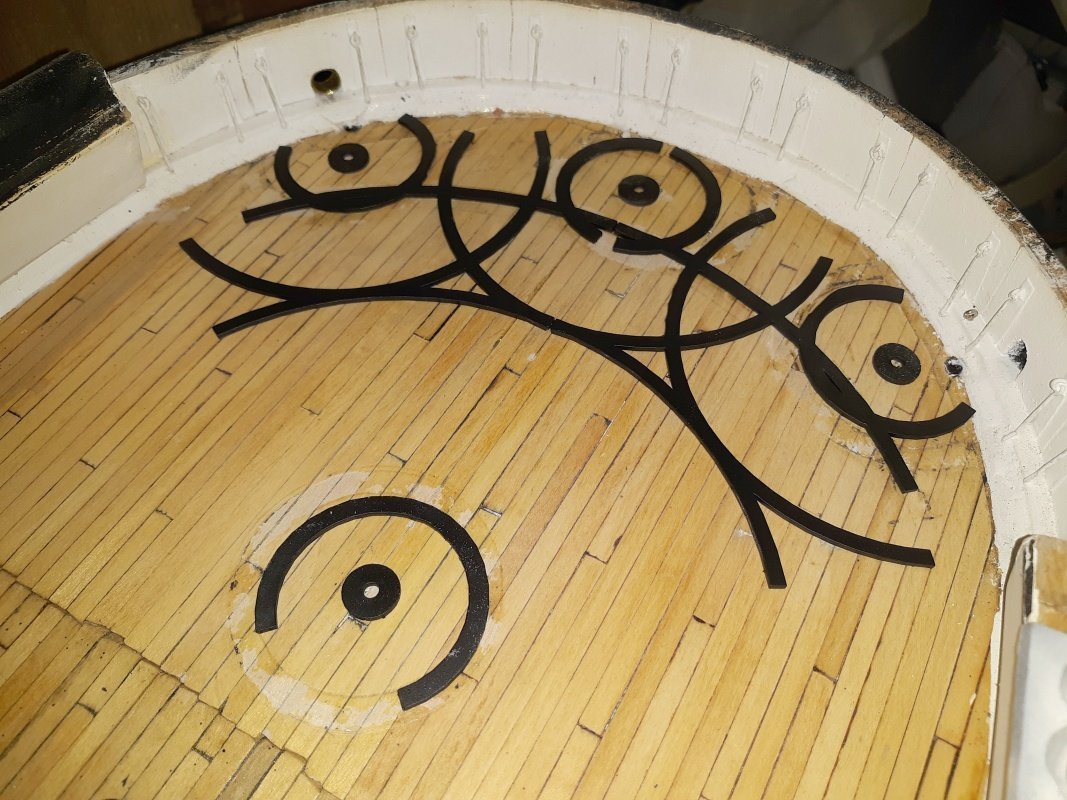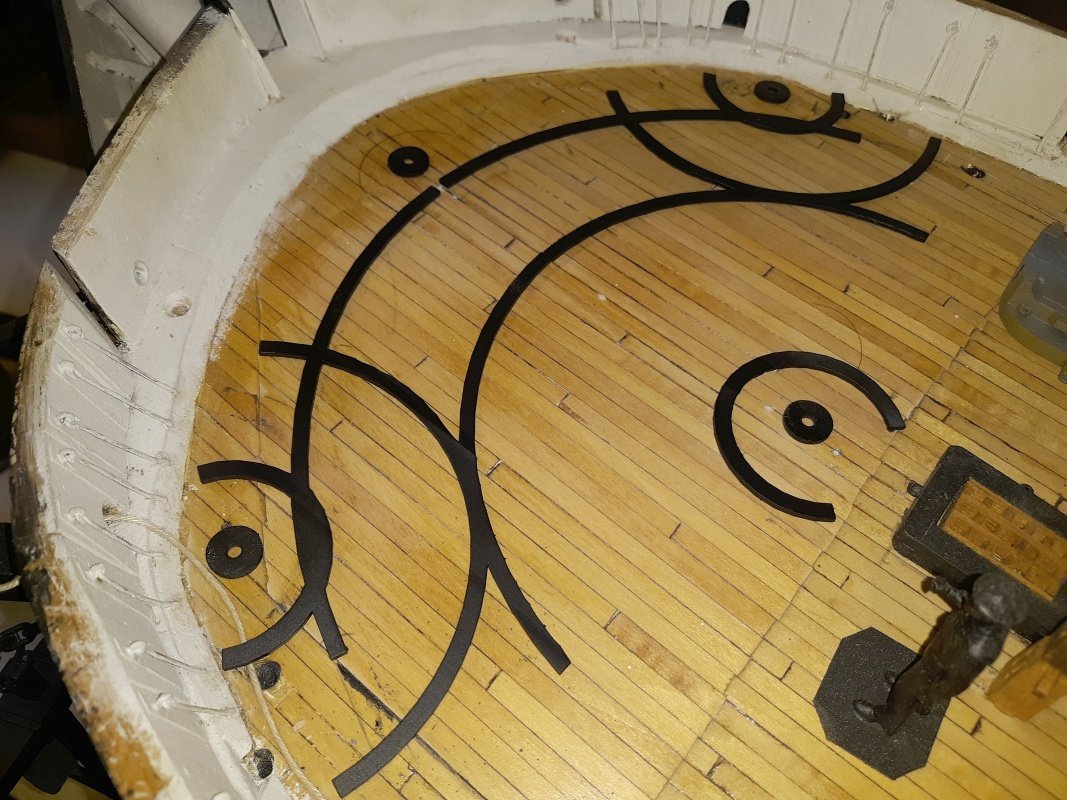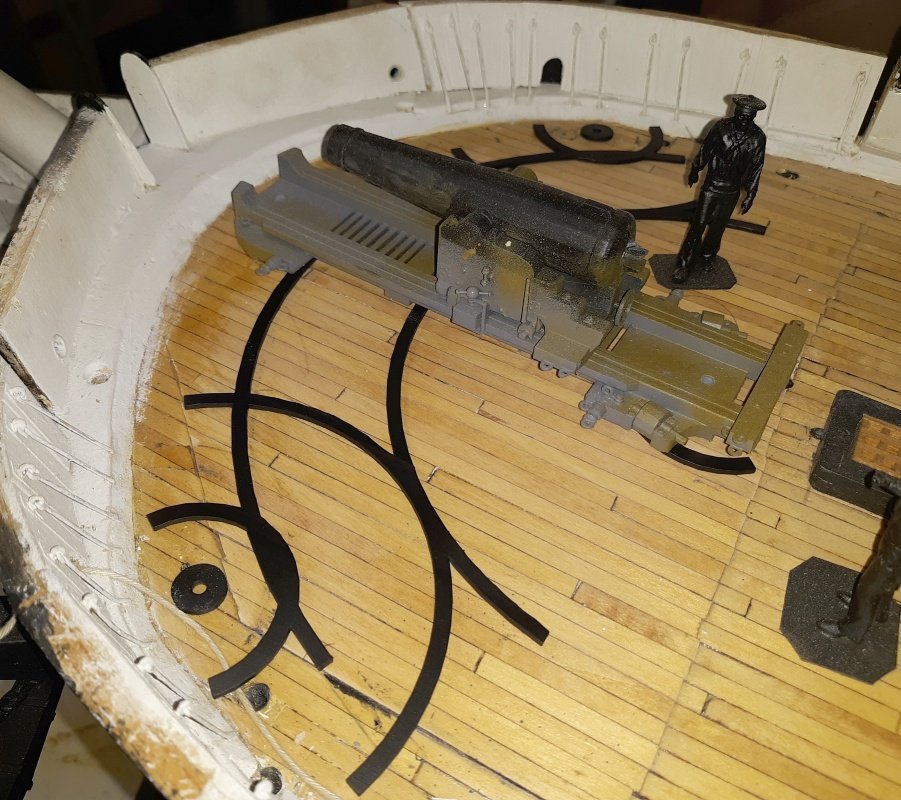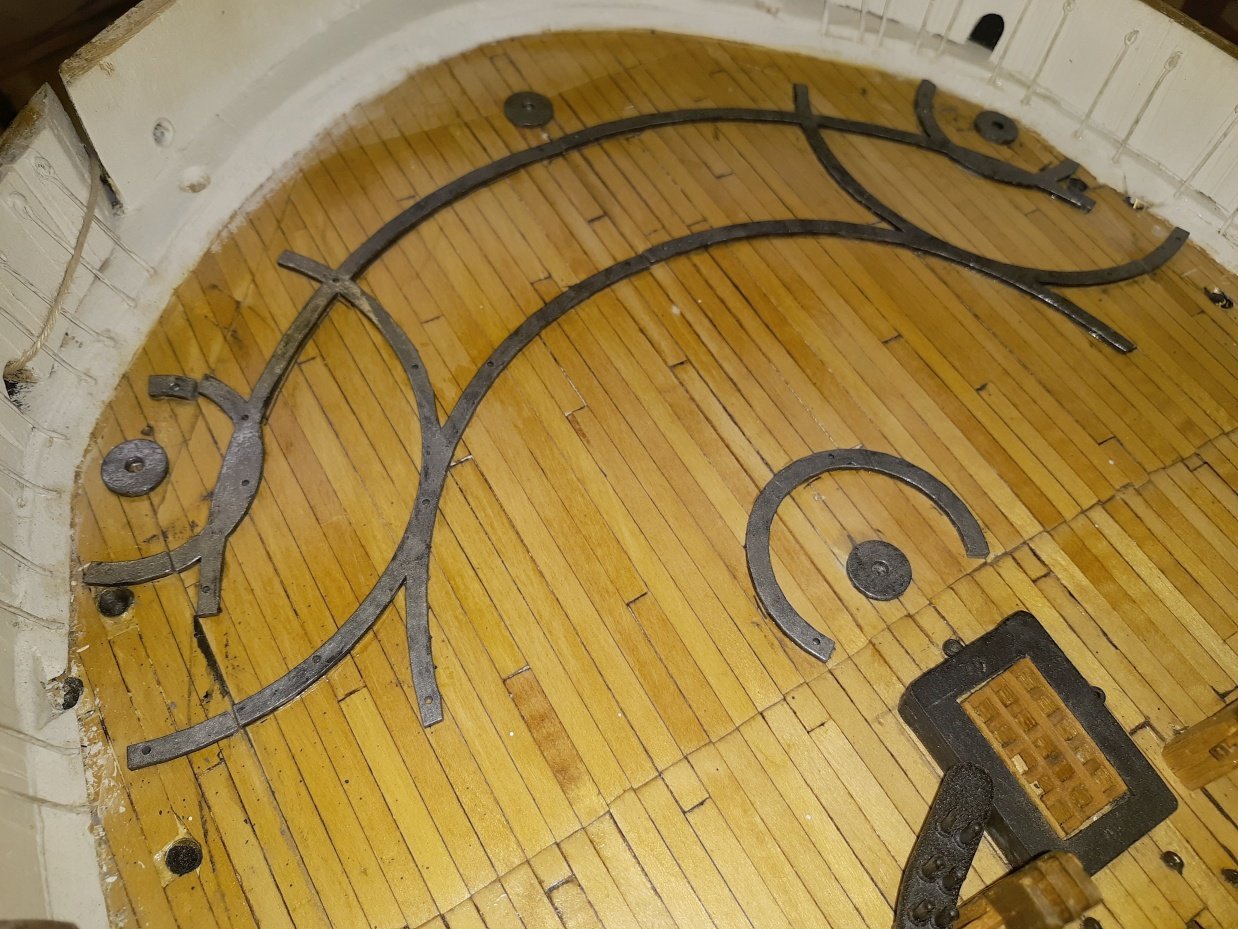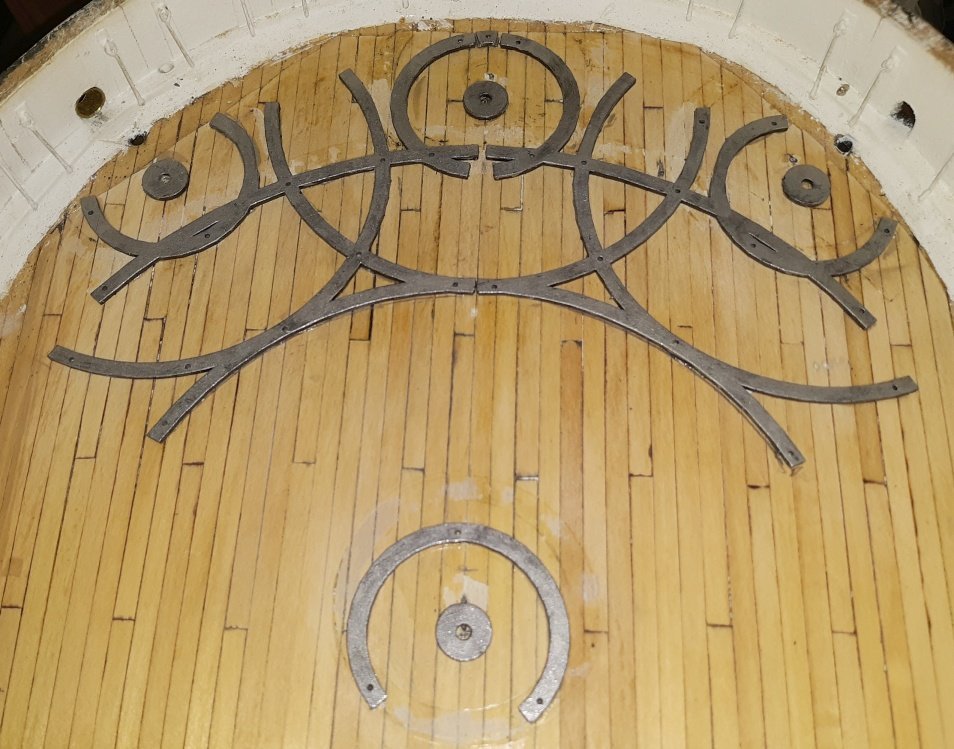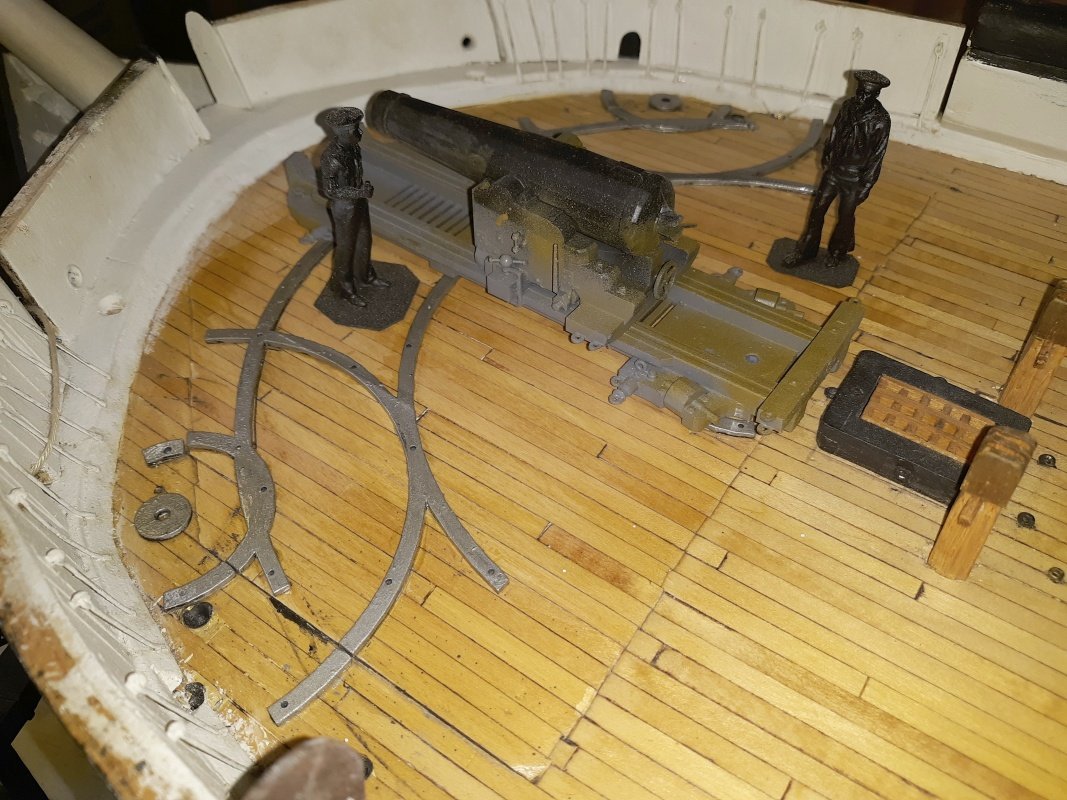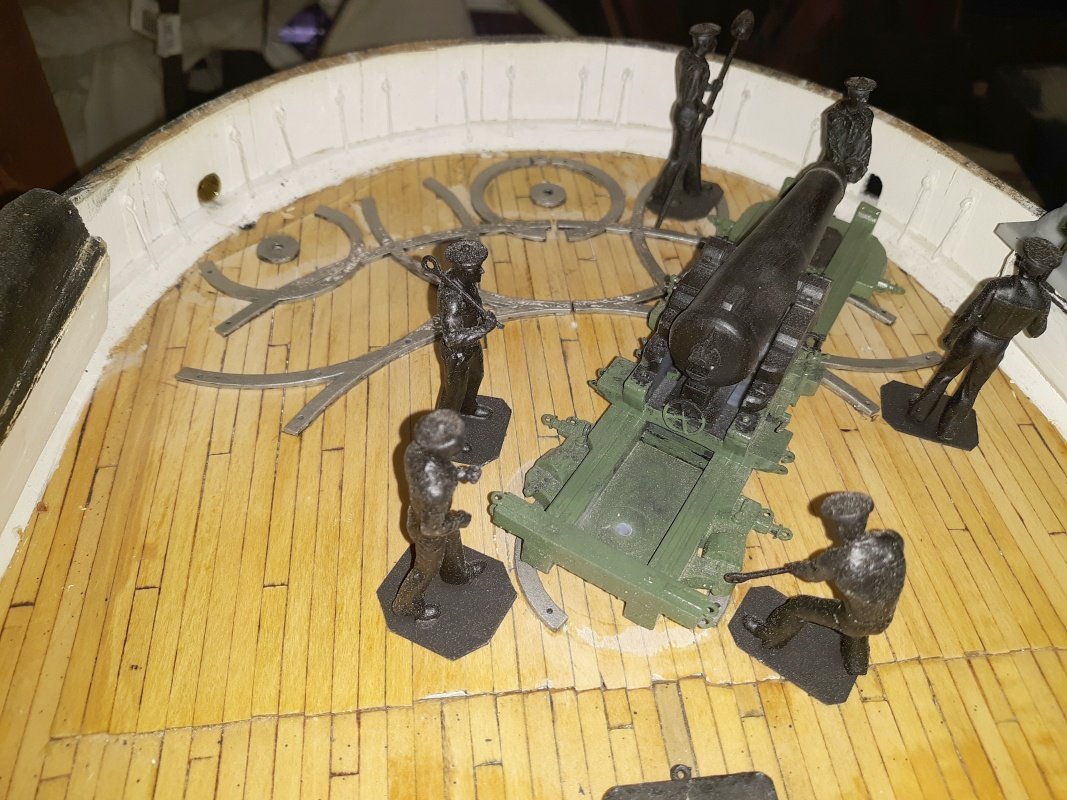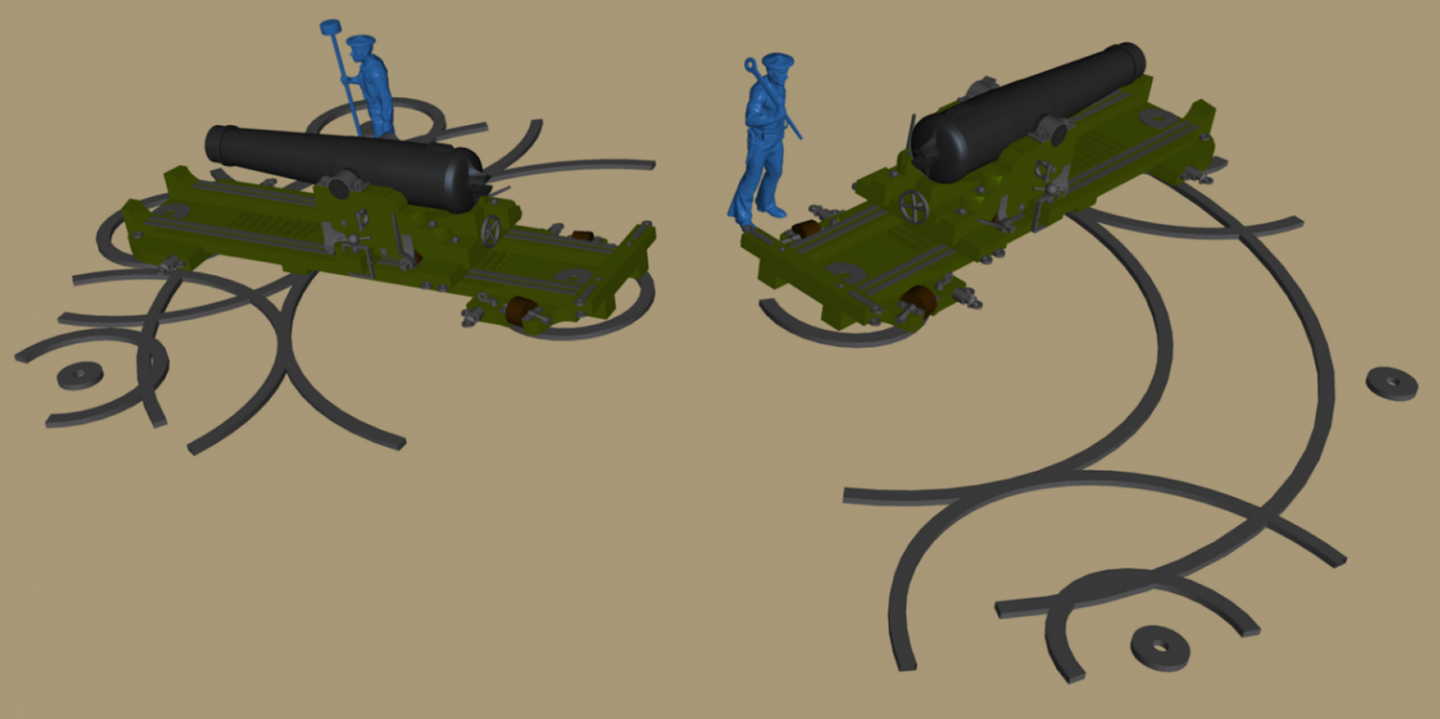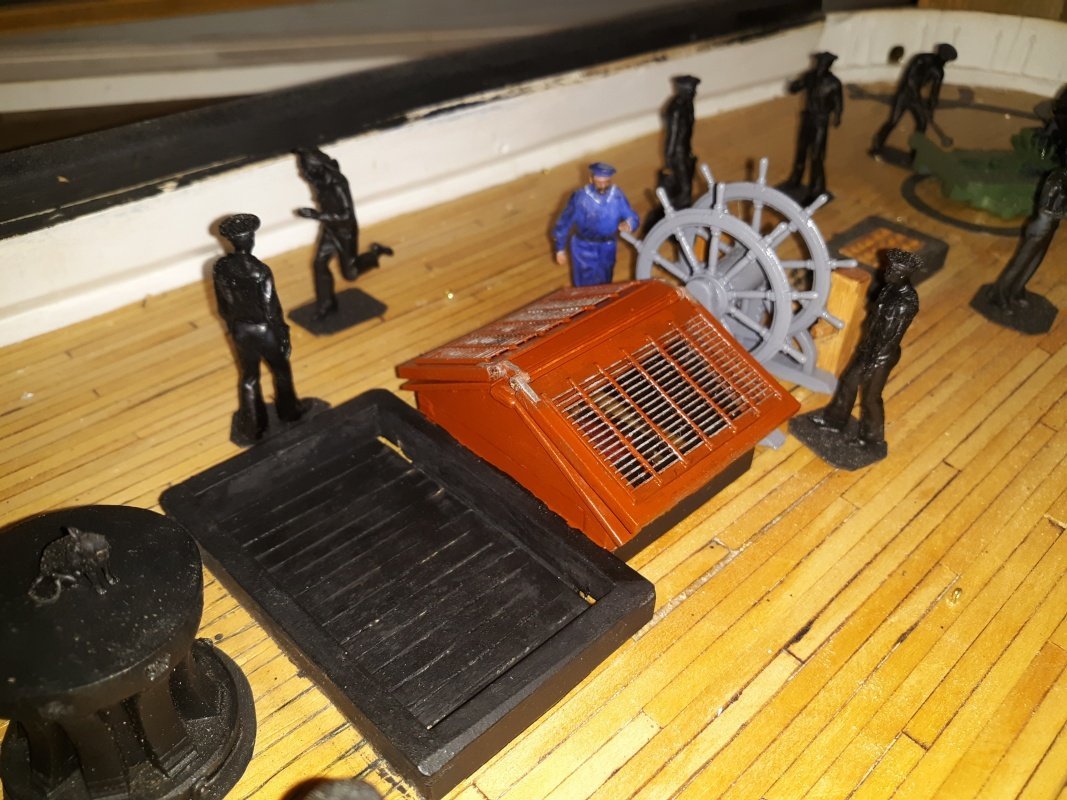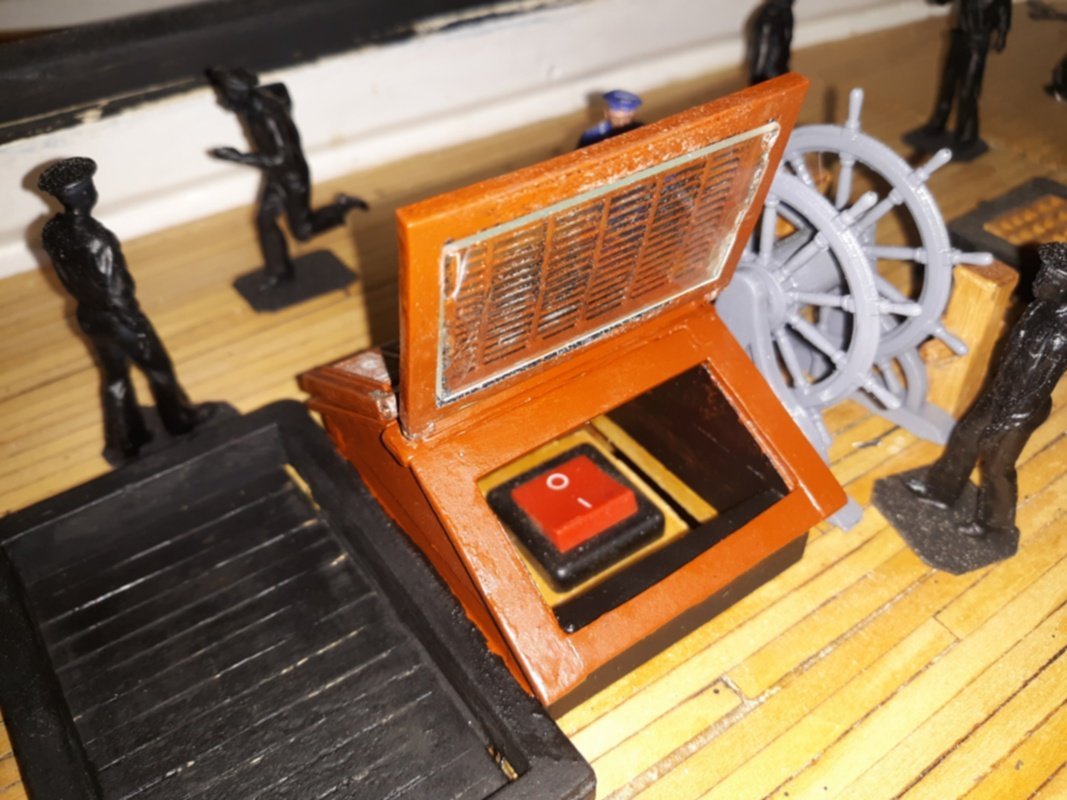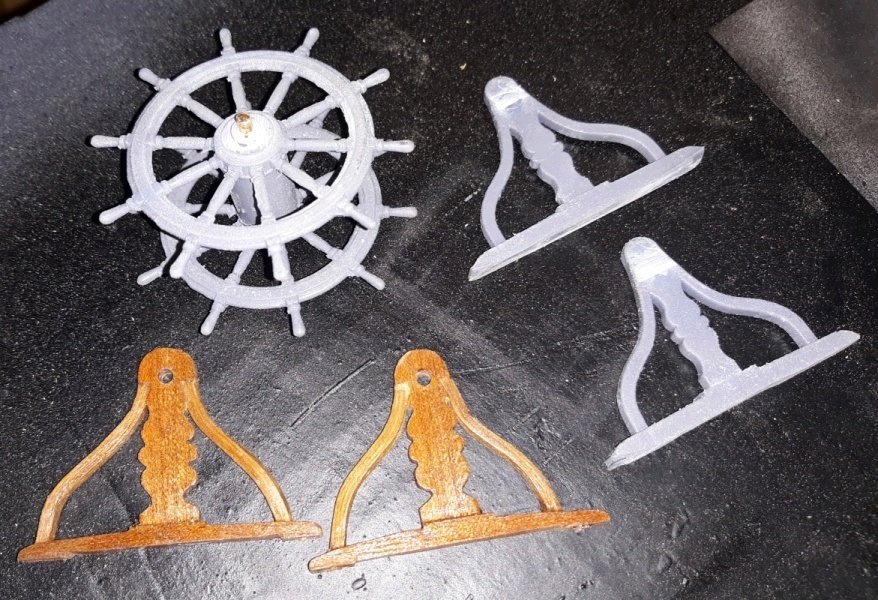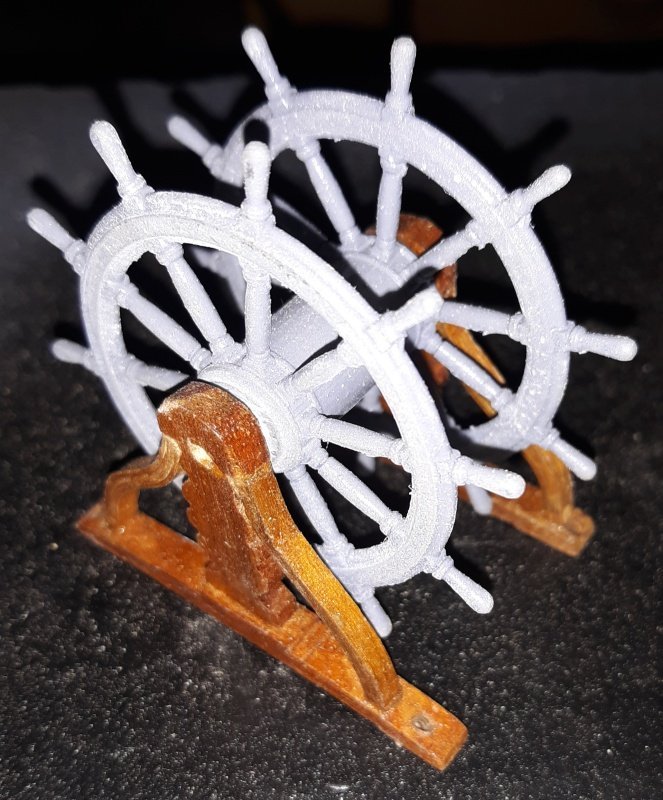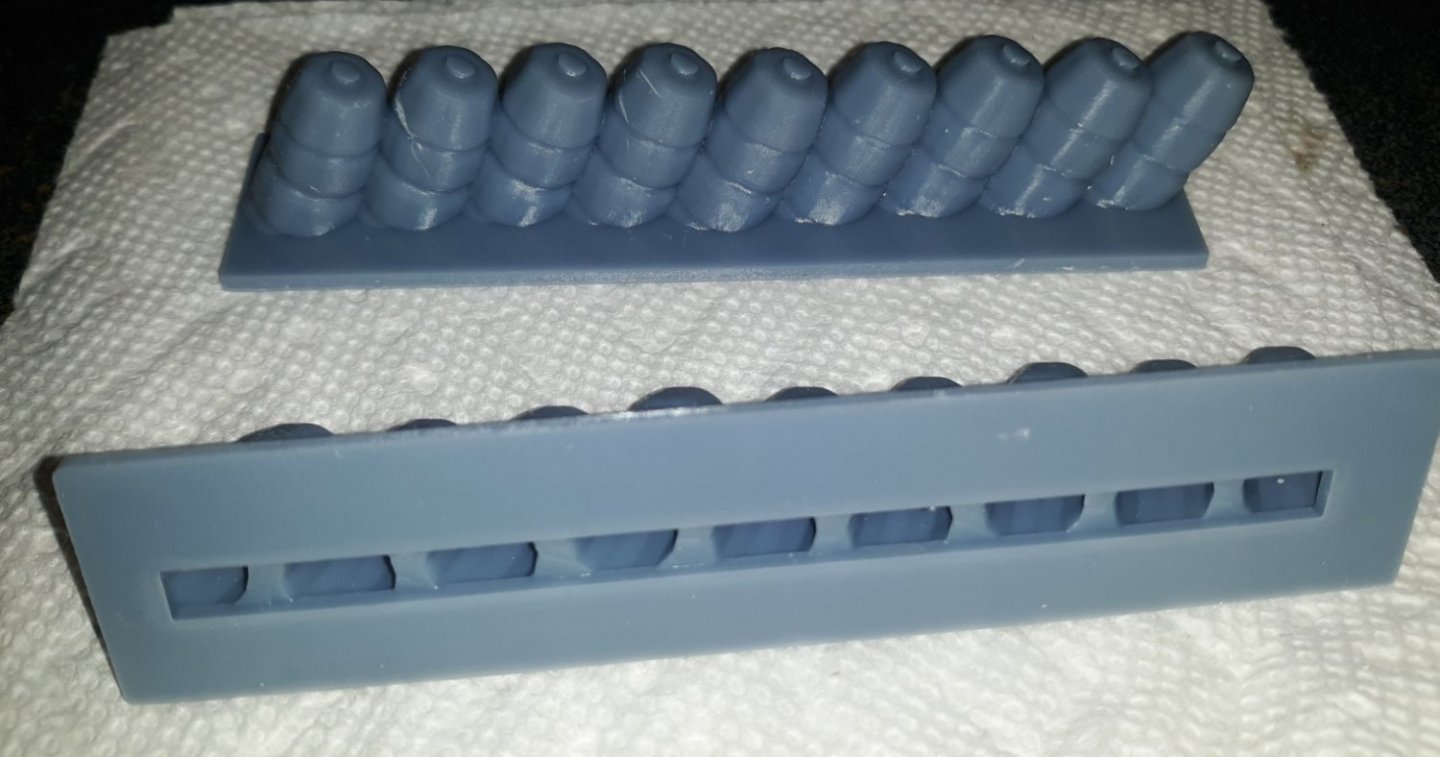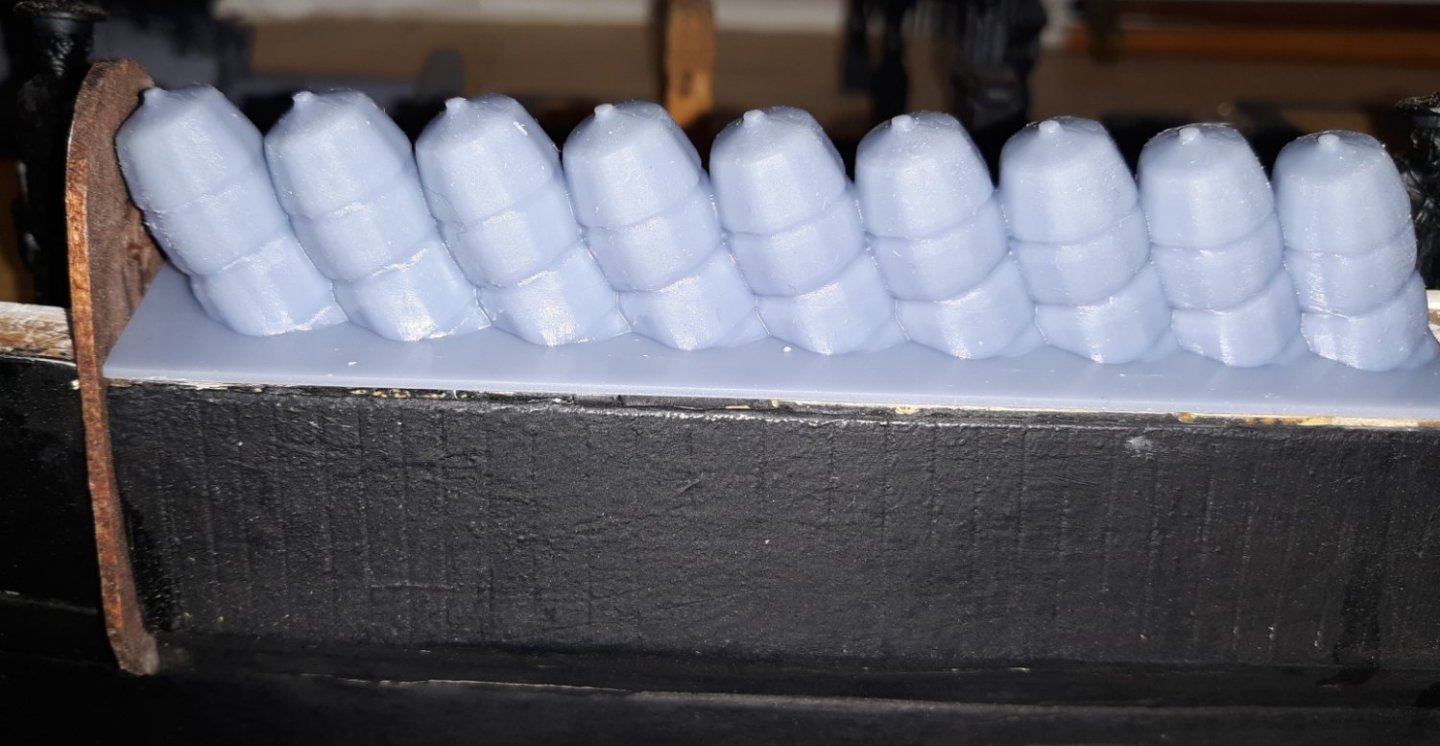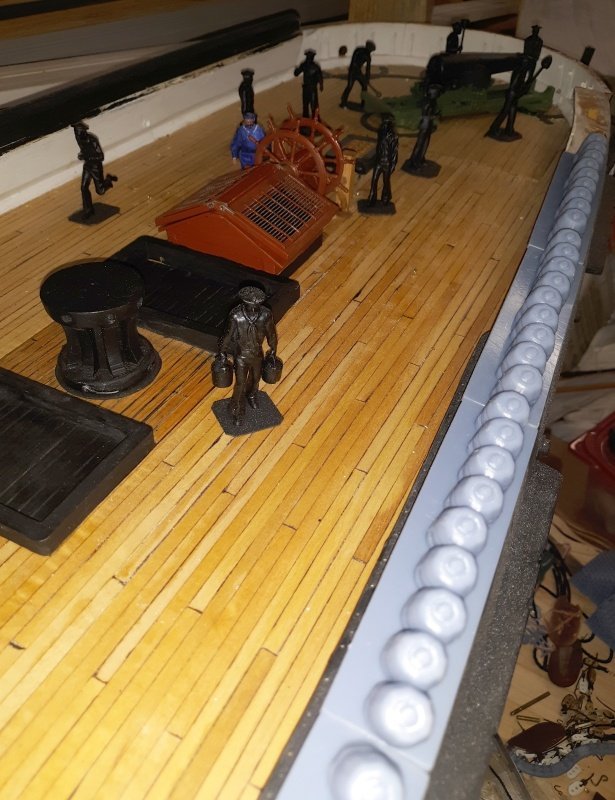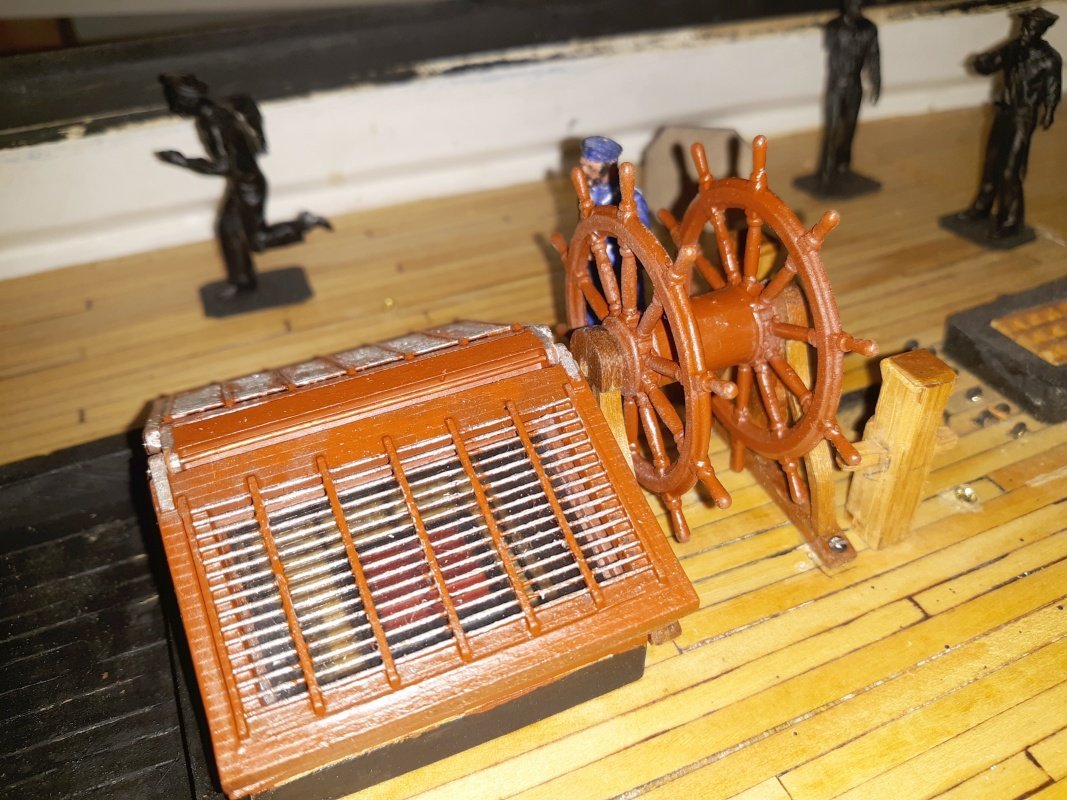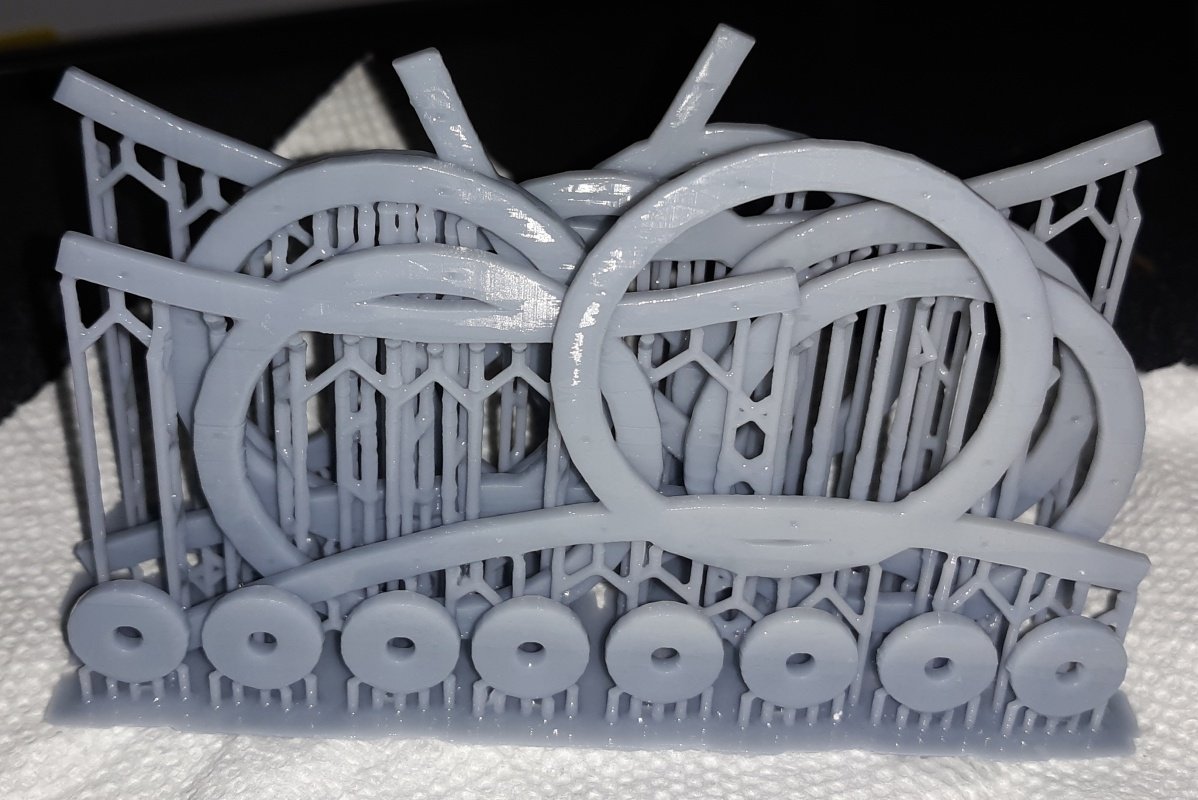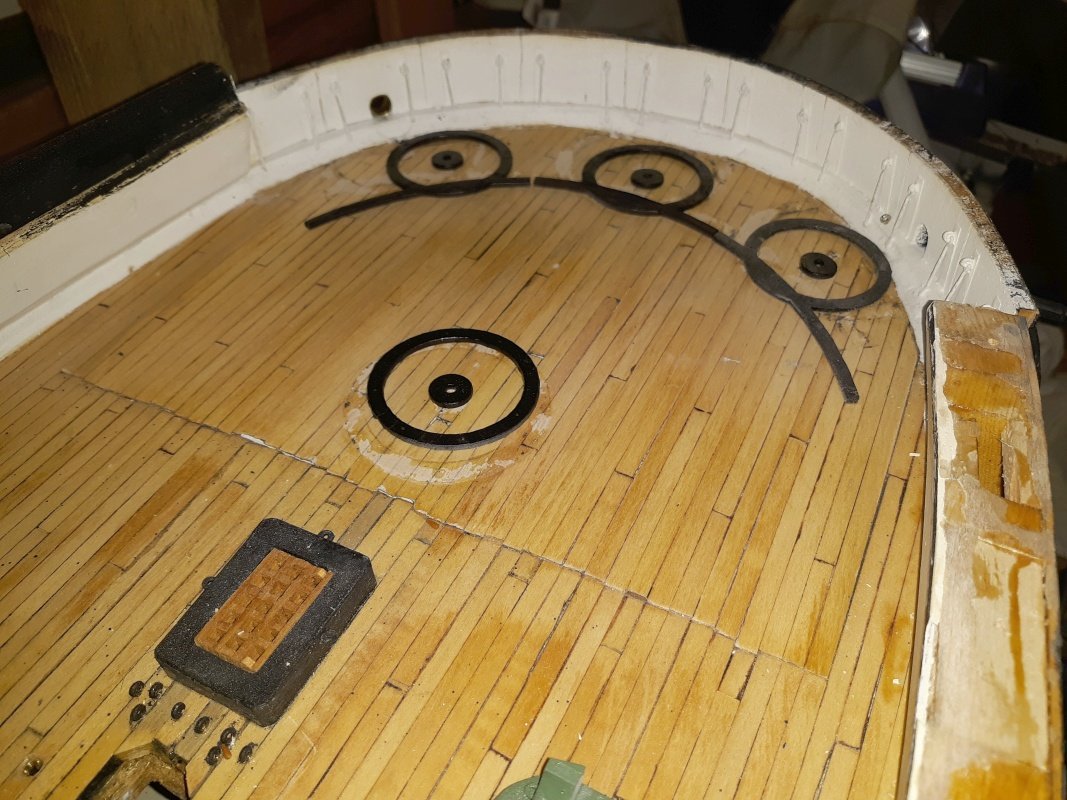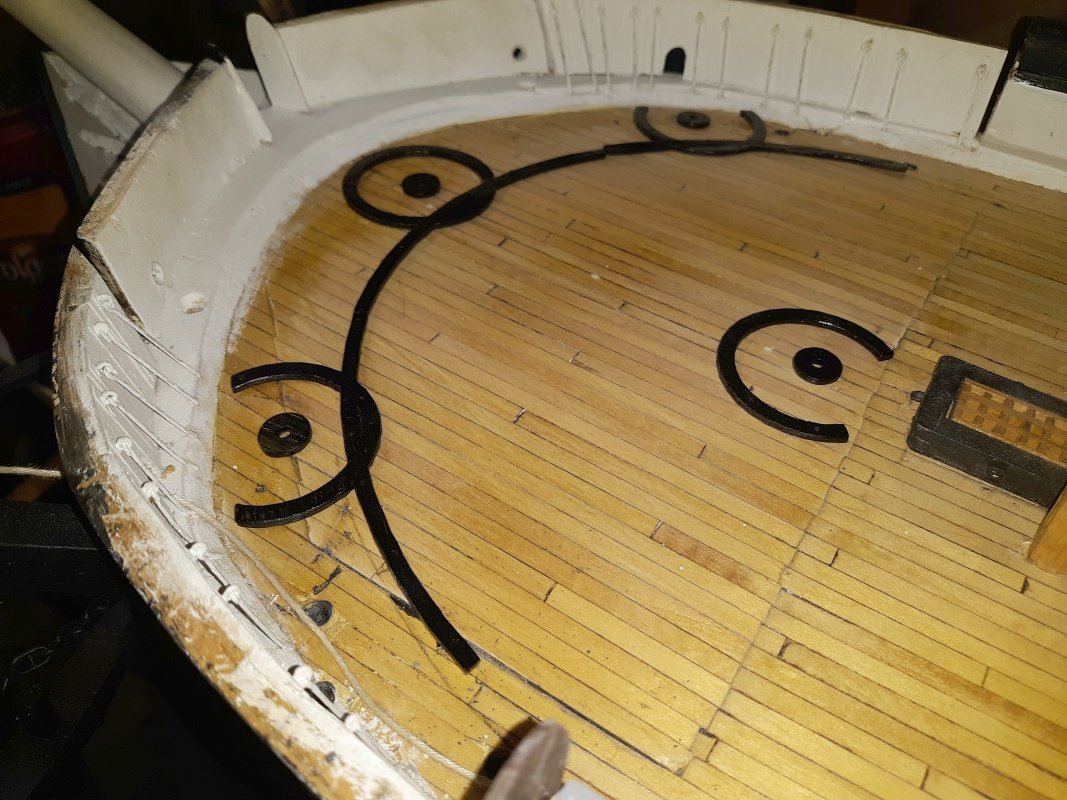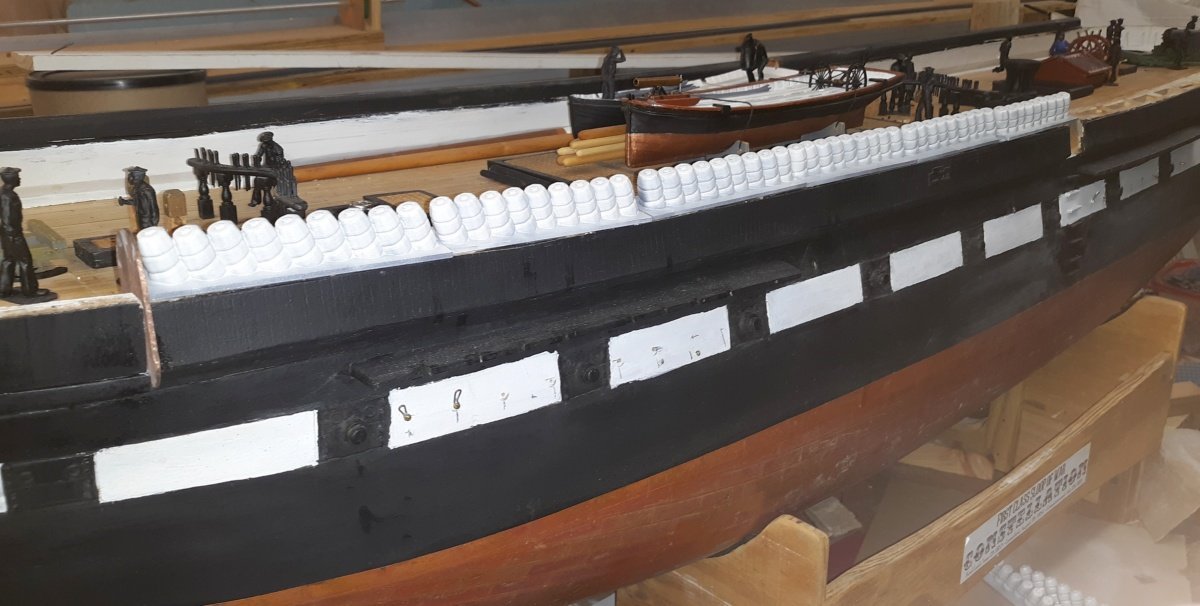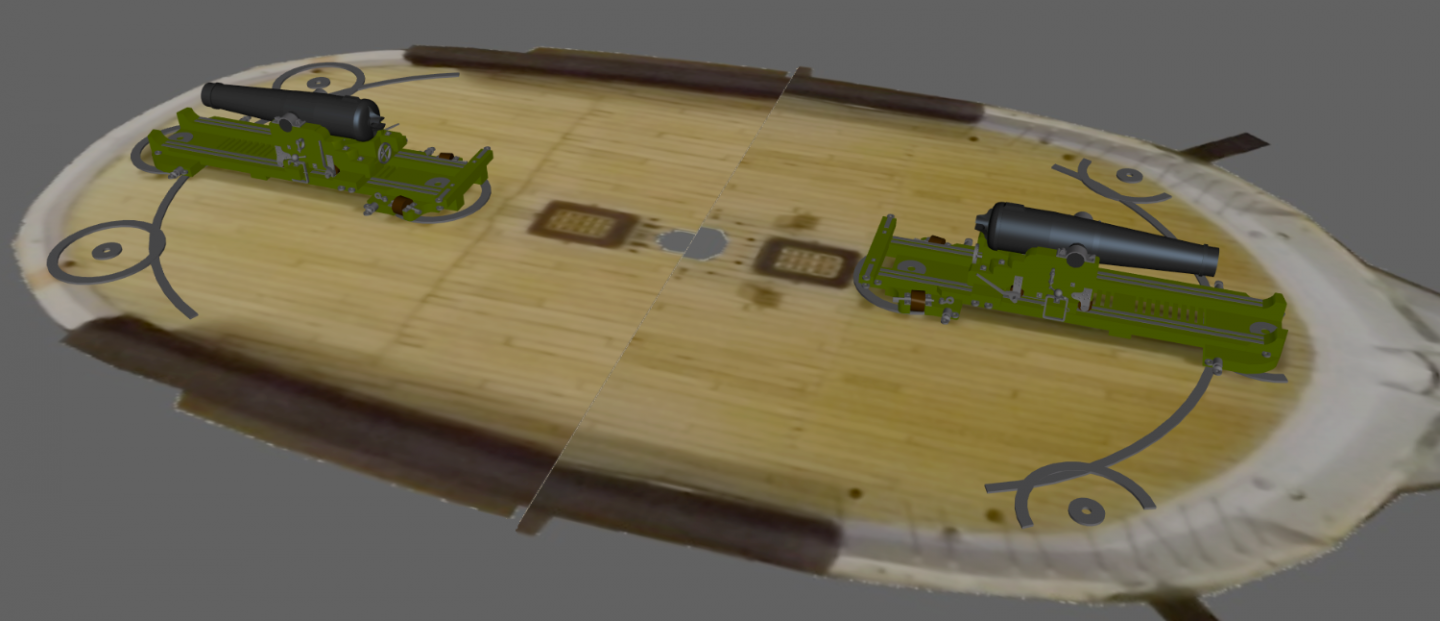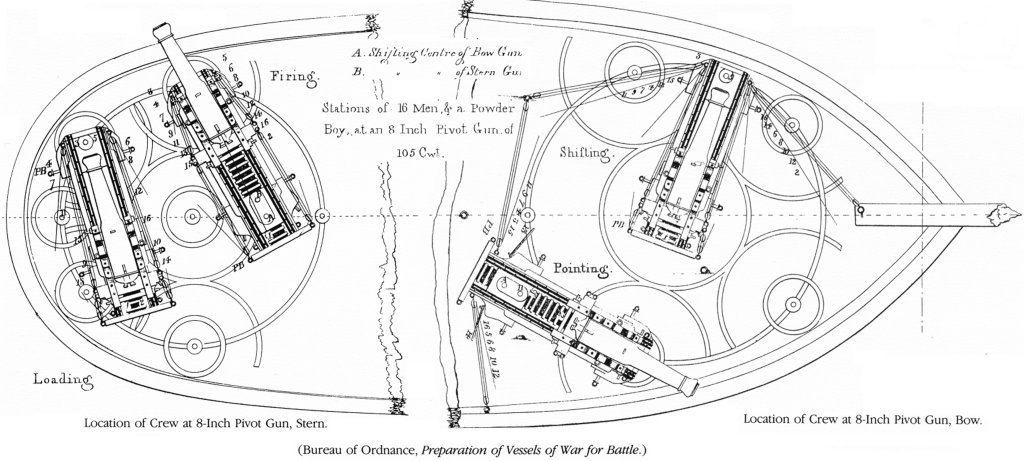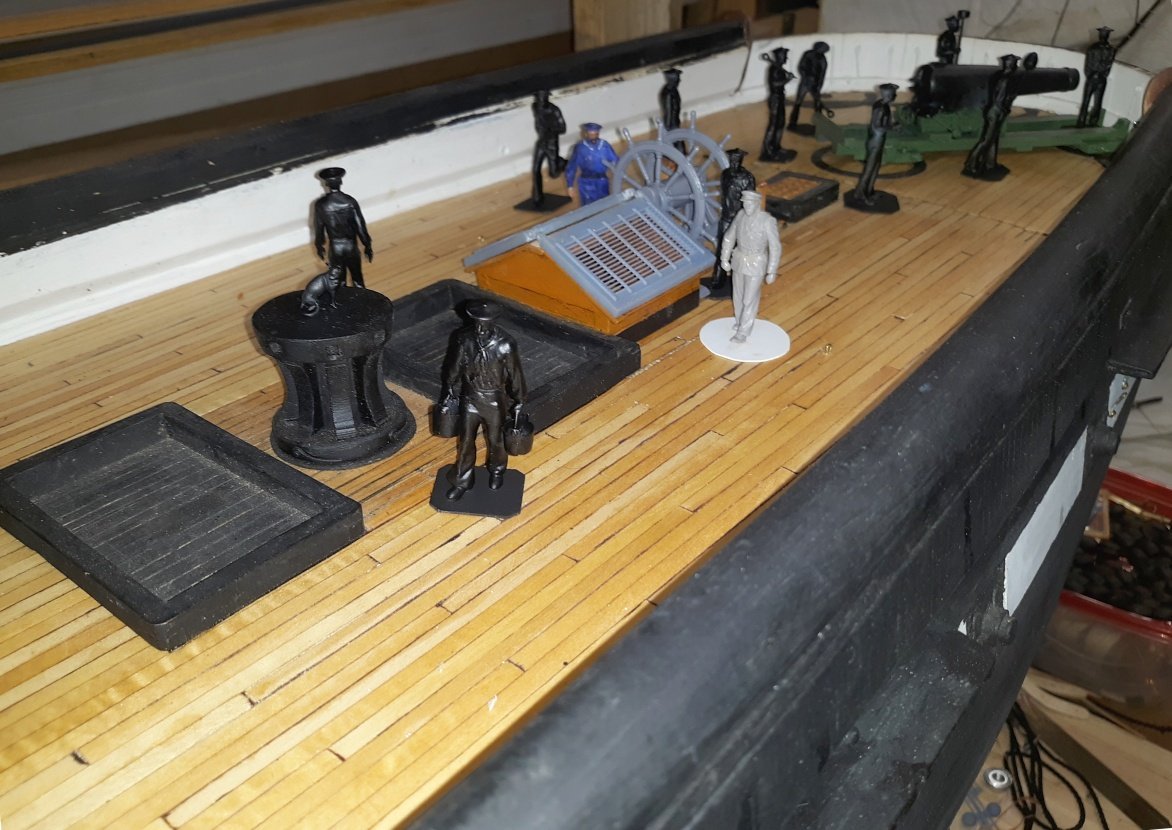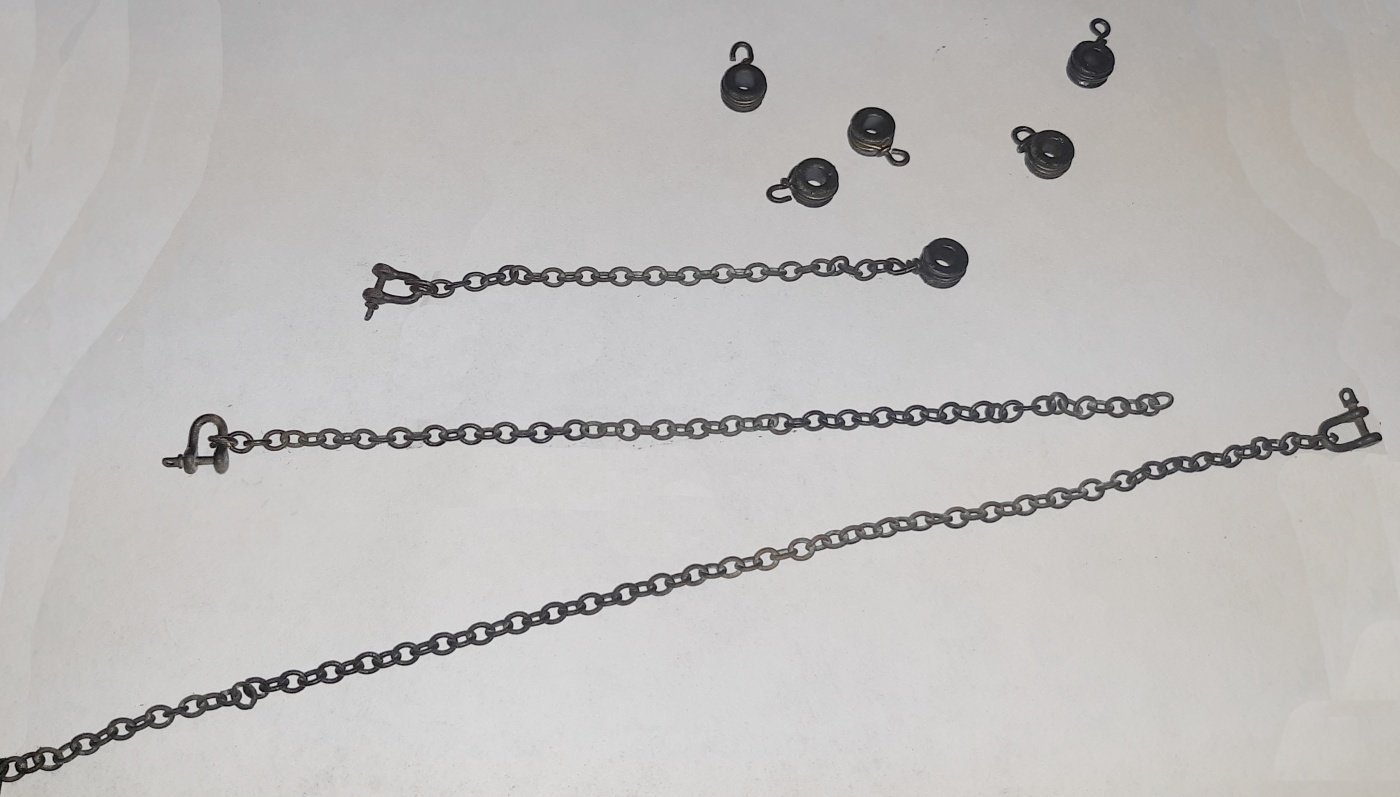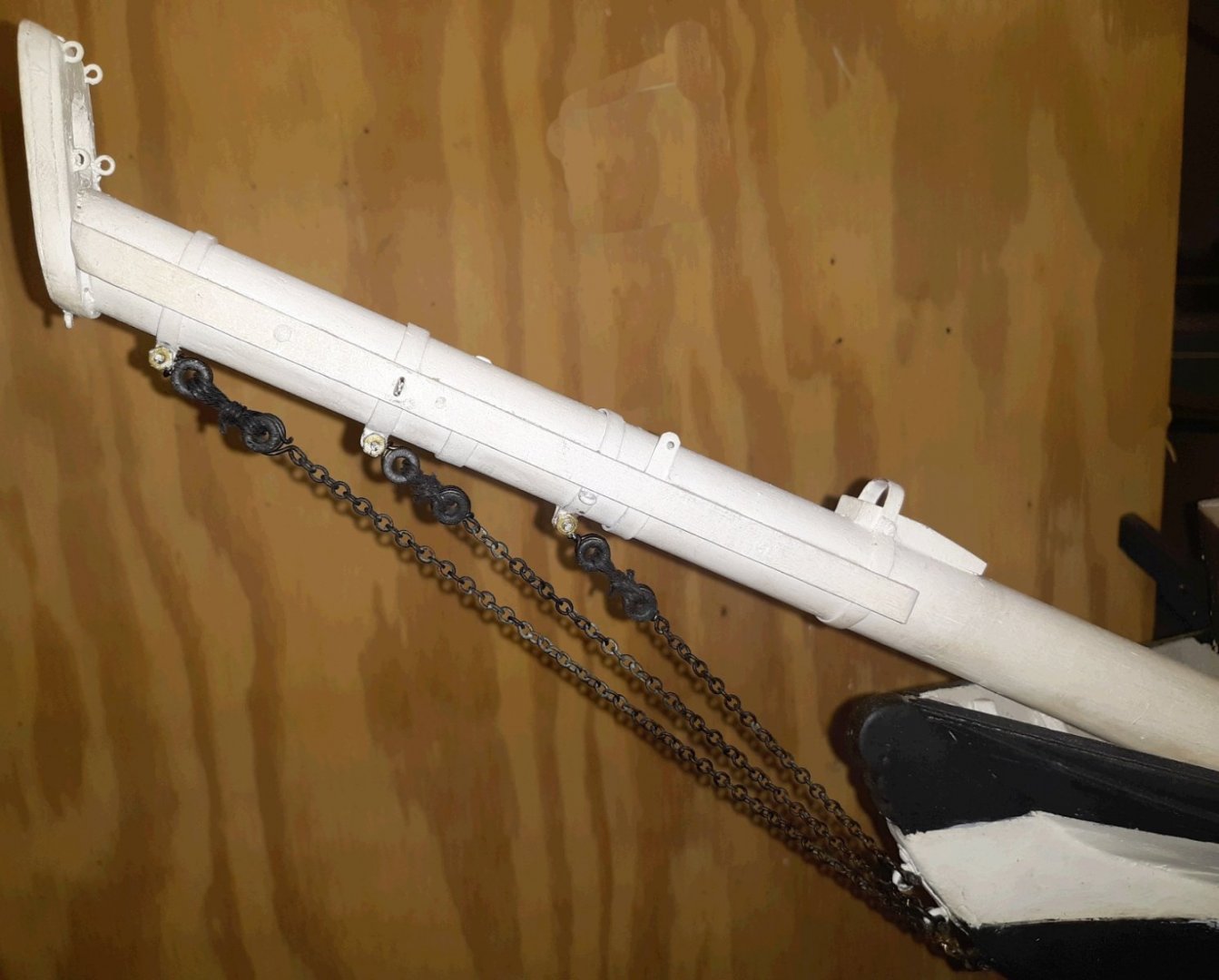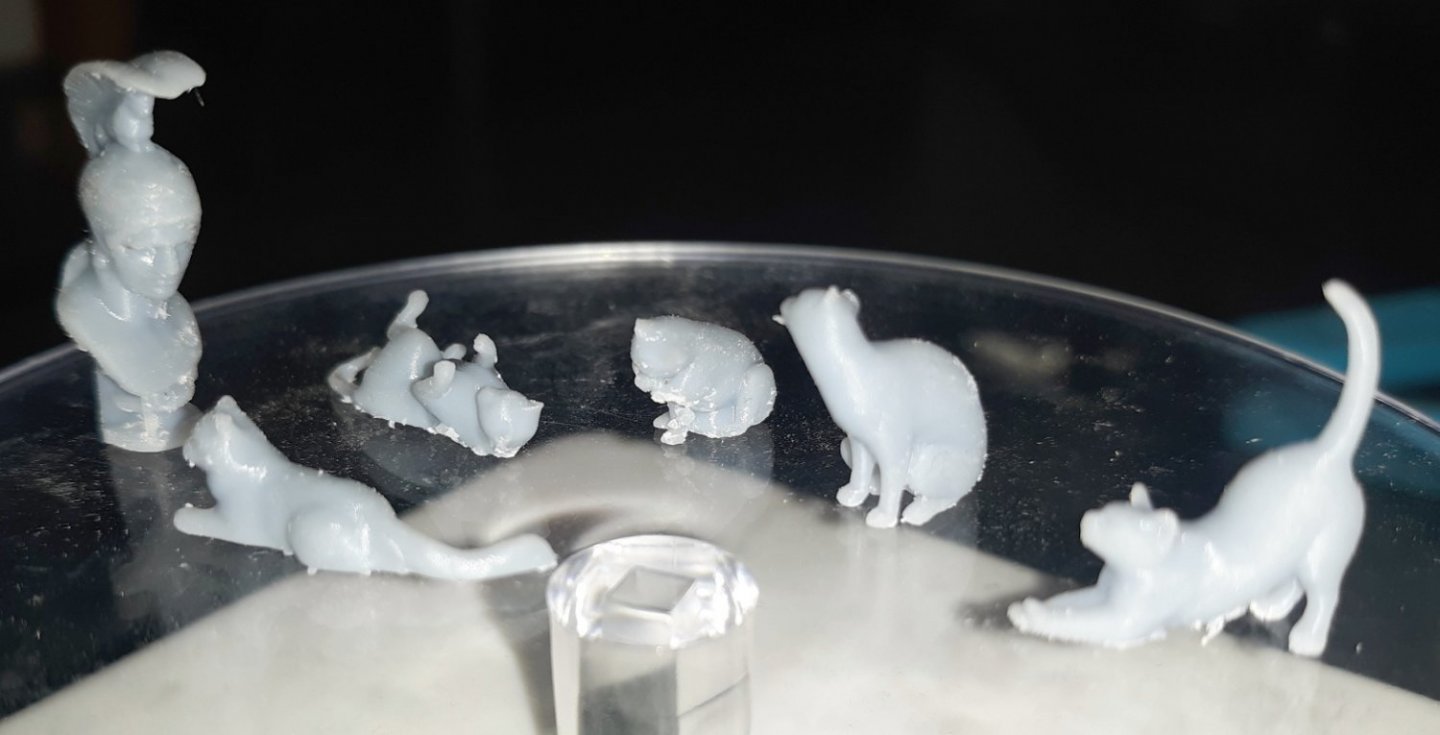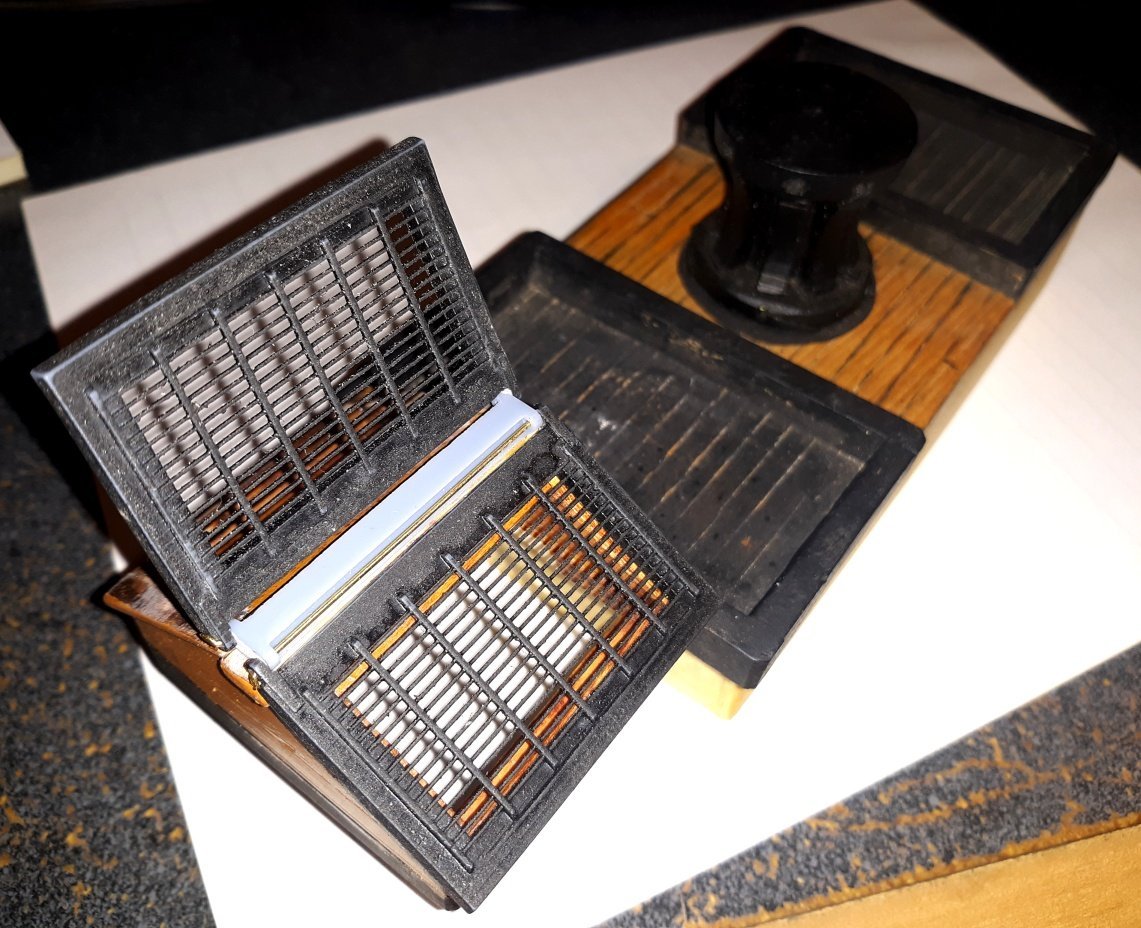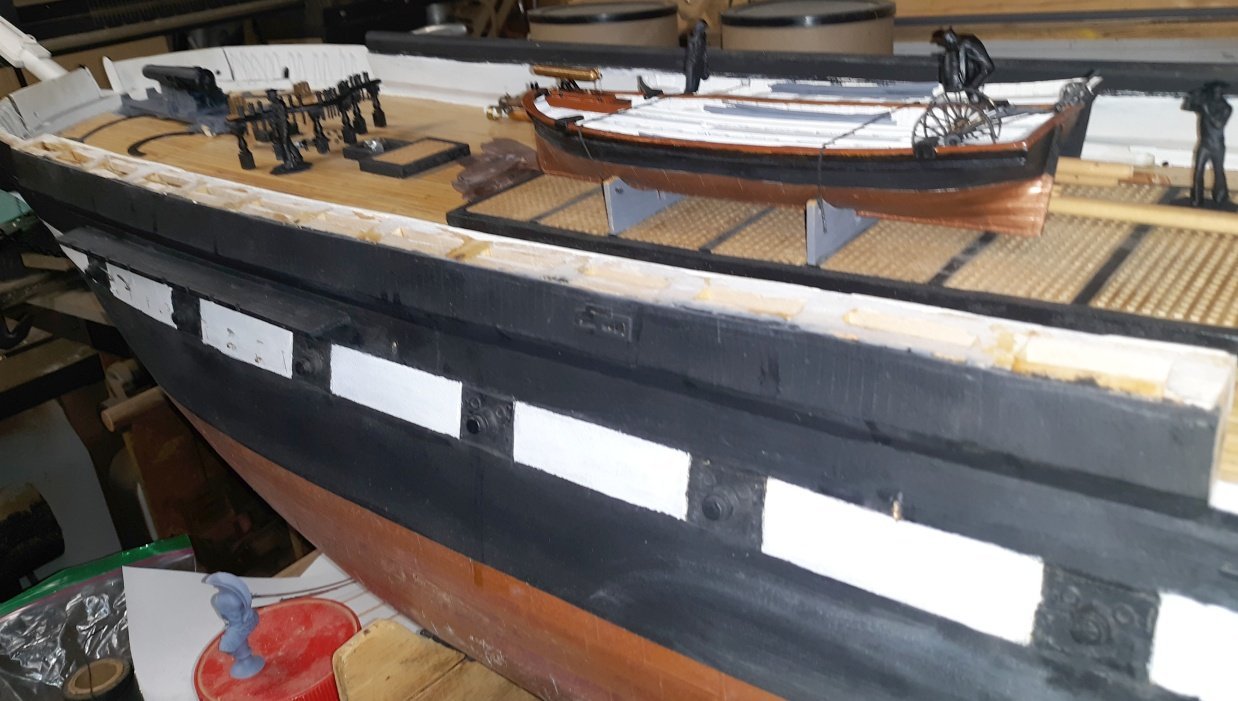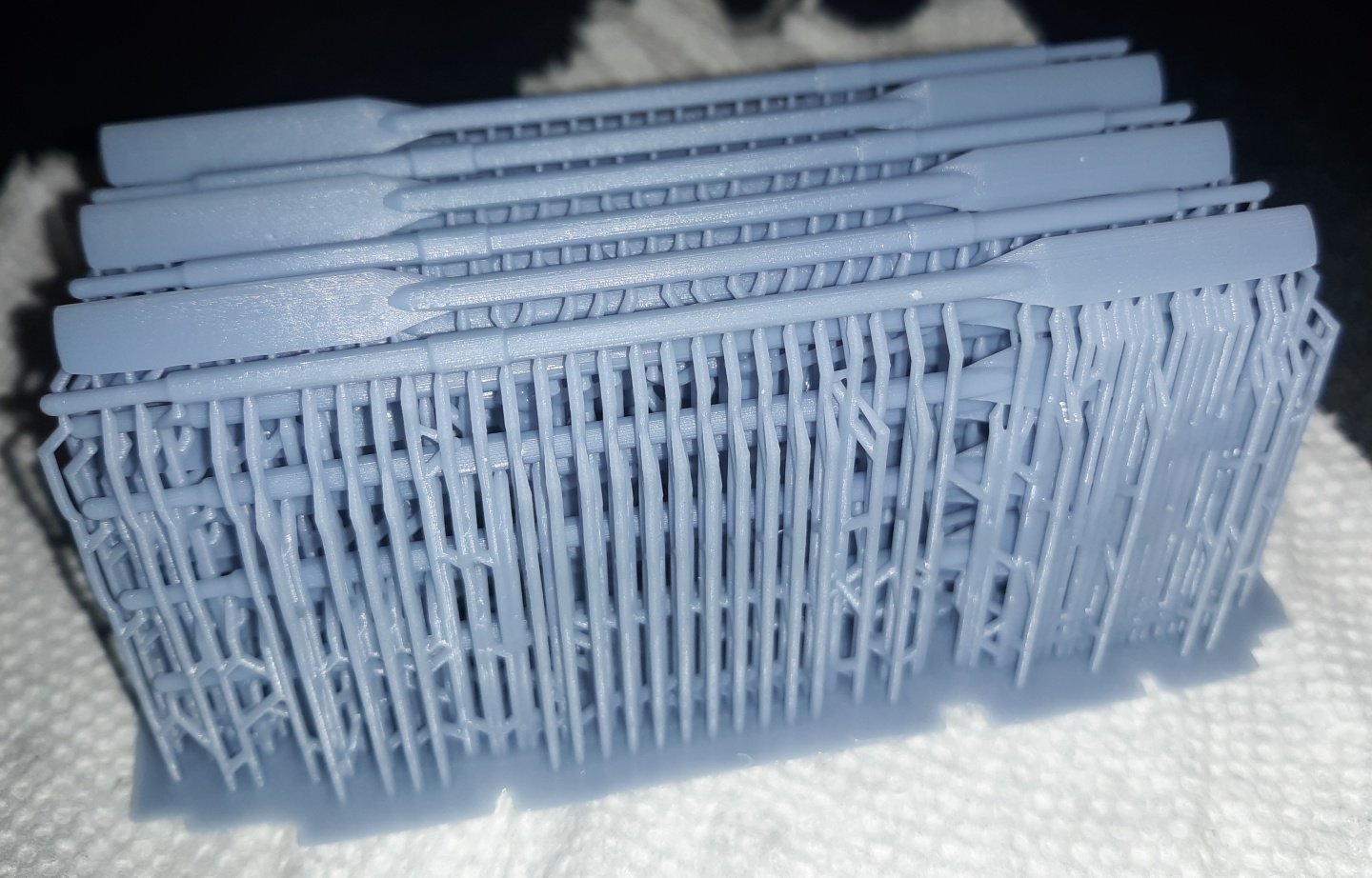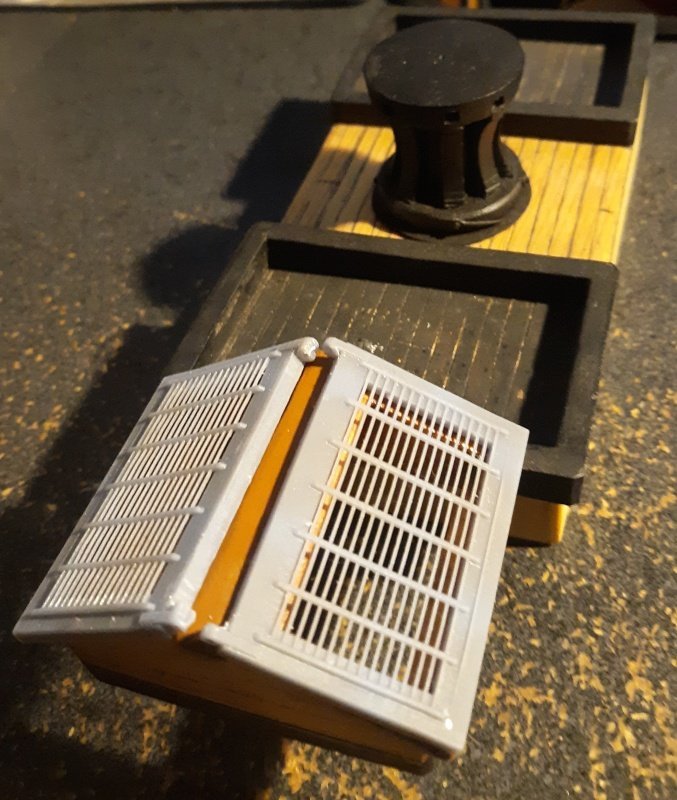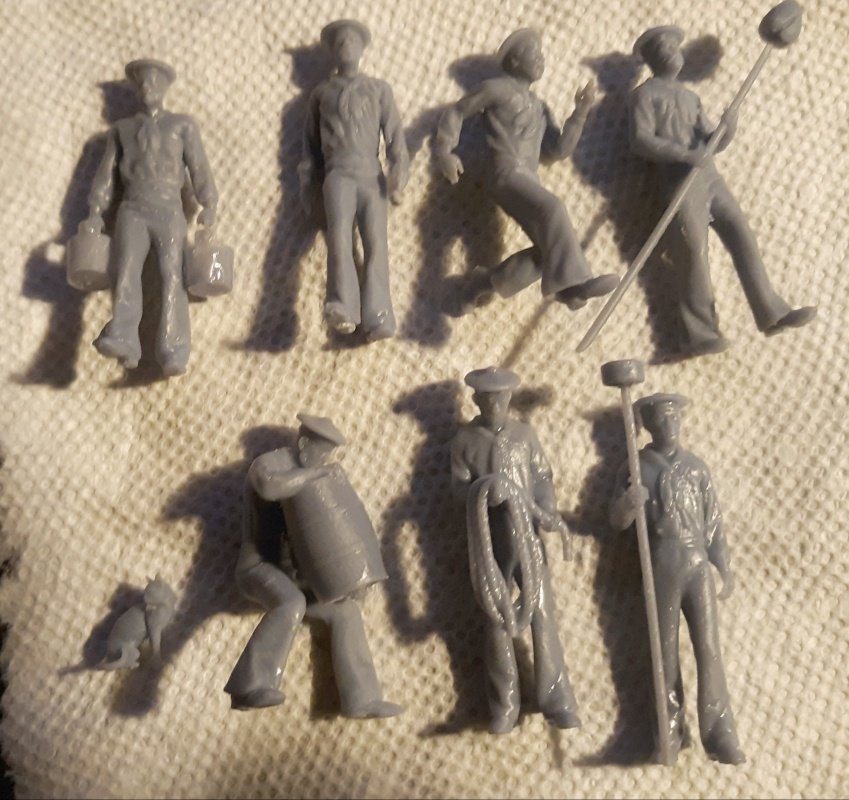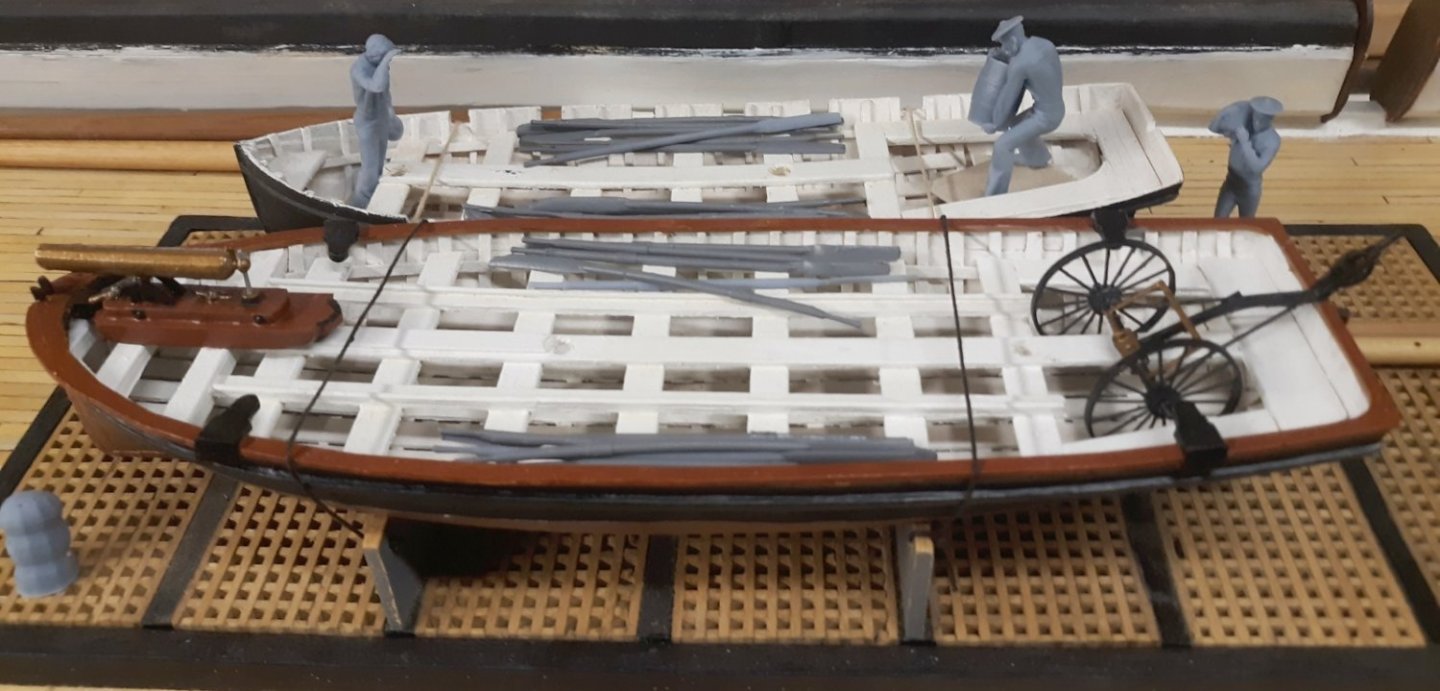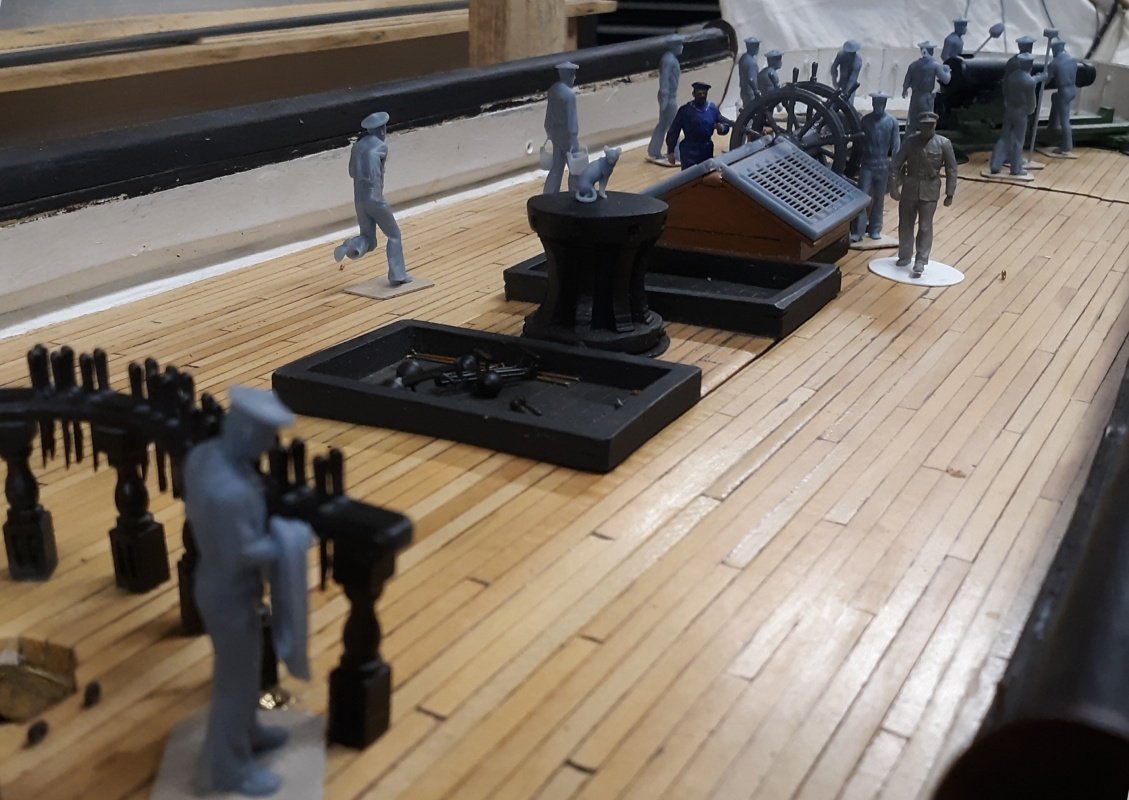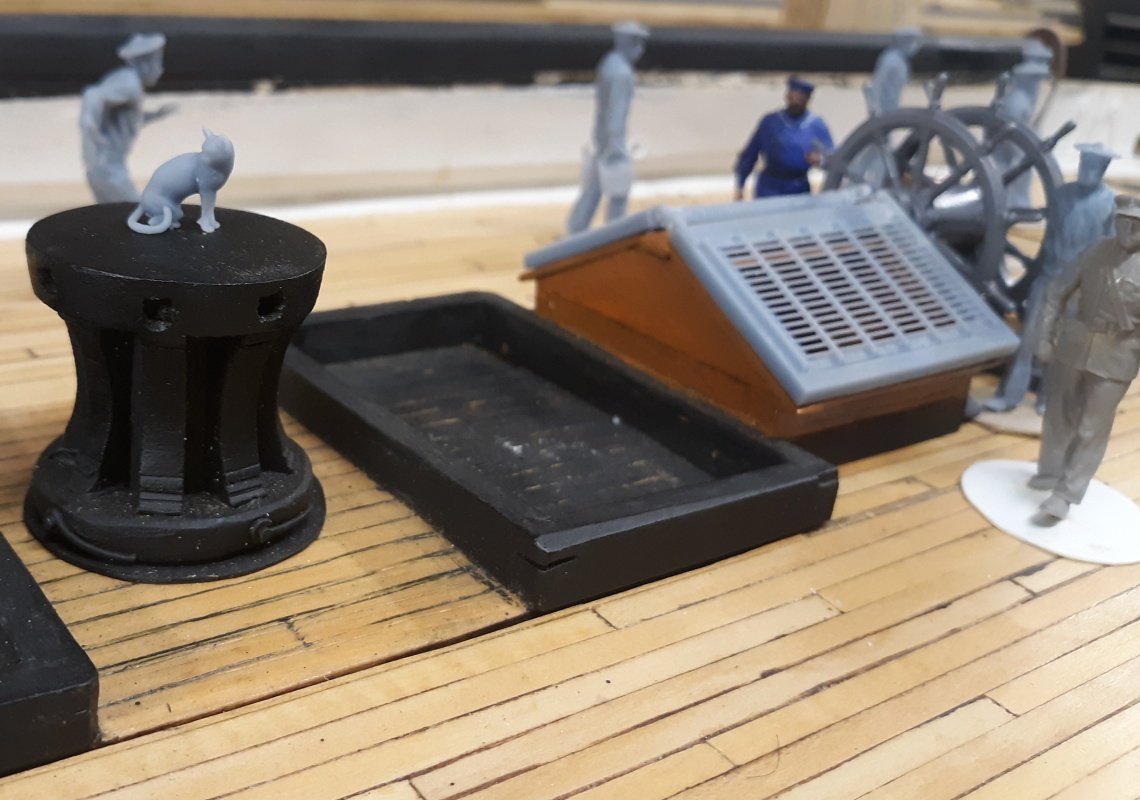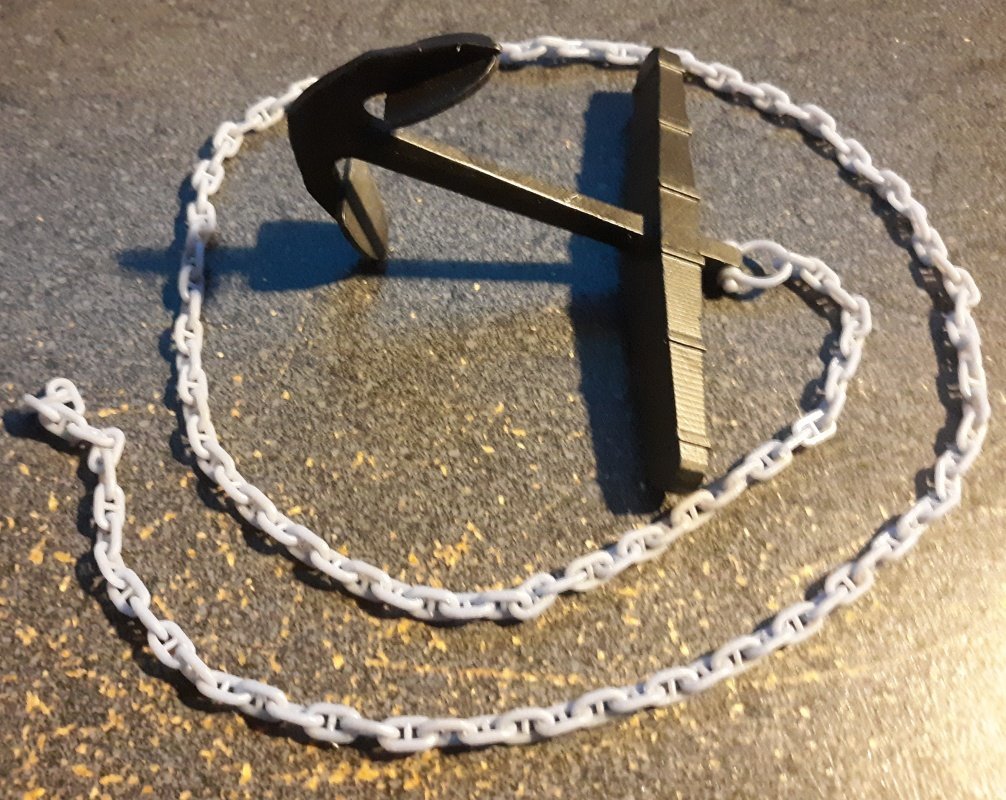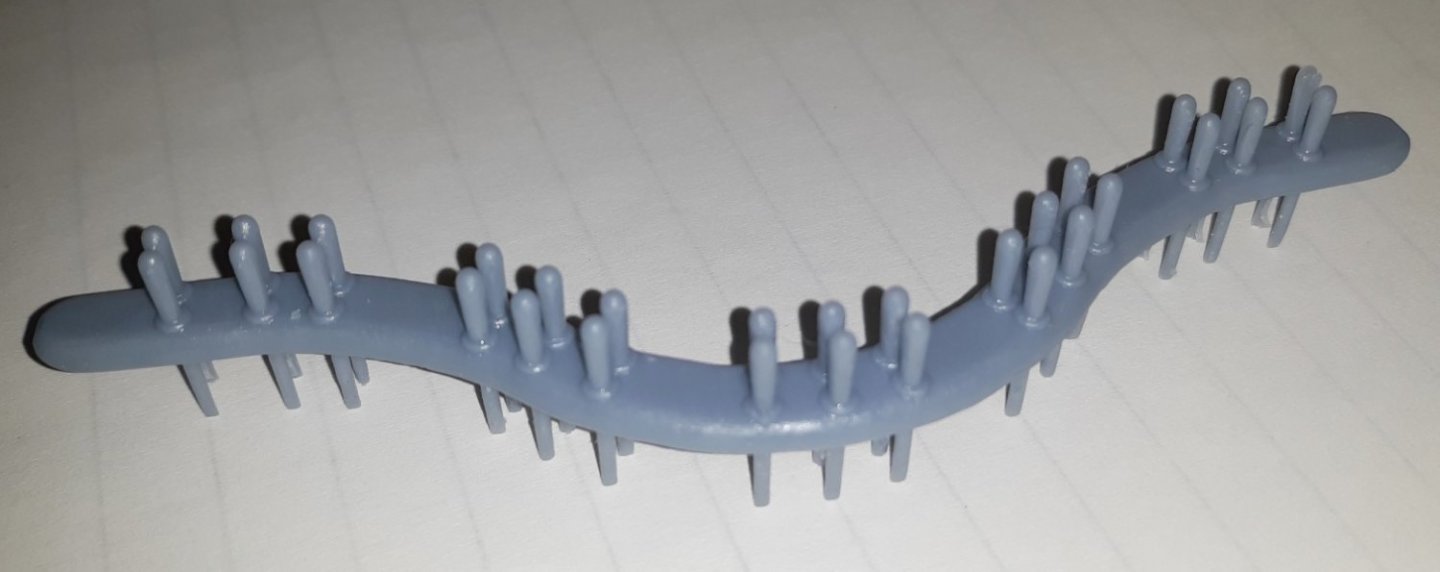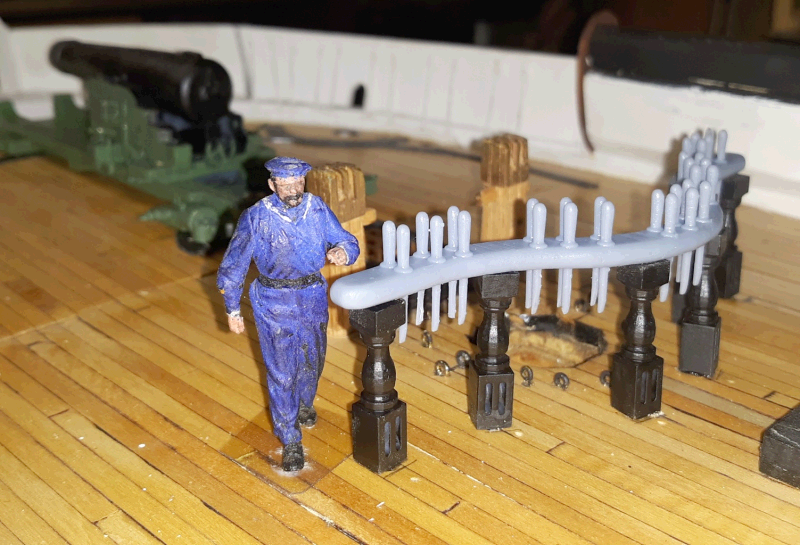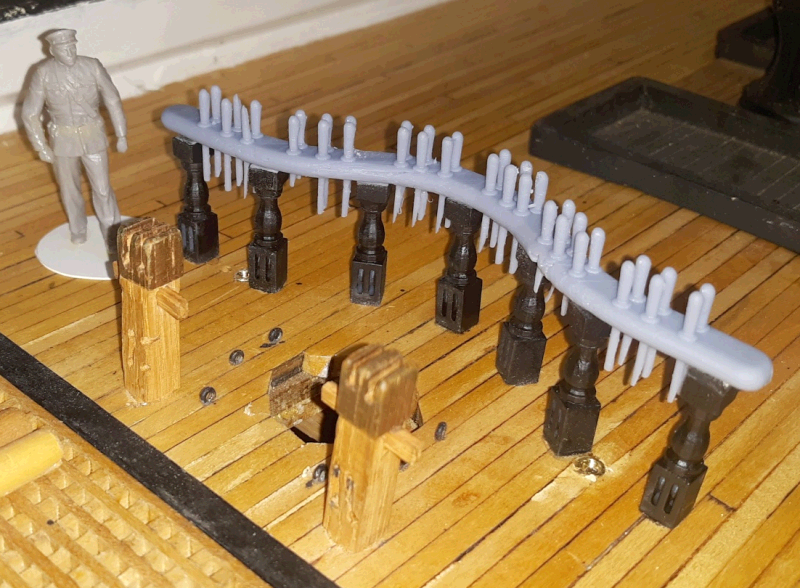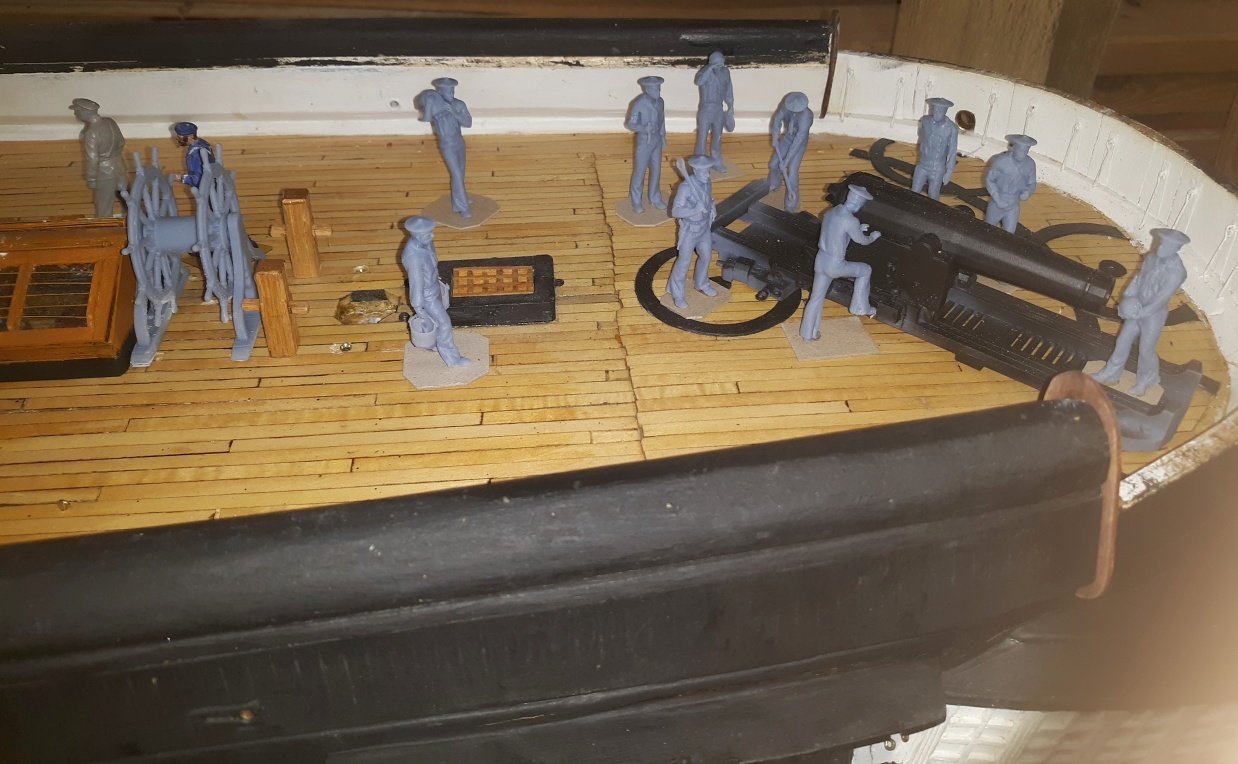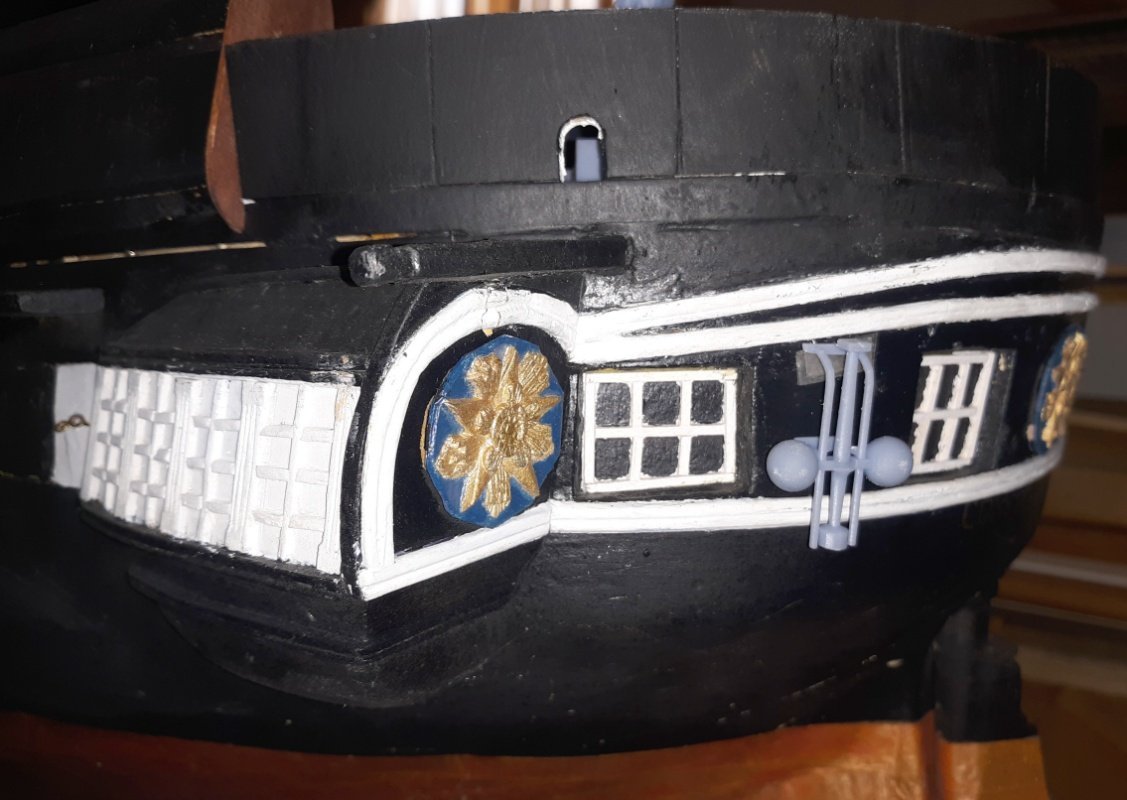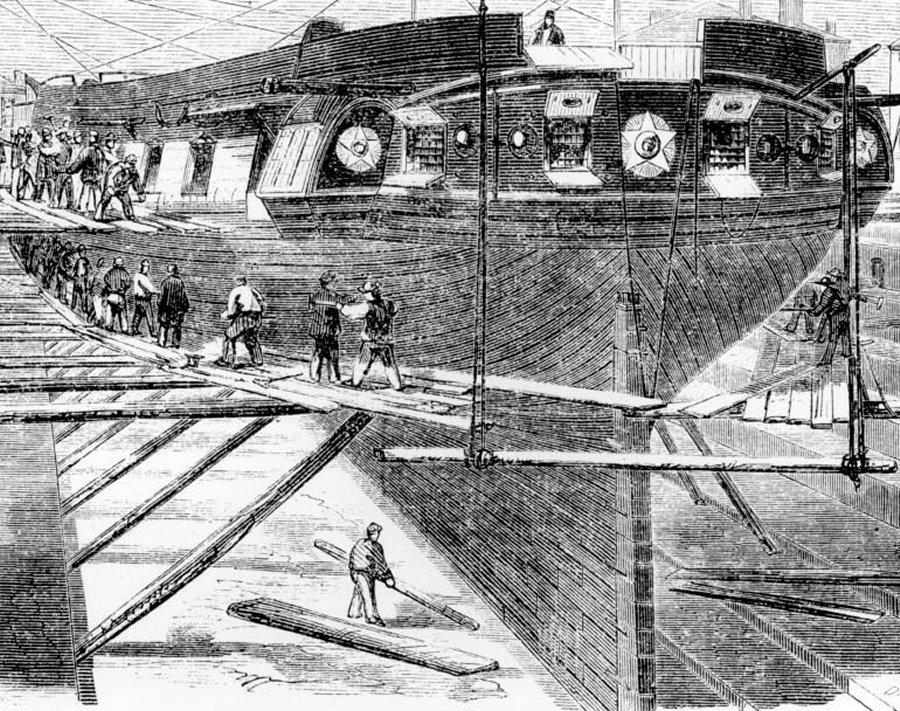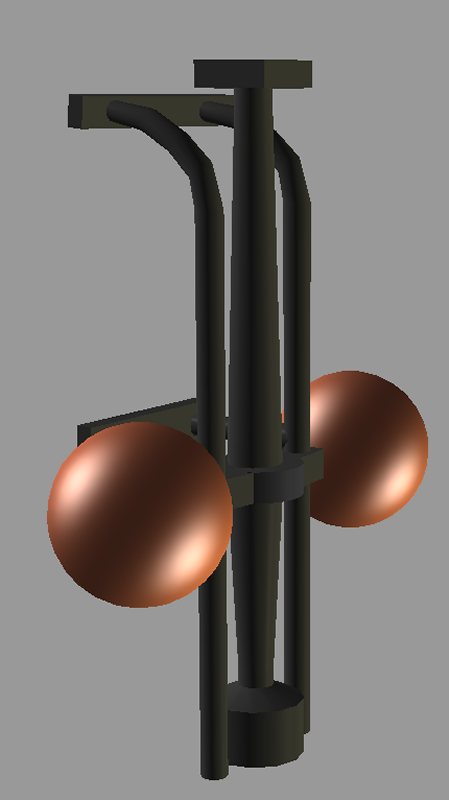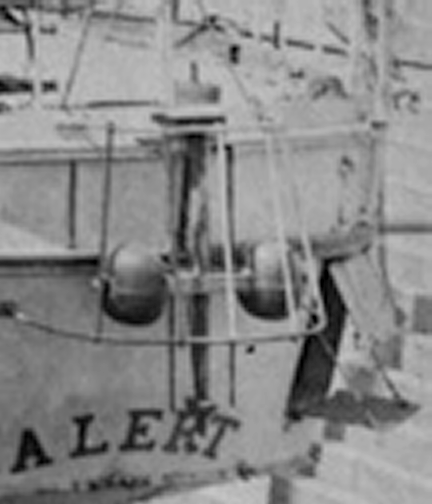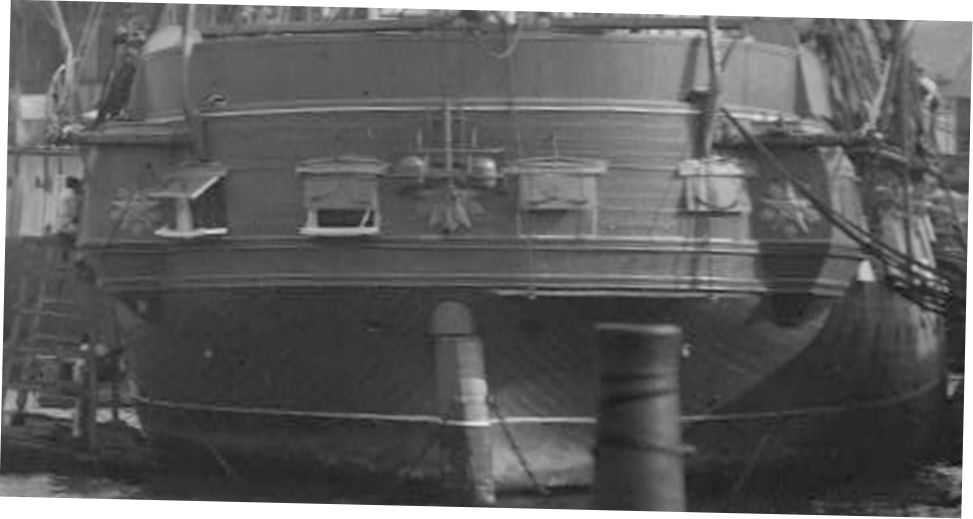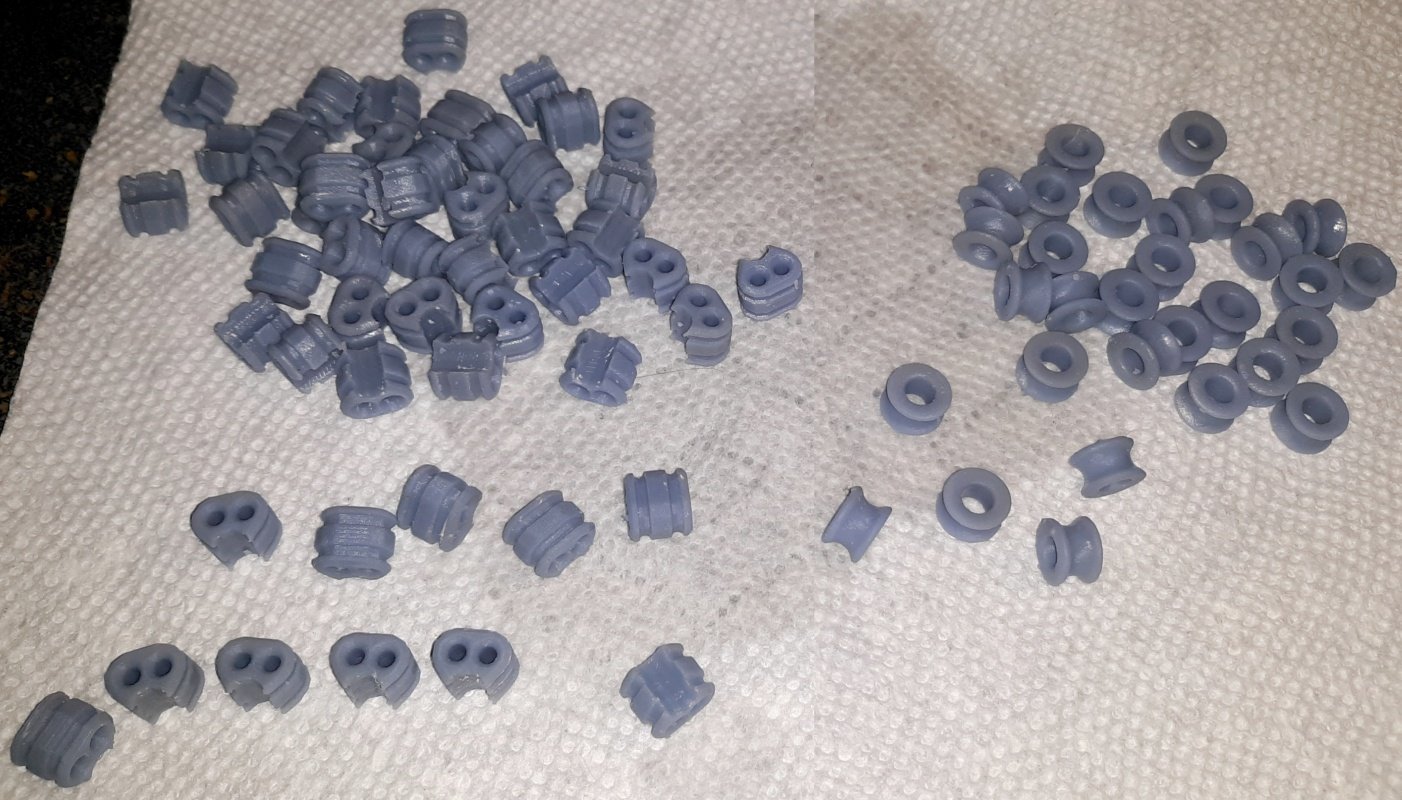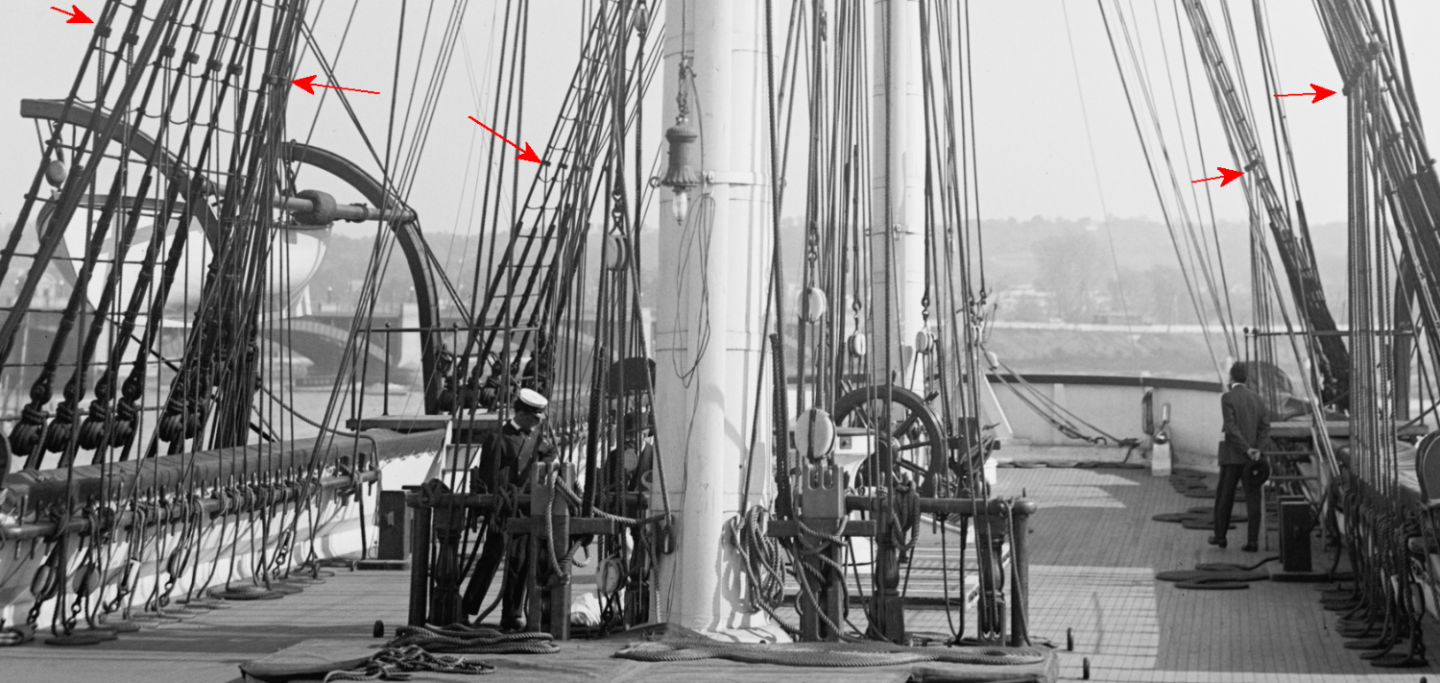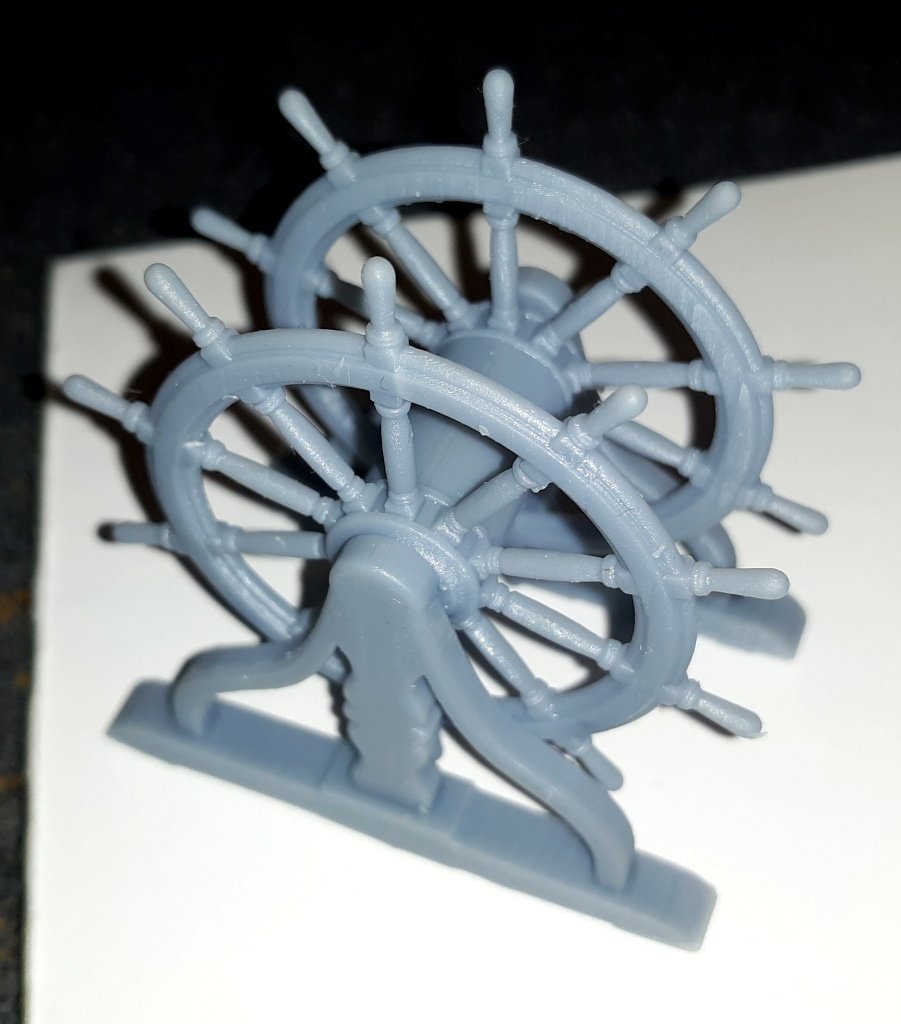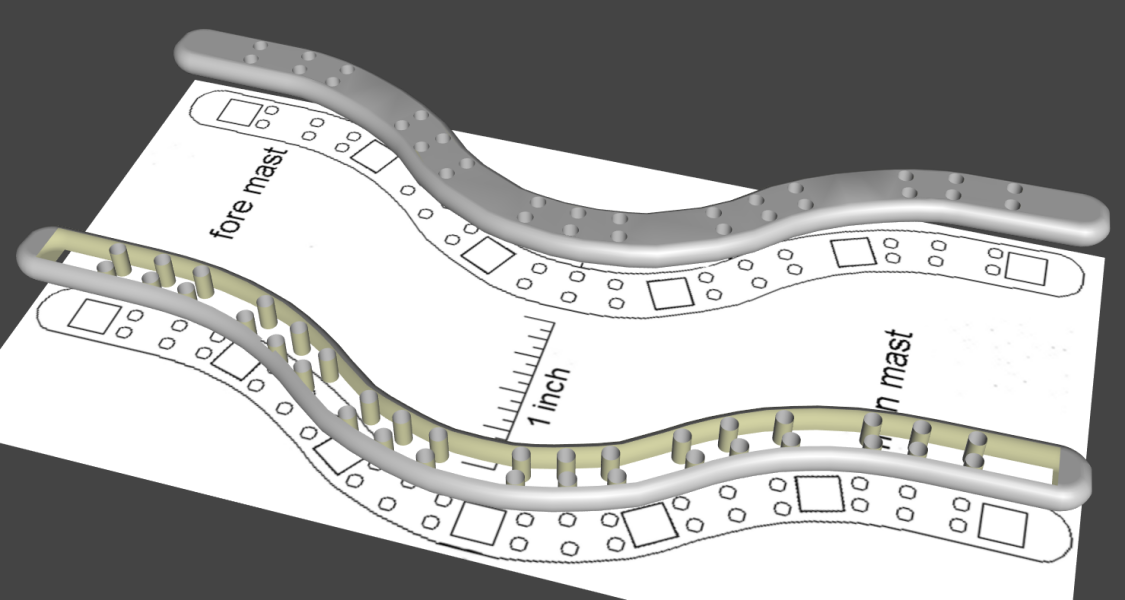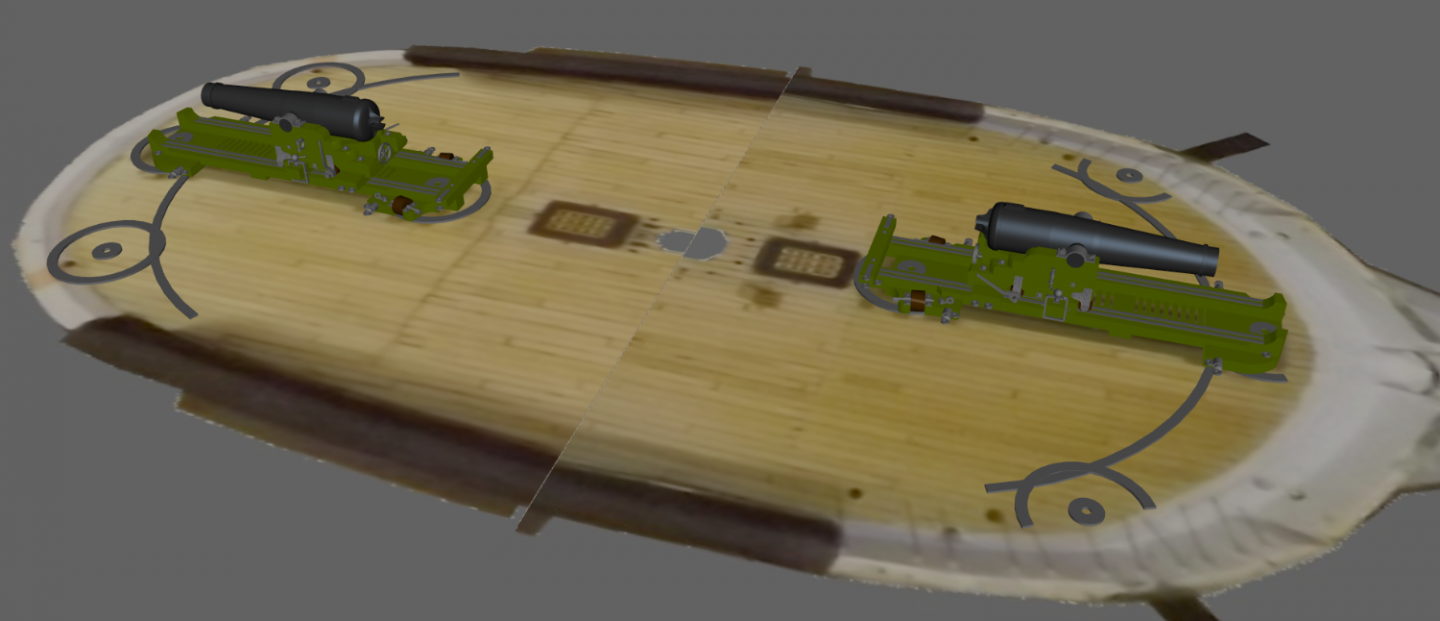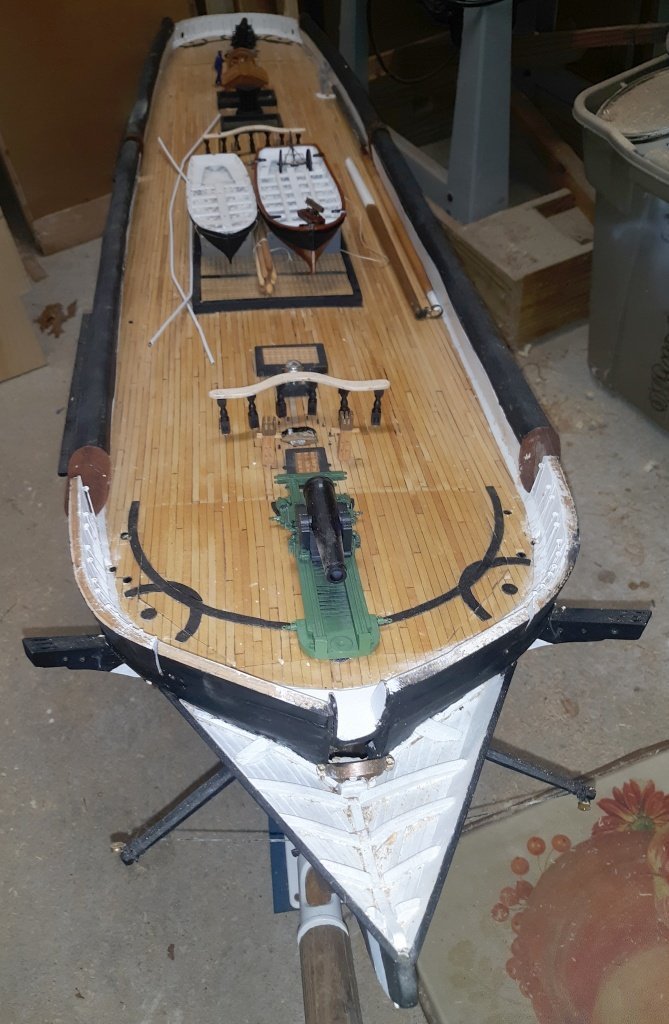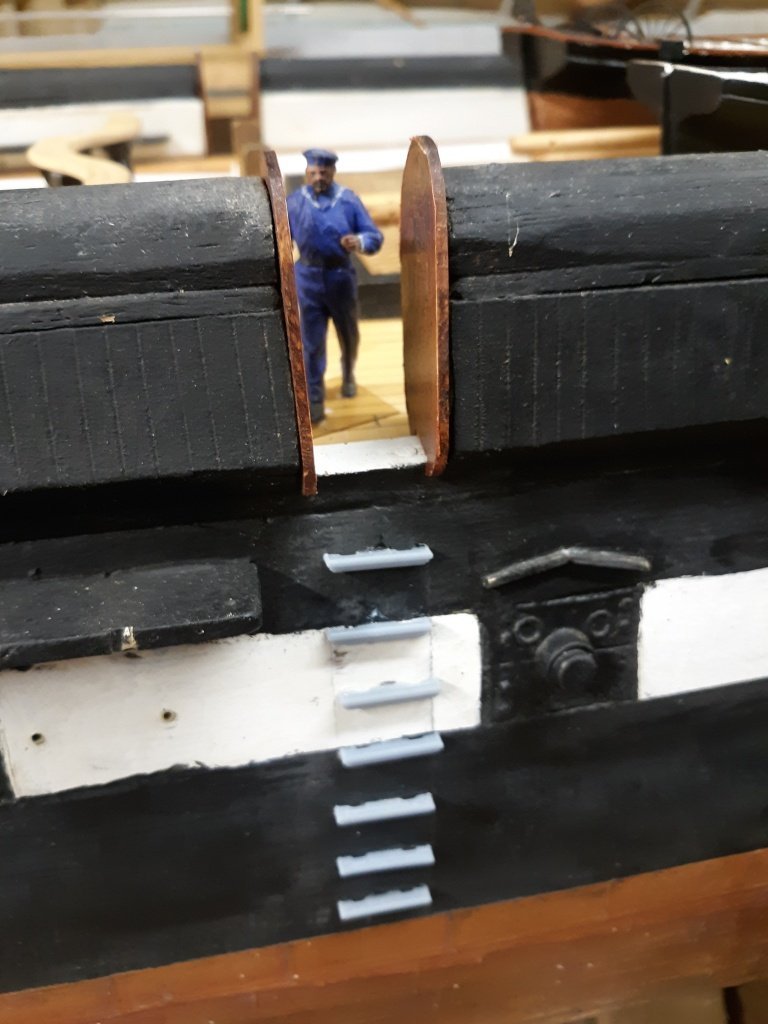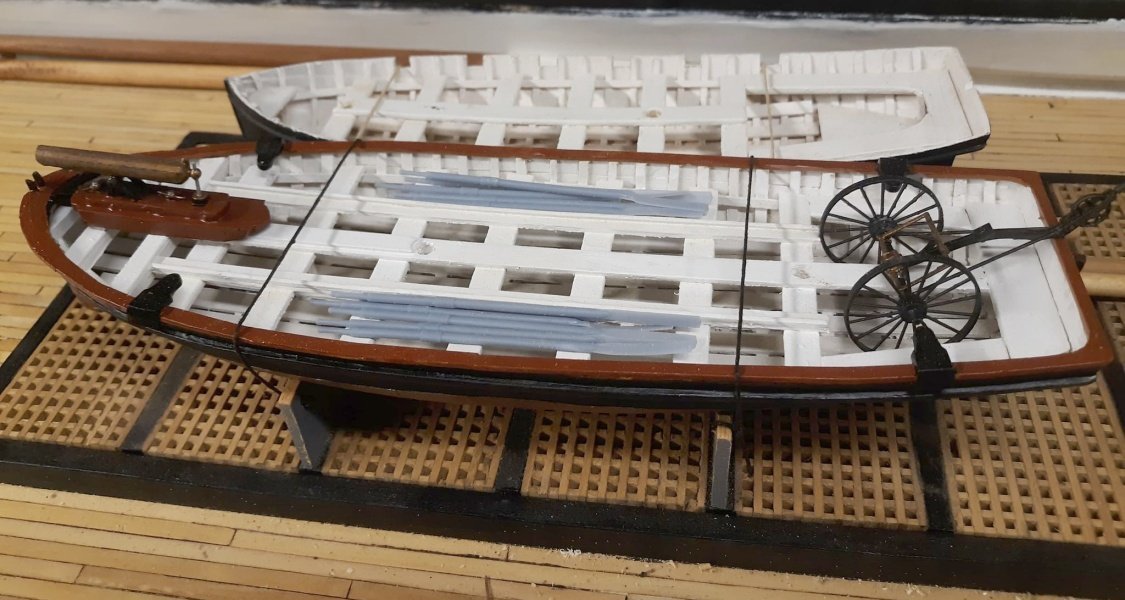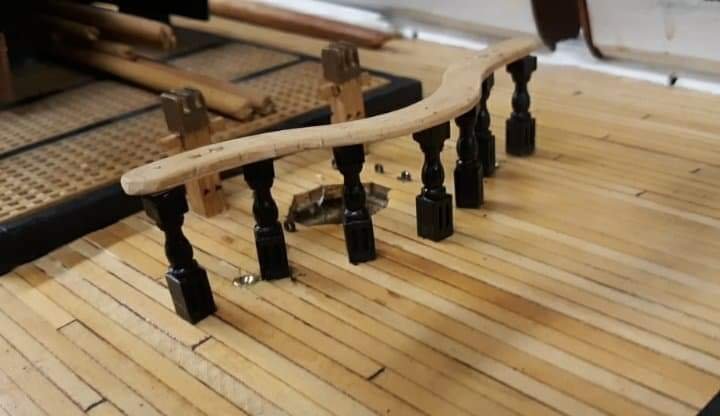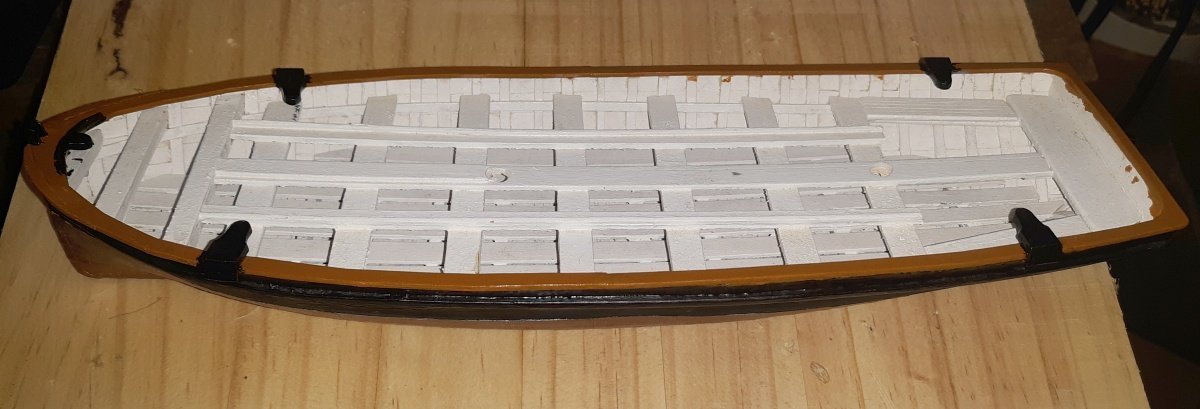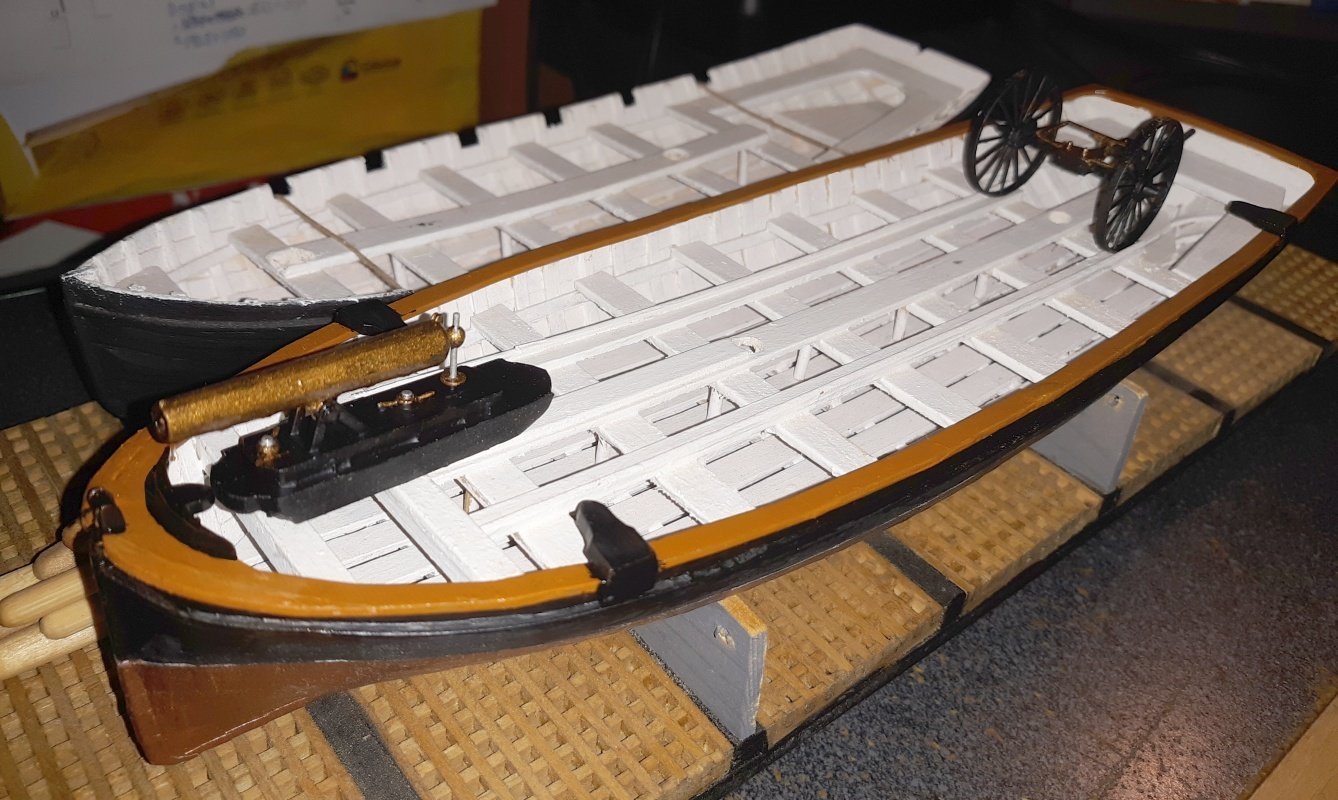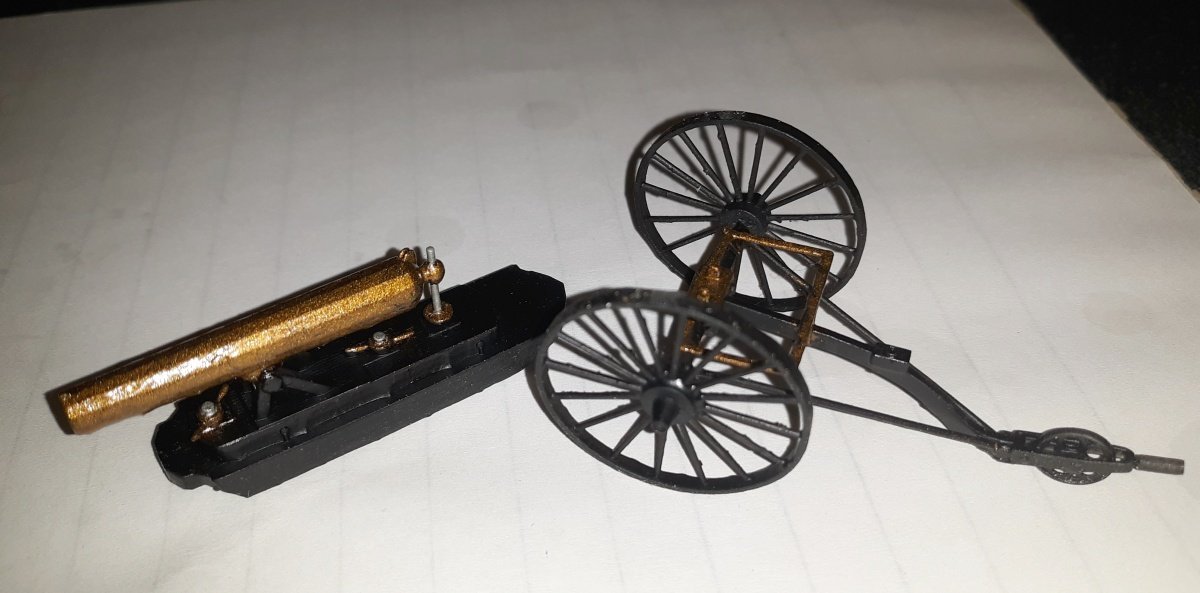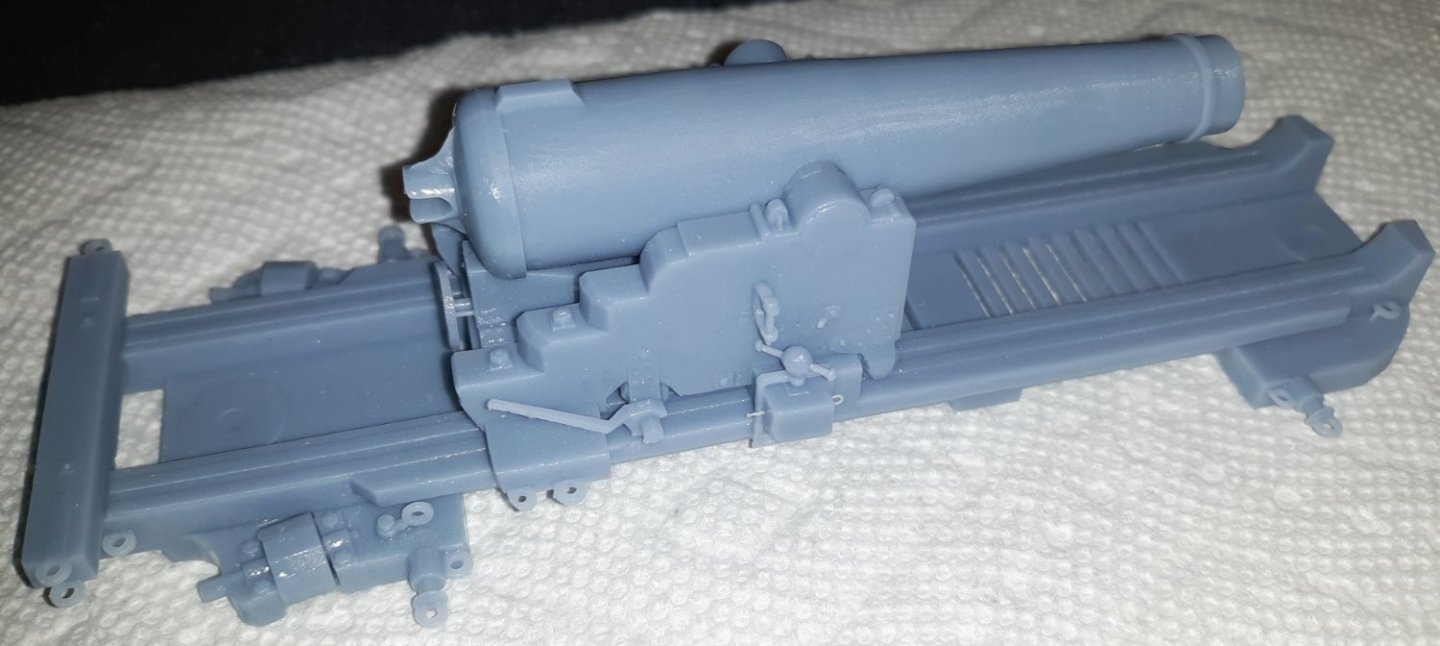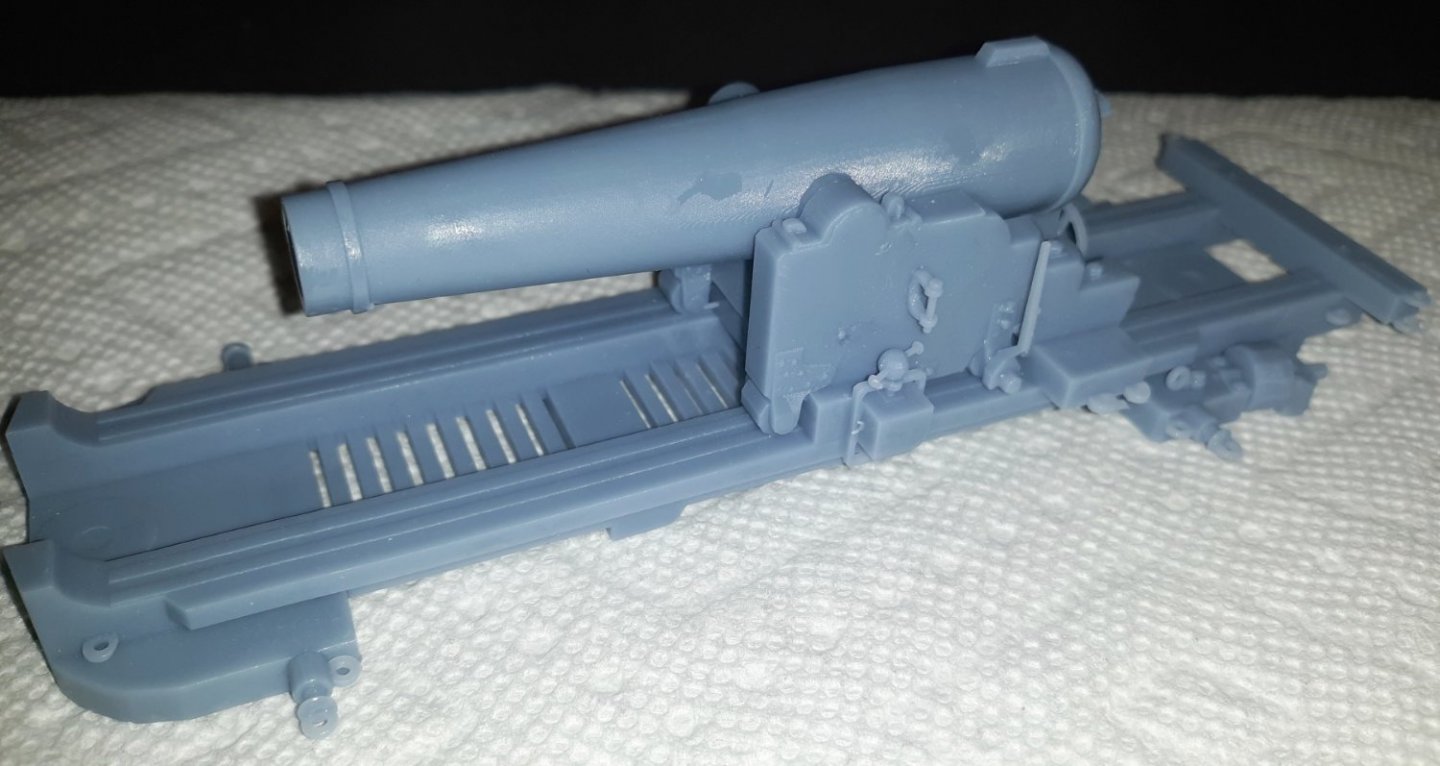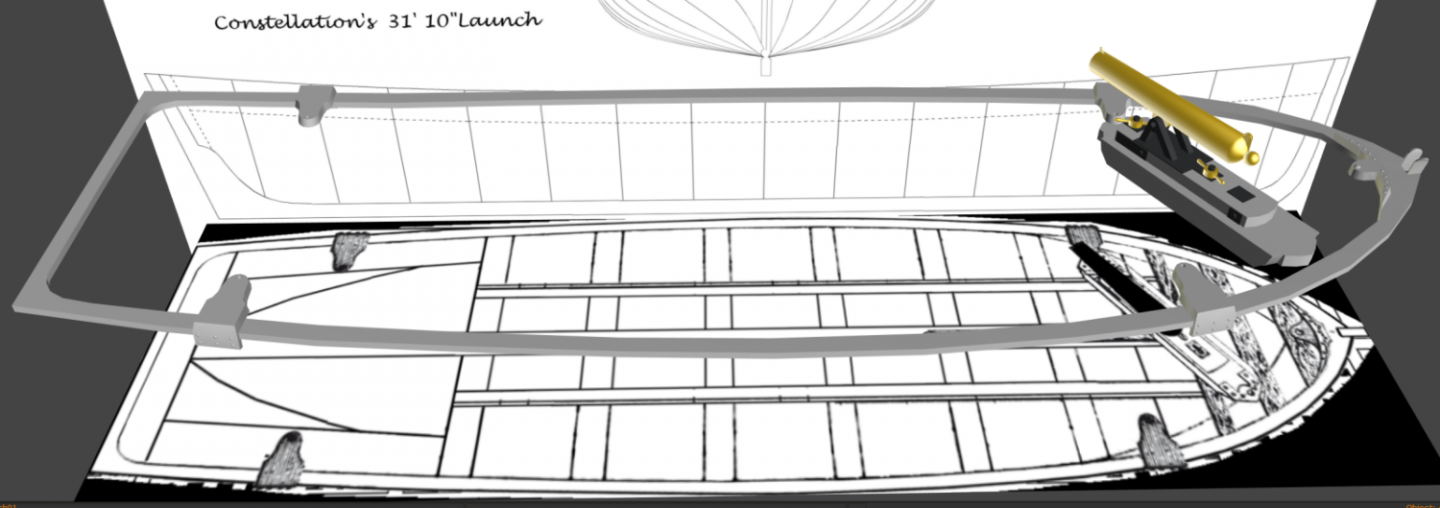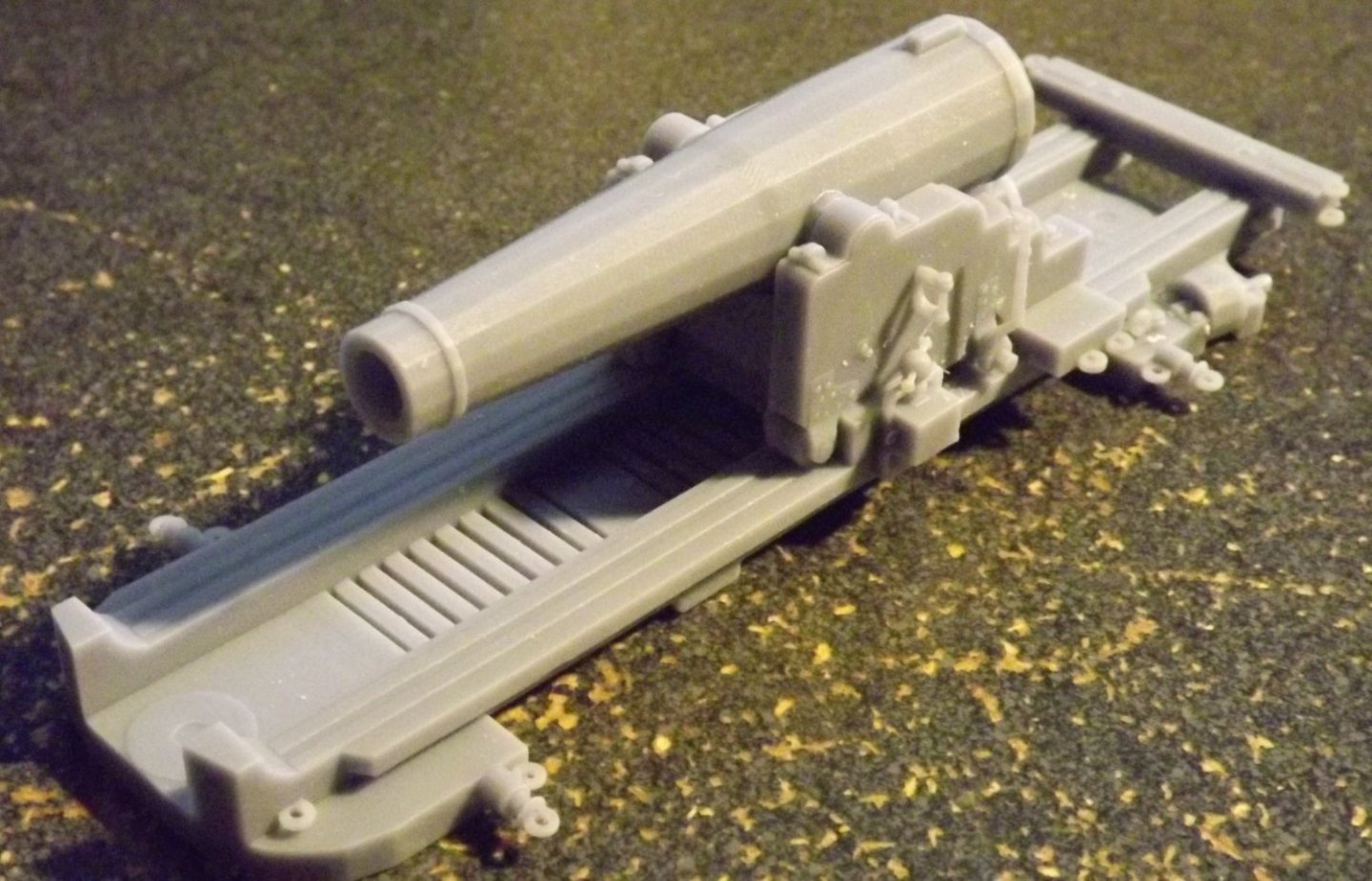-
Posts
788 -
Joined
-
Last visited
Content Type
Profiles
Forums
Gallery
Events
Everything posted by JerryTodd
-
In this image? That's a a cutter that probably 60-90 foot on deck. The launch was only 32 feet and two masted with a sprit-schooner or sprit-ketch rig. DeSimone had a lot of experience with ships, and their appearance, and while including a lot of detail, left out a lot as well. I imagine he did a sketch, maybe a quick painting to get the tones right, then went home and filled in the rest from memory and experience. In the 1856 painting there are no lower deadeyes on the topmast shrouds, or any at all on the off starboard side. The bowsprit, spencer masts, gaffs, and booms, seem to cycle between bare wood, black, and white and it's hard to say if they were repainted, or the artists just made it up. In a diary it says the ship was painted while in Naples and the captain had the ship painted all black with no gun stripe. She went on a patrol of the Med and the gunstripe was repainted when she returned to Naples. So, it's possible the spars actually were different colors every time DeSimone saw the ship. If you look back in this thread a ways, you'll see the signal flag issue regarding the signal flown at the mizzen truck in the 1856 painting. I still cannot find those flags in any signal system. Another painting that's incorrectly IDed online as another ship (I forget which now) but is certainly Constellation pre-1860 and shares odd details with the 1856 painting, like the missing topmast shroud deadeyes. An all the gaffs and booms are white. One of her boats, probably the port side quarter boat or second cutter, is approaching from the bottom of the painting. I've never found color versions of this or the painting above so far. This drawing of the ship in 1864 by DeSimone at Naples, I just found at the Mariner's Museum in Newport News Virginia. It has a lot of interesting details shown, and omitted, for instance she has the wrong number of gunports. Some of her boats are shown, but as you pointed out, they don't really get much attention. One image I'm still searching for was a photo taken from a hill on St Helena that's mentioned in a diary. That would probably be the first, and earliest photograph of the ship ever taken.
- 524 replies
-
- sloop of war
- constellation
-
(and 3 more)
Tagged with:
-
I painted the pivot guns, but the photos show more touch-up is needed to be finished. I need them painted before I attach them to the hatches they sit on, then they can be rigged with their tackles and what-not. With the intent to get the yards fully rigged with foot-ropes, blocks and the like, I've been thinking how I want to handle the stirrups. In reality, the stirrups are a line with an eye on each end a little over 3 feet long. One eye is seized to the jackstay and the stirrup hangs over the bank of the yard. The foot rope passes through the bottom eyes. I'm still looking to see if is was Navy policy to seize the foot-rope to the stirrup or not. In photos of the ship where they can be seen, she's already a training ship and the foot ropes have a knot on either side of the stirrup eye. Since I have 56 stirrups to make for the 12 yards, I'm thinking of just making then from wire as show in the picture, blackened or painted, of course. I did one to see if I liked it, and was about to go to work making them when I realized I bought all this .020 brass to make the dead-eye strops, so I switched gears and started looking at chainplates again. I cleaned up the work area a bit, and took the rest of the jury-rigging off the hull, like eyes for the temporary stays, and some of the chain-plates that were screwed on. I started cleaning up the chainplates sets I had made so far, finished the ones that were nearly done, and fix some soldier joints. I remember trying to decide whether to uses a #1 bolt and nut to attached the dead-eye to the chain-plate or peen an escutcheon pin (brass nail) to do the job. The nuts and bolts would be expensive, especially right now with inflation the way it is, so I'm going with the escutcheon pins. They're a bit hard and peening them is difficult, so I annealed one to see it that worked better, and it did. Next I started working on some jigs to shape the strops, links, and the strap between the dead-eye and the link. I also gave one set a coat of primer for the picture. In all there's about 26 pairs to make almost all a little different as the link gets longer with each set going aft because of the angle of the shroud. That means each pair has to be assigned it's position on the hull as they're all basically different lengths. The upper deadeyes have the same sort of strop and each shroud gets a thimbled eye with a pin holding them together. I plan to 3D print the tear-drop shaped thimbles, and use the same peened pins to attach the strops, but I have a feeling actually doing all that is going to be very complicated and needing of more hands than I possess. I thing peening the strop to the thimble, then seizing the shroud around the thimble with the upper dead-eye held by a measured bracket so all the upper deadeyes are consistently spaced is probably the easiest way to deal with it. We'll see when I get that far.
- 524 replies
-
- sloop of war
- constellation
-
(and 3 more)
Tagged with:
-
Just an FYI, so you don't have to dig back 30 posts or so... The red thing in the video is the arm on the servo, which is part of the radio-control system. It has 3 cleats on it, The white lines going into a hole in the end at the "bottom" of the arm are connected to the tiller on the rudder, which appears briefly at the bottom of the video. These lines run back to the two cleats at the "top" of the arm. Using cleats allows for relatively easy adjustment of the line. The cleat in the center or the servo arm, closer to the "bottom" is for the line that moves the wheel. Basically, the wheel is not directly connected to the rudder/tiller but the rudder and the wheel are connected to the servo. Anyone that doesn't get that explanation, say something and I'll try again.
- 524 replies
-
- sloop of war
- constellation
-
(and 3 more)
Tagged with:
-
I'm no contortionist, but I finally managed to retrofit tiller ropes to the wheel so it moves with the rudder. The lines that connect the tiller to the servo run through cup-hooks mounted in wood blocks epoxied to the inside of the hull. Another eye with a brass pulley will get mounted in the block for the lines from the wheel. Right now they're sharing cup-hooks with the servo lines. The video is taken from astern through the aft access hatch. con20220609b.mp4
- 524 replies
-
- sloop of war
- constellation
-
(and 3 more)
Tagged with:
-
Printed some gratings and placed them in the companionway hatches at the capstan. Printed some gunport eyebrows and installed them on the portside. The hammocks are all glued down, so the hull was turned to work on the starboard side. ...and the old eyebrows I started installing were removed along with the balsa that capped the bulwarks. The new eyebrows got installed and a coat of paint. The brass square stock came in, so the out-board stuns'l irons got installed. Finally found paint that wasn't priced like perfume, and ordered a few jar, including Olive for the pivot guns. Loaded up the airbrush and got to work...
- 524 replies
-
- sloop of war
- constellation
-
(and 3 more)
Tagged with:
-
A couple of pieces failed to print, so I printed another batch to make up the loss and have some spare parts if needed. The stuns'l boom sits better on the yard with the adjusted fittings While those parts were printing, I started making up the top rails, which are going to require making some netting for them.
- 524 replies
-
- sloop of war
- constellation
-
(and 3 more)
Tagged with:
-
It's basically a pin sticking out of the end of the yard, and with the iron fitted, it'll have torquing pressure on it, which I don't think would survive the mildest bump. I used a bit of bamboo skewer to test fit everything, and found I needed to tweak the models a bit. I lengthened the, um, stalk? on the outboard fitting, and shortened it on the inboard one slightly. I also adjusted the thickness of the outboard iron's hoop to match the inboard one. The whole group of eight sets will take an hour and a half to print.
- 524 replies
-
- sloop of war
- constellation
-
(and 3 more)
Tagged with:
-
I modeled and printed the stuns'l boom irons, both inboard and outboard. I didn't make the inboard ones functional (hinged). Now I have to find or make some brass square stock for the ends of the yard, which is turning out to be more difficult than I thought. Hammering round into square is too uneven, so I'm gonna try grinding/filing it square next. The bitts got another coat of paint and some matt clear coat... and I started gluing down the hammocks, though the photo doesn't really show anything different. The bases will be painted black, and the hammocks the canvas color visible on the forward-most sets. Any gaps will get puttied, and the seam, inboard and outboard, will be covered with a mahoganyish wood strip. The big deal with 3D printed parts, resin ones in particular is they are created by curing resin with UV light. On a model that will be outdoors, naturally occurring UV will cure them more. making them brittle. Everything needs several coats of paint, and a UV resistant coating of clear-coat.
- 524 replies
-
- sloop of war
- constellation
-
(and 3 more)
Tagged with:
-
So, I got the COVID, and for about a week I basically had the flu and didn't feel like doing much of anything. Now I can focus and do something without dozing off, so it's back to work... The sky light wouldn't close well, so I remade it, also putting the bars in the sash instead of on it, so it looks like the photos now, and closes better. Then I found a site with a lot of Constellation images, some I'd never seen, some in better resolution than what I already had. I also found a better quality image of another deSimone painting of the ship which the site says was done in 1860. I still haven't found a color version. (remember to click the images to see them full size). They also had this pic of the ship in drydock in New York in 1904 with one of those night life buoys dangling and the other one missing. Looking through the images that showed the deck, I tried to figure out the four sets of bitts. The 1884 spar deck plan shows round ones with pins sticking out athwart-ship. In the photos before 1914 they appear to be cast-iron, painted black, and shiny. When the ship was spiffed up for the 100th anniversary of the War of 1812, it seems the iron bitts were gone or removed, and square wooden ones were put in, to look more old-timey I suppose. I have no idea what she had before the 1880s - even looking for them on other ships in Civil War photos, so I modeled the iron ones. Printed four of them and painted them, I held off gluing on the hammocks because I though I needed to install hawse-holes near these bitts, but there weren't any. In images of the ship tied to a dock or with another vessel tied along-side, the lines go to the gundeck. Also, I couldn't find any image where something is tied off to any of these bitts, iron or wood. I'm thinking they were actually more of a fairlead to turn a line so a gang could walk it down the deck, like the tops'l halyard maybe? Next up is a shot at making stuns'l yard irons. I think this resin is up to the job, and if one does get broken, it's no big deal to print another. I wish I could print the chain-plates with deadeyes and such, but I'm sure that would be asking way too much of this resin's abilities. I'm just modeling part a in the diagram. The hardware at the end of the yard will be done in brass.
- 524 replies
-
- sloop of war
- constellation
-
(and 3 more)
Tagged with:
-
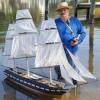
finding a R/C Napoleonic warship kit?
JerryTodd replied to Ian B's topic in RC Kits & Scratch building
Specifically, there are no "kits." Steel, Chapman, & Hutchenson (SC&H) used to manufacture large RC kits of a Baltimore Clipper, Brig, and HMS Surprise, but they closed down just before the pandemic. I'm not aware of anyone offering kits of RC square-riggers, much less Napoleonic period warships. Any such RC models you see now will have been scratch-built, or conversions of static models. The Heller Victory plastic kit is a common subject for conversion. I've converted three Revell 1:96 scale plastic kits to RC (2 Constitutions, 1 United States) myself over the years. I've seen a few wood kits converted, but they tend to be much more expensive than plastic kits for folks to want to risk them in the water. Most wood kits I've seen converted were completed, or nearly completed kits gotten cheap or free, and then retrofitted to RC. Your "signature" lists a Vanguard kit in progress. I imagine you have enough data in plans and patterns from that kit to reproduce the model again. If you want a sailing model, rather than a motorboat with sails, you can see how several folks have concocted controls for their square-rigger models here: Catalog of RC Square Riggers Also, check this out here on MSW: -
Printed the last section of hammocks today. Now they have their bases trimmed to the bulwarks and get primed, and painted. I have a couple of through-bulwark items to do before gluing these on, and I have to figure out what glue to use. I'm basically gluing plastic to wood, so I think the only real choice is epoxy. I have some slow-setting epoxy and I think mixed with some very fine sawdust from the band saw or sander will double as a filler/putty. Here's the model in the yard with the port-side hammocks sitting in place. The starboards are sitting on the deck because I have taken off the balsa on that side yet.
- 524 replies
-
- sloop of war
- constellation
-
(and 3 more)
Tagged with:
-
The part for the printer showed up and after installing the upgrade, I printed the new gun circles. Checked them for fit, and painted them. Not pictured, I drilled mounting holes in them and gave them another coat of paint. I have to clean the decks of the residue of the old deck circles, before I glue these down and then trim them to the hatches (the guns sit on access hatches in the deck fore-and-aft). Besides CAing them to the deck, I think I'll drill into the deck a little, countersink the holes I just drilled slightly, and fill each holes with a bit of epoxy. I'll probably give them a silver-black wash as well, to make them look more like iron. Fresh off the printer check for fit With some paint Gun and guy for scale Jet black just didn't look right, so I went surfing for photos of gun circles to see what they looked like; shiny, clean, rusty, etc. On active ships it looked like they kept them bright bare metal and probably greased them periodically. They looked black in some images but I think that was the shine during a sunny day, as there were sharp shadows in those photos. So I dug out the Testor's "Steel" paint and went to work, then carefully CAed them to the deck access hatches. The bow circle run off the hatch in a couple of placed, so they were trimmed to the edge of the hatch and cut-offs glued to their place on the deck, and the paint touched up. Bow circles alone, and with the gun. Stern circles alone, and with the gun. Now those parts of the deck need some more clean-up and clear coating.
- 524 replies
-
- sloop of war
- constellation
-
(and 3 more)
Tagged with:
-
Still waiting for the new LCD to get back to printing again... but doing a little 3D modeling in the meantime. As mentioned, I added the rails for the center skid plate on the pivot guns. Still cleaning up the model, but this is about it. The bow is on the right, and the stern on the left. The bow has two firing positions, the center position doesn't need rings as it's a stowed position, not a firing position.
- 524 replies
-
- sloop of war
- constellation
-
(and 3 more)
Tagged with:
-
I was going to paint the new wheel but decided instead to reuse the wooden pedestal from the previous wheel. I sawed off the attached printed pedestals, drilled the drum and reused the brass rod axle. The skylight and the wheel got painted, and the wheel now spins. I'm going back to the idea of connecting it to the rudder servo so it'll turn when the rudder moves. I modeled the hammcks so they were hollow, saving a lot of resin/money and some weight I modeled the gun circles to be cleaner versions of the hand-cut one I had. I printed them all in one go, cleaned them, drilled them (to pin them to the deck), painted them, and they look great, but I think I'm going to add to it, more like what's shown in the manual, with rails for the center skid, etc.
- 524 replies
-
- sloop of war
- constellation
-
(and 3 more)
Tagged with:
-
Looking back at this thread, I see I missed responding to your question Roger, I'm very sorry, it doesn't normally take me almost a year to catch on, then again, maybe now it does. Constellations boat lengths were; Launch: 31 ft at 1:36 scale: 10.3" 1st Cutter: 28' 7" - 9.5" 2nd Cutter: 25' 10" - 8.6" Quarter boats: 26' 6" - 8.8" Stern boat: 28' 2" - 9.4"
- 524 replies
-
- sloop of war
- constellation
-
(and 3 more)
Tagged with:
-
The LCD screen on the printed went bad and I had to get a replacement. With that done I stuck some things together to give it a test drive. I plan to put a second cat on board, and here are the one's I have to choose from (excuse the bust of Ares). The one rolled on it's back, and the stretching one with the tail in the air are the ones I'm leaning towards. I rigged up the bobstays with the new bulleyes. The crew got a base-coat of black in prep for painting them to look like, well, crew. The new skylight sashes are mostly installed. It all needs to get painted to match the rest of the skylight, and the glass installed to be considered done. I worked on the 3D model for the hammocks, but it's a little low-res and looks too faceted when printed. I'm going to model them in groups to be glued down on the bulwarks in sections of about 11cm each (that's what fits on the printer). In every image of the ship I have, she has her hammocks showing with out tarps covering them. I originally planned on modeling them from some combination of materials, making a mold, and casting them in resin so I wouldn't have to worry about them getting damp, growing moldy, leaking, causing rot, etc, on a working, sailing model. Making them in 3D though, I need to make them hollow so they don't use up so much resin. In the pic, I removed the rounded over layers of balsa on the port side. You may have noticed in previous pictures the line between the black and white of the inner bulwark was, well, sloppy; that's because I never intended the balsa cover to be permanent. So, if you'll excuse me, the thing below that looks like an electronics cooling component just came off the printer and contains 48 10 foot oars in 1:36 scale, that I have to carefully dig out of there
- 524 replies
-
- sloop of war
- constellation
-
(and 3 more)
Tagged with:
-

Can anyone identify this model/kit
JerryTodd replied to Riotvan88's topic in RC Kits & Scratch building
I love the pudding on the bow - does it do side work as a tug? -
Still printing away....new skylight panels, some more sailors who I posted about the deck on temporary bases, more oars, and some articulated studded anchor chain with a shackle- that was fun. The chain took a few tries at printing short lengths to finally get it to print with out bonding the links to each other. The crew printed this time are those I hadn't printed yet and a couple that didn't come out well the first time. All of them printed perfectly together this time. With Ivan and Igor (the unpainted officer from the kit Ivan came from, there' 19 people on the boat now I still need a couple of officers and 6-8 Marines - the Marines are being the real pain to find. I still plan to have between 30 and 40 people manning the model including some on the footropes, sliding down a backstay, doing something in the tops, and so on - it's gonna be a busy place. I always intended to have a crew working a pivot gun. There's one a single working line aft, as opposed to three sets of jib sheets forward, so I'll have the gun crew working aft. Now I'm trying to work myself up to open a couple of panels back aft The skylight's getting new panels, a little bigger with more detail. I like the cat on the capstan, I've named her Stella, though I'm thinking of a second cat chasing a rat, which means I'll need a rat. I don't know if Constellation had cats aboard, but I can't think of any sailing vessel I worked on that didn't have a cat or three
- 524 replies
-
- sloop of war
- constellation
-
(and 3 more)
Tagged with:
-
I was going to make some 3D belaying pin handles with a hollow to accept some brass rod as a shaft, but went ahead and made the pin-rails and belaying pins all in one piece. I clamped this into a jig and played with making thing off to it and pulling hard enough to break an 1/8" wood dowell, and they held. I think they'll do the job. On CGTrader I found files for some Civil War period sailors. I can edit them some in the software, and alter them after printing to get what I want. There were no Marines, though they wouldn't be right for 1855 anyway, and the officers were all armed and in "action" poses. The figures are made by Artejaol Studios and who also make a bunch of WWII and other figures and are basically meant to be "toy soldiers." I contacted the artist about maybe doing some 1850's officers and Marines, attaching reference images but if they, decide to do it, it'll be a while. Meanwhile, I can get a start on a crew with the figures I have. At least Ivan won't have to do everything by himself. Back when I started this model, Geoffrey Footner gave me a print of a image from a Harper's Weekly type magazine picturing Constellation in drydock in Charlestown (Boston) in 1859. It's the only image of her stern I've ever found and what I based the appearance of the model's stern on. While the details are highly simplified, it still shows a lot of useful information. It also shows two objects that have baffled me for years - the round objects between the stern ports in line with the stern davits. Looking at something else in Banyan's HMCSS Victoria 1855 that also pertained to Constellation, I happened on the answer to my puzzle, which also linked to Sperry's thread; What do we know about the origins of the lifebuoy? which added more data. At some point they reduced the lifebuoys to one on Constellation, shown in New York ic.1912. And other ships carried them as well. I found pics of them on British, German, French, and American naval vessels, though no pictures close enough or clear enough to see real details. My model's based mostly on the image of the Alert's. My model's very basic, but I have some feelers out to see if I can find more details, with the Mariner's Museum in Newport News, for instance. I had to beef up the parts a little in the end, as it was just too frail to print successfully, and when I finnaly got a combination of angle and supports to print, it turned out a bit too large. Re-scaled again, it's on the printer as I type this.
- 524 replies
-
- sloop of war
- constellation
-
(and 3 more)
Tagged with:
-
In anticipation of actually rigging this thing, there's a zillion little parts I'm gonna need. Bulls-eyes are a major one as are shroud fairleads. Shroud fairleads you say? Yep, fairleads lashed onto the shrouds above the pin-rails to keep various lines close to the shrouds to keep everything neat and shipshape. The the red arrows in the image below (click it for a larger view) So I got a copy of Olof Eriksen's Constitution All Sails Up and Flying which is a great book full of great research. On page 272, drawing #rig-23, "Fittings - Various" are drawings of what he calls "sizing trucks" both double and single. Looking at his drawing and the image above it's easy to see these things haven't changed much, if at all, since Constitution's time. Eriksen sized them relative to the diameter of the shrouds, so I did the same based on my shrouds being 1/8" (3mm) So I made up the two-hole version, and some bulls-eyes as well, and printed out a batch. They look a little large to me, so I resized some at 50% and started those printing. I need to model a single hole version. I'll probably need a batch of these items for Macedonian as well, so I doubt I can have too many. A couple of years back I purchased a 4 3D printed 10 spoke wheels from "Model Monkey" on Shapeways that he resized to 1:36 for me. They were very nice, but very fragile. Every time I even looked at the thing a spoke broke off. I finally gave up on repairing it and gluing on spokes, and made my own wheel and printed it. It's not quite as fine as Monkey's, but it's noticeably tougher and less worrying. Two more items I wasn't happy with how they turned out, and will get replaced with 3D printed ar the deck circles for the pivot guns, and the pin-rails to sit on those stanchions at the fore and main masts. Here's those items in the works in the modeling software.
- 524 replies
-
- sloop of war
- constellation
-
(and 3 more)
Tagged with:
-
They are "Lizzards"
-
Down-rigged the model so I could install the stuff I've been printing Boarding steps, oars for the boats, and pin rail stanchions, as well as painting some more.
- 524 replies
-
- sloop of war
- constellation
-
(and 3 more)
Tagged with:
-
Glued down the launch's rail and gave everything a preliminary coat of paint, including the boat gun, anchors, reprinted stanchions, and shells for blocks. Now I have to unrig the jury-rigged model so I can get to installing all this stuff.
- 524 replies
-
- sloop of war
- constellation
-
(and 3 more)
Tagged with:
-
While modeling the pivot point fittings for the launch's boat-howitzer, I got the idea to just model the cap rail with the fittings attached all in one piece. To fit in the printer, I had to make it in two parts. Once I prep the top of the hull, I'll glue this down and paint. I have to model stuff to go in the boats; oars, casks, maybe the gun's ammo boxes. I got a bottle of this resin, that's working so well, in "Sonic Grey" as well and printed the pivot gun with it. I redid the supports as well, and it came out nicely this time. But those facets on the barrel. I made the basic 3D model back in 2009 and just added details without updating the barrel... ...so I modeled a smoother barrel for the pivot gun and printed it. I'm done printing pivot guns for a while. The previous one I'll file to lessen those facets and these go on the boat.
- 524 replies
-
- sloop of war
- constellation
-
(and 3 more)
Tagged with:
-
I've played wargames since the 70's, have a bookshelf full of them, many of them Avalon Hill titles. Last Full Measure is based on the rules of Avalon Hill's 1977 Gettysburg.
- 524 replies
-
- sloop of war
- constellation
-
(and 3 more)
Tagged with:
About us
Modelshipworld - Advancing Ship Modeling through Research
SSL Secured
Your security is important for us so this Website is SSL-Secured
NRG Mailing Address
Nautical Research Guild
237 South Lincoln Street
Westmont IL, 60559-1917
Model Ship World ® and the MSW logo are Registered Trademarks, and belong to the Nautical Research Guild (United States Patent and Trademark Office: No. 6,929,264 & No. 6,929,274, registered Dec. 20, 2022)
Helpful Links
About the NRG
If you enjoy building ship models that are historically accurate as well as beautiful, then The Nautical Research Guild (NRG) is just right for you.
The Guild is a non-profit educational organization whose mission is to “Advance Ship Modeling Through Research”. We provide support to our members in their efforts to raise the quality of their model ships.
The Nautical Research Guild has published our world-renowned quarterly magazine, The Nautical Research Journal, since 1955. The pages of the Journal are full of articles by accomplished ship modelers who show you how they create those exquisite details on their models, and by maritime historians who show you the correct details to build. The Journal is available in both print and digital editions. Go to the NRG web site (www.thenrg.org) to download a complimentary digital copy of the Journal. The NRG also publishes plan sets, books and compilations of back issues of the Journal and the former Ships in Scale and Model Ship Builder magazines.

